Mr. Sunshine: Episode 24 (Final)
by dramallama
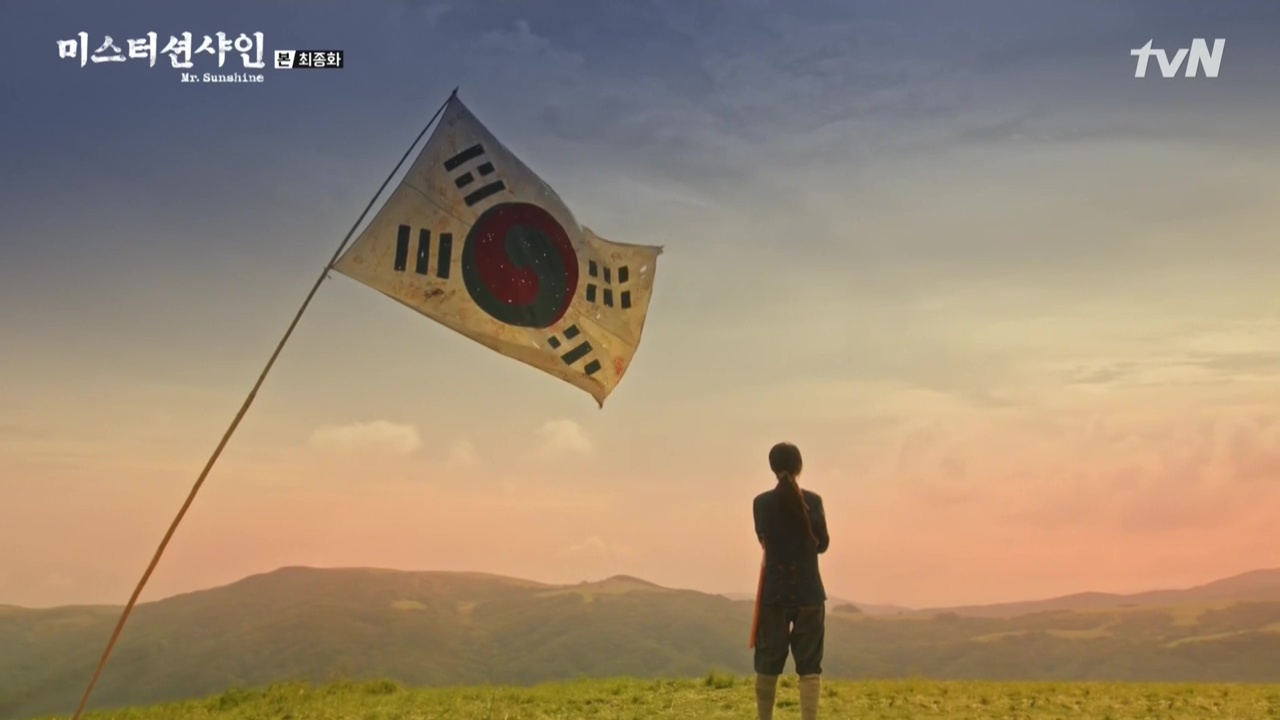
Guns, glory, sad ending — here we come! Our finale doesn’t disappoint in maximizing the potential of our cast and the remaining story. It’s incredible and quite overwhelming. The Joseon people suffer immeasurable losses in family, pride, and history, but they still persevere in their fight, believing that they will see a free Joseon. The Righteous Army invests in the future of resistance and continues to fight until the very end because history ought to and will remember their names.
EPISODE 24 RECAP
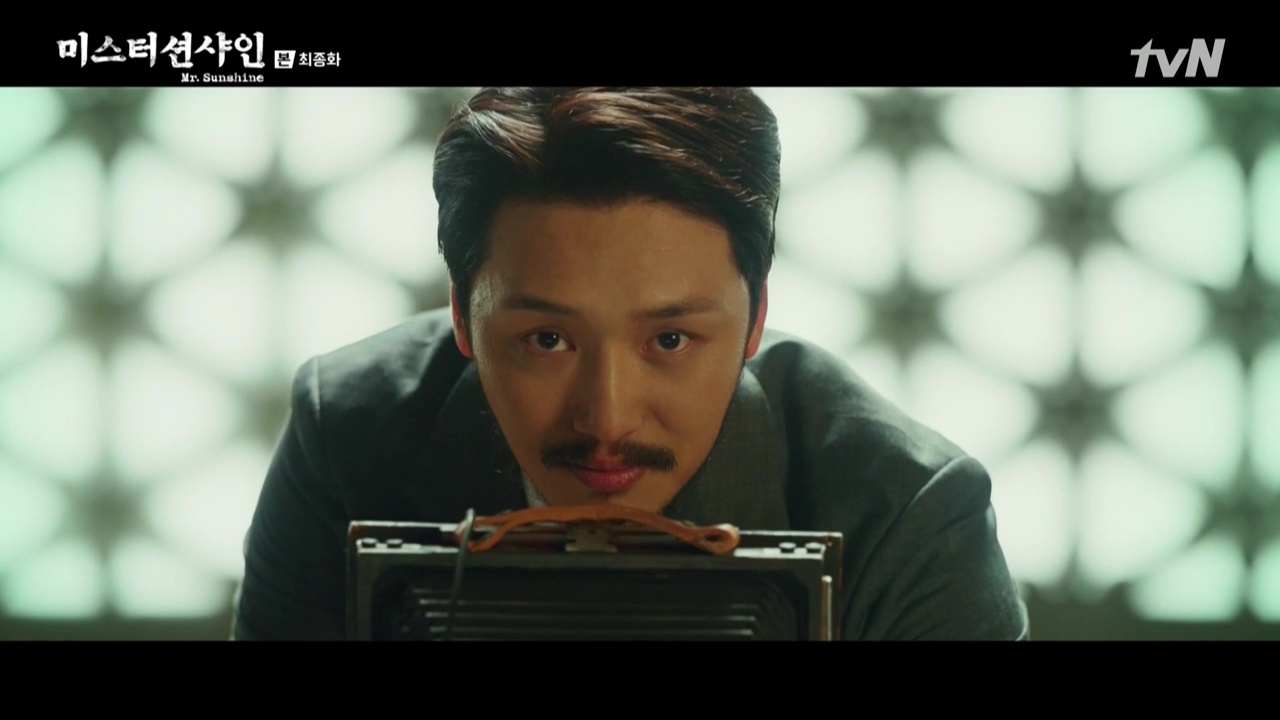
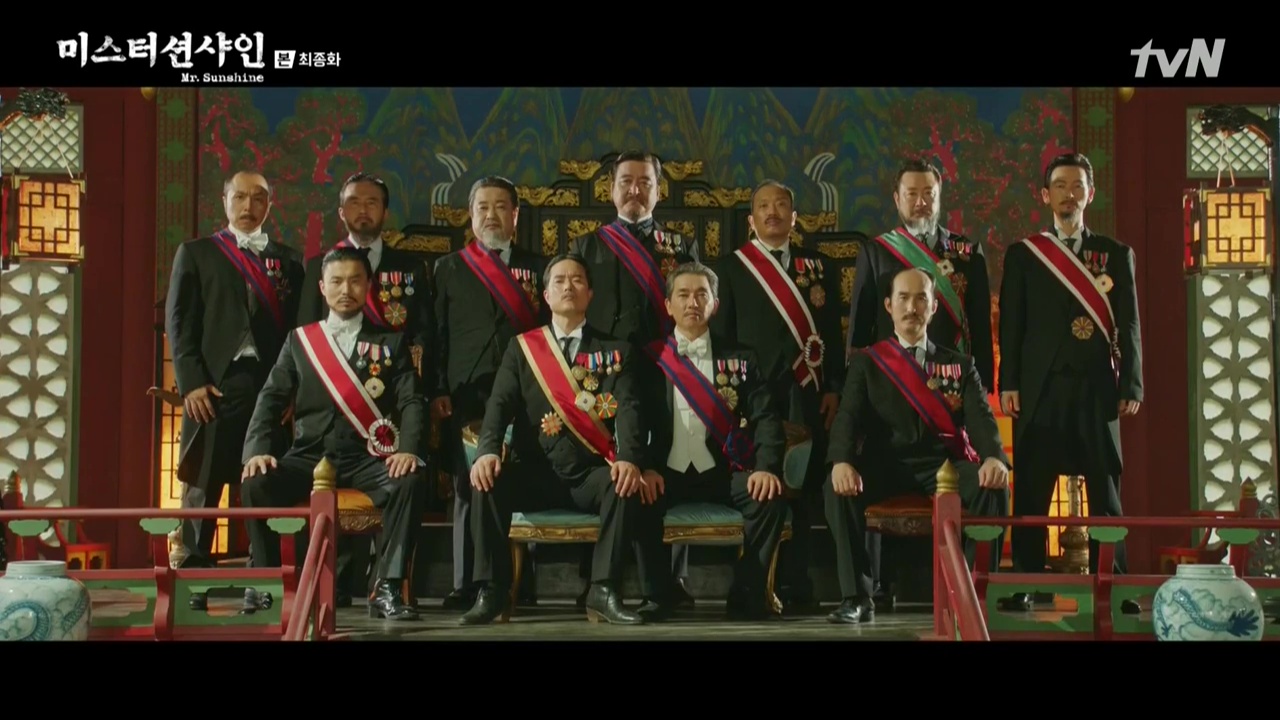
The traitor ministers line up in front of the throne for a photo taken by Hee-sung, who considers it an honor to document these ministers in history. They proudly display their badges as Hee-sung’s smile turns into a fierce glare at these unashamed traitors. He snaps photos of the ministers, each shutter release sounding like a gunshot.
A real gunshot rings, and Eugene collects the hitlist from Duk-moon’s dead body. Dong-mae enters the room, and Eugene offers to return Hwawollu, which he just reclaimed from dead Duk-moon. Then, they hear gunshots caused by the Japanese soldiers’ onslaught on Ae-shin’s servants, which Ae-shin witnesses from above in shock. When the soldiers find an empty carriage, they quickly retreat to report this news.
Suffering fatal bullet wounds, Ae-shin’s maid reaches for the servant. She can’t reach him but promises that she’ll join him soon. The soldiers report the empty carriage to their commander, who orders them to return to the scene to salvage any evidence.

When the villagers come out of hiding, they recognize Ae-shin’s servants and try to keep the maid conscious. Ae-shin rushes to hold her maid, who greets her and reveals her identity to the surrounding villagers. The maid says that she came to save Ae-shin and the Righteous Army, that she lived for the joys of watching Ae-shin grow up and will die for her as well. Then she takes her last breath.
Ae-shin wails in mourning as the Japanese forces return to the site of their murder. Dong-mae and Eugene arrive too, and the villagers hide Ae-shin under their garments and line up as a human wall against the Japanese. Commander Hasegawa orders the Joseon people to move, but they link arms and stand resolute in defense of Ae-shin and their fallen people. Dong-mae and Eugene (and I as well) stand frozen behind the crowd, moved by the sight.
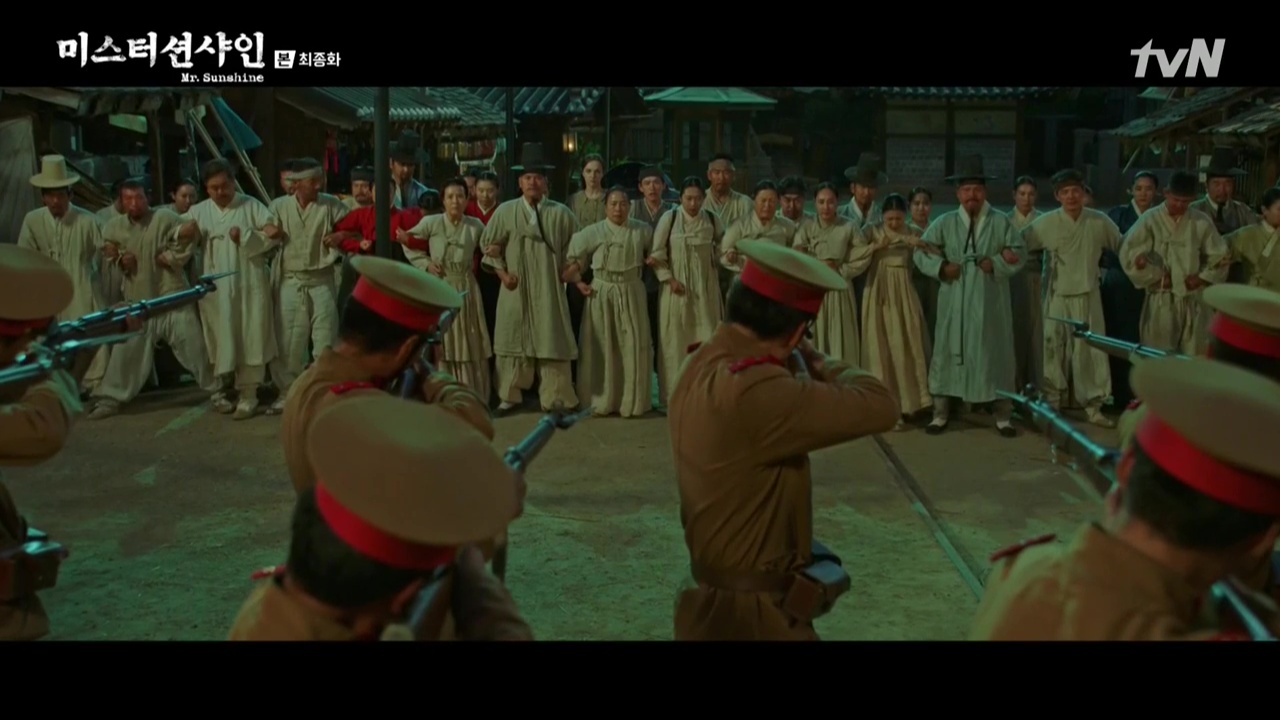
As Eugene remembers the written accounts about the Joseon people, he tells Joseph that the Joseon people have not changed. He reads the record of the Joseon people persevering against the American forces: “The enemies are still desperately fighting back, even in the face of crushing defeat. Despite being on the verge of losing, there has not been a single deserter. Even while being cornered by the overwhelming military power of our forces, the enemies keep getting back up time and time again under the battle flag of their general.”
Eugene watches them with tears welling in his eyes, as he remembers Ae-shin’s conviction to save the undercover Righteous Army geisha. She had told him that she needed to save her comrade because one day, that woman could be her. As the prophecy is fulfilled before Eugene’s eyes, he thinks, “The Joseon that the woman risked her life to protect is now protecting her.” Commander Hasegawa looks flabbergasted by the resolute Joseon people and the American teacher standing in solidarity. He lowers his gun and orders his troops to retreat, as these people will be crushed by the Japanese anyway.

As Commander Hasegawa rides away on his horse with his ensemble of troops, Eugene tells Dong-mae that he’ll need a horse, a privilege only granted to Japanese soldiers. They approach two soldiers on horseback and each claim a soldier to fight. Dong-mae kills his target first by throwing a knife at the soldier’s chest, and Eugene claims to have drawn his gun faster but restrained from shooting to avoid attention. Ha, I missed these two being petty.
Eugene offers to escort Ae-shin back to the hideout, but she refuses to put Eugene in danger. She didn’t expect the death of her servants in her resistance journey, and she wants Eugene to remain safe as an American. Eugene warns her to prepare for anyone’s death, since this is a war. He assures her that her servants will be buried with the help of the other villagers and urges her to head to the meeting spot.
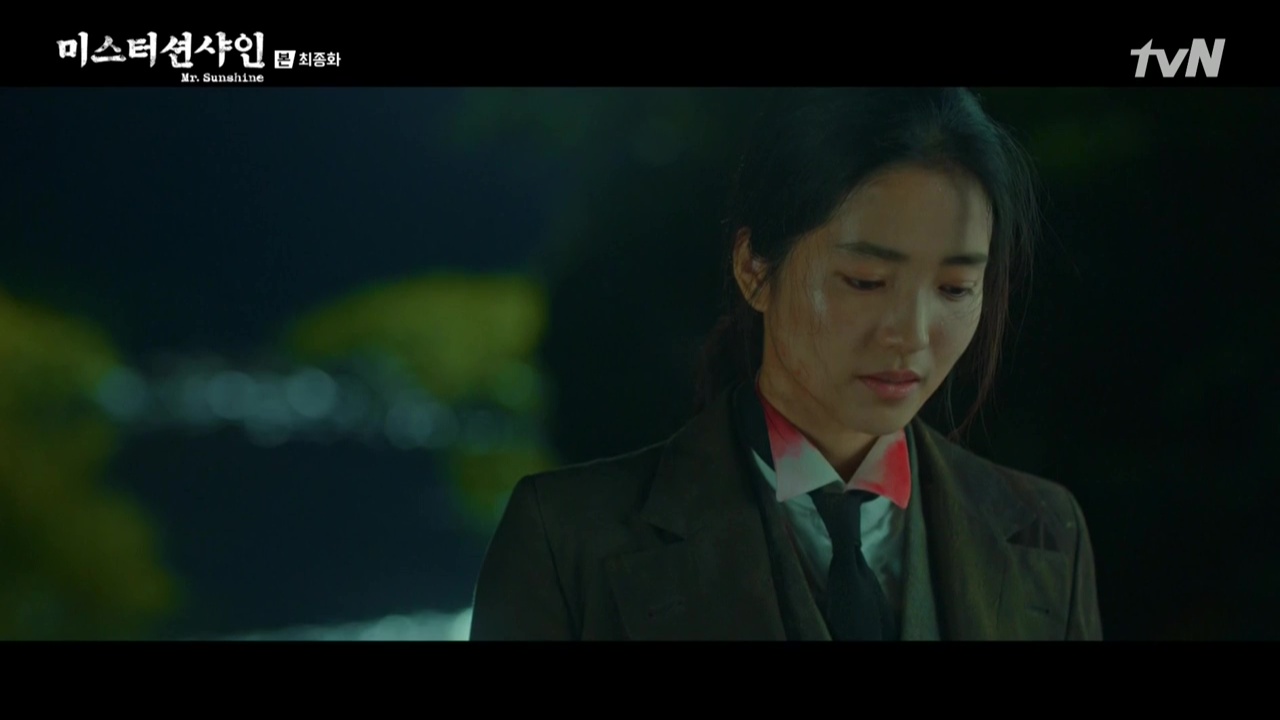
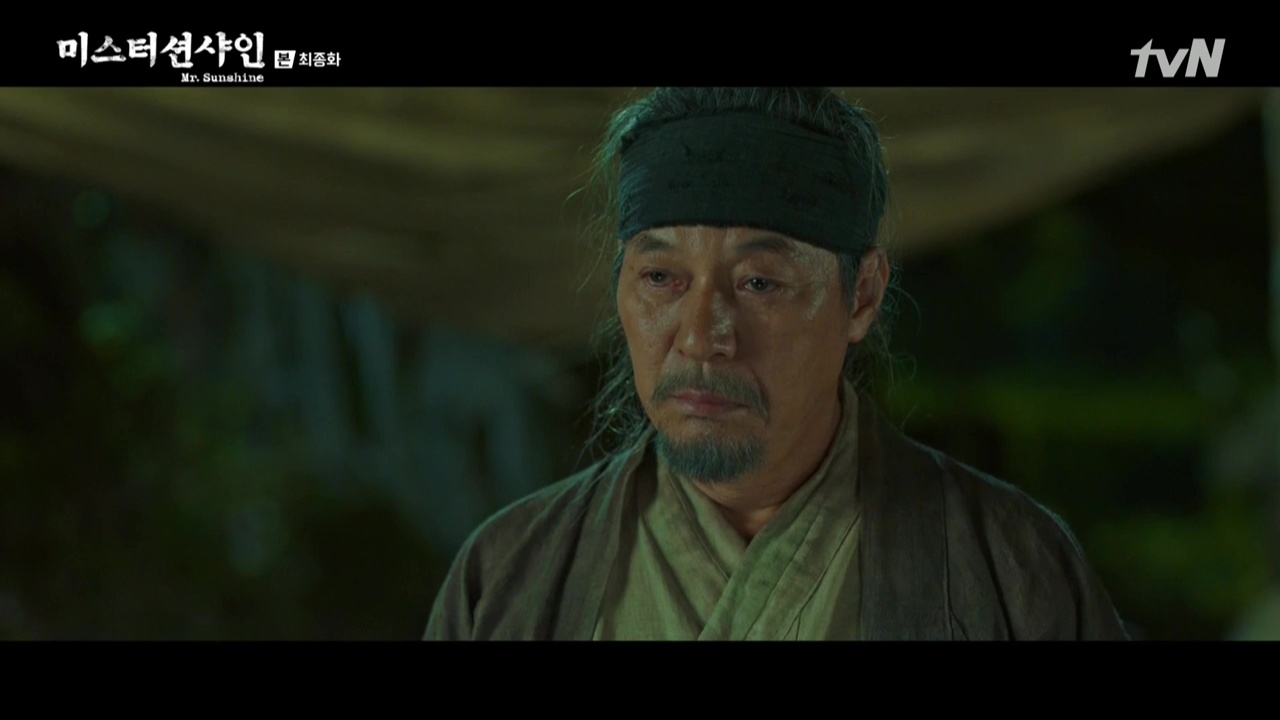
At the new Righteous Army basecamp, comrades distribute handfuls of raw barley to eat, as smoke from fire will reveal their location. A jaded comrade complains that their suffering won’t make an immediate impact, and the younger rickshaw runner insists that they can remain persistent. Another comrade points to the children playing in the water as a reminder that they’re living, not just enduring.
They hear a sound of horse hooves and see that Ae-shin has returned. She reports the successful completion of her mission as well as the death of her comrades, whose mission to protect their fellow comrades’ escape was also a success. Eun-san comforts Ae-shin with the reminder that their sacrifice protected the young children, and it’s now their duty to protect them.
Eugene burns the servant’s and maid’s belongings, wishing them to a good place. He also throws his mother’s wooden hair ornament and asks them to deliver it to his mother if they meet her there. Dong-mae sits in his hideout smoking opium, counting down the days until he meets Ae-shin: D-5.

Hee-sung prints the news of the assassination of innocent Joseon people and the relentless attacks by the Japanese. In the newspaper, he encourages the Joseon people to face these fears as they continue into the storm. Hee-sung’s worker (Ae-shin’s language school friend), Reporter Yoon, worries about the distribution of their paper, since the Japanese are becoming stricter with their newspaper policy, even threatening to deport an English reporter.
Hee-sung embraces these threats as consequences of telling the truth and assures Reporter Yoon that he purposely left his newspaper nameless so that he couldn’t be traced. He commends his own foresight, and his reporter laments Hee-sung’s optimism at a time like this. She assures him that she’ll take care of the newspaper distribution, and Hee-sung says that he picked a great worker while the worker jokes that she picked the wrong job.
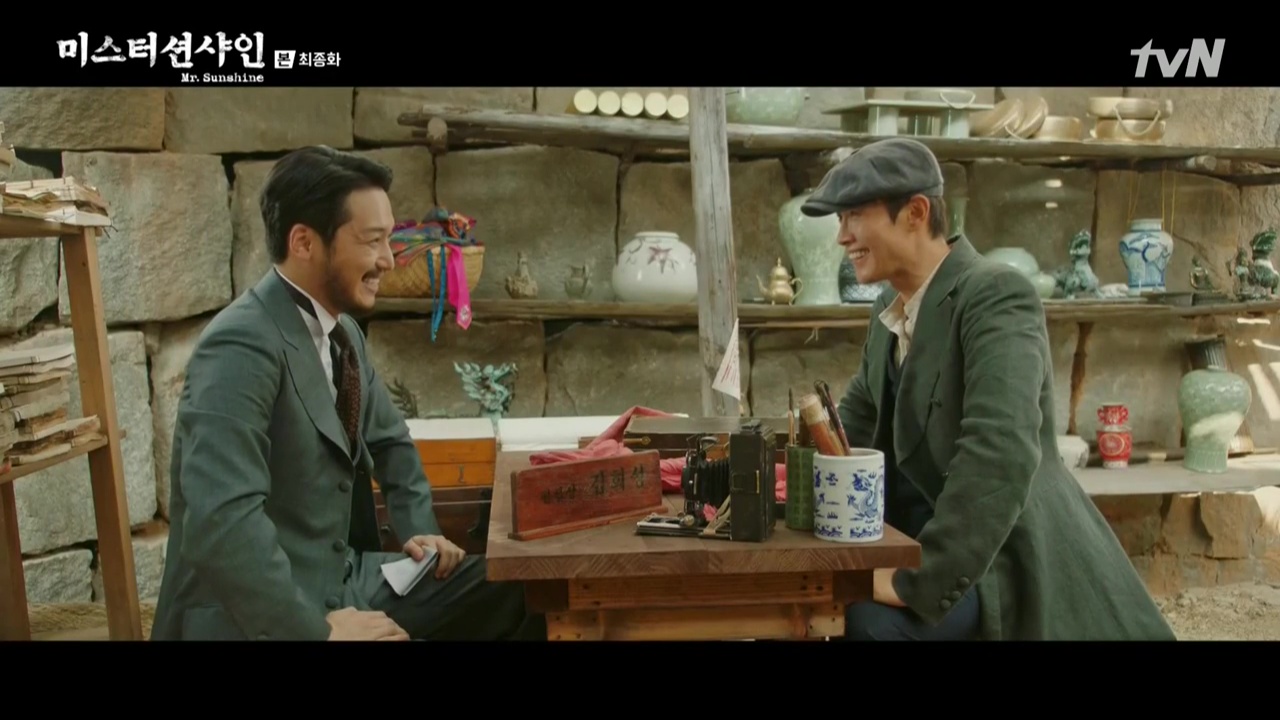
As Hee-sung packs up his printing press, Eugene enters the pawnshop, to Hee-sung’s delight. He’s come to retrieve the item that he left with Hee-sung — the Joseon flag that the emperor gifted him — and Hee-sung jokes that he couldn’t sell his country because of that flag. Eugene asks about the pawnshop duo, and Hee-sung explains that they’re away because of their aid in blowing up the hotel.
As payment for the camera that Eugene sent to Hee-sung, Eugene hands over the list of Righteous Army members, as it could be a hitlist in the hands of the Japanese but a record in the hands of Hee-sung. Eugene warns Hee-sung that this hitlist is worth a lot of money, and Hee-sung offers to buy drinks for trusting him with this invaluable record. They laugh that Hee-sung is finally buying drinks.
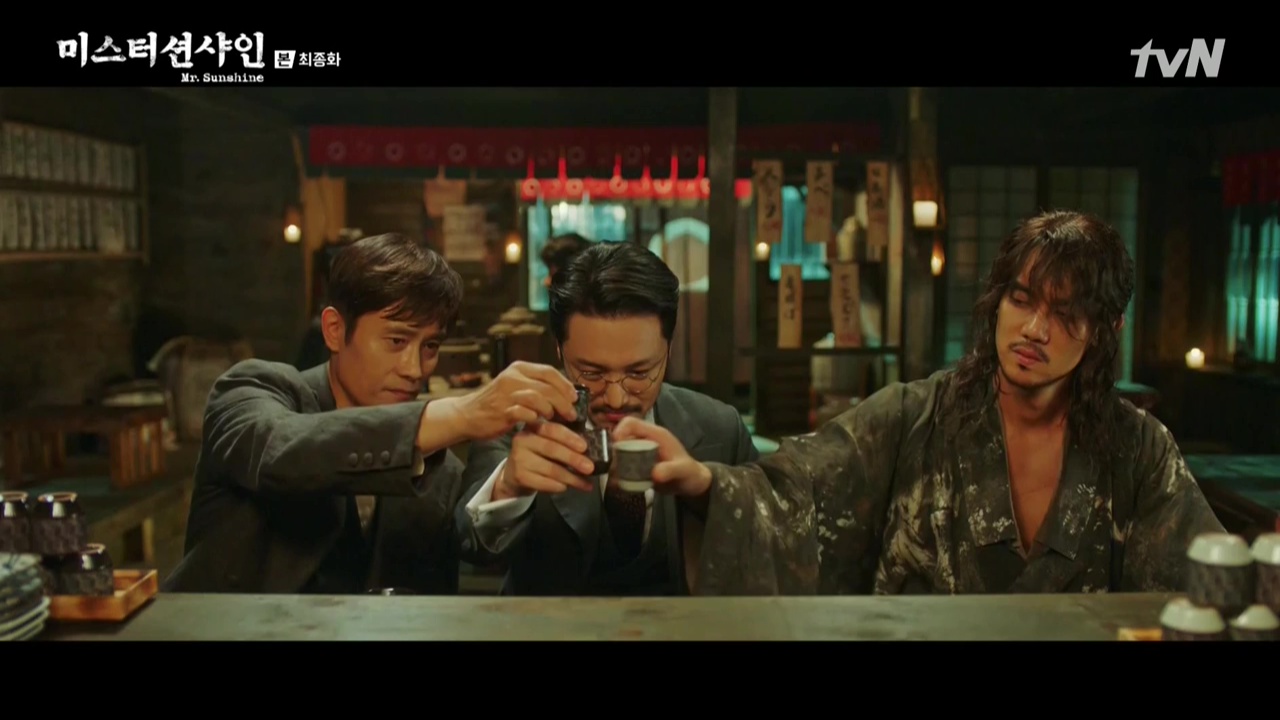
At the bar, Hee-sung notices a familiar figure and excitedly greets Dong-mae with flowery words. He orders drinks as his treat, but Dong-mae and Eugene can’t quite believe him. Hee-sung raises his glass as a toast among friends, and Eugene and Dong-mae gladly clink their glasses with Hee-sung’s glass.
Hee-sung looks surprised that they didn’t take out their gun and sword at the mention of “friends,” and he raises a toast one more time as confirmation. They all clink their glasses and happily drink as friends. As we watch the three friends drinking together, Eugene narrates: “The first words that Ae-shin learned were: gun, glory, sad ending. Although we were walking our own paths, we were all heading toward the same destination.”

Hee-sung’s newspaper extra is distributed throughout the streets, and as they watch the newspapers fall from the sky, Eugene continues, “Our paths resembled us: a newspaper written in place of a will, a broken body burning through its remaining life like opium, and a foreigner who carries the Joseon flag. Between glory and sad ending, where will our destination lie? Perhaps we didn’t know how to stop, didn’t have a reason to stop, or maybe it was patriotism because the hot summer night allowed a previously nonexistent friendship to blossom.”
Resident General Ito Hirobumi angrily throws the newspaper in his office and seethes that one line in the newspaper can move the Joseon people more than a hundred words from him. Commander Hasegawa explains that the nameless newspaper could not be tracked down. Minister Lee Wan-yong then suggests that they fight agitation with agitation by providing a large bounty for the wanted Righteous Army members, and General Hirobumi likes this idea.
The significant bounty tempts the villagers to seek out the comrades, and Eugene and Gwan-soo overhear the conversations. Gwan-soo informs Eugene that Soomi, Domi’s older sister, is in the palace after delivering a message to the emperor from Hina but wishes to join the Righteous Army. Though Eugene knows that the palace is safer, he offers to help her escape.
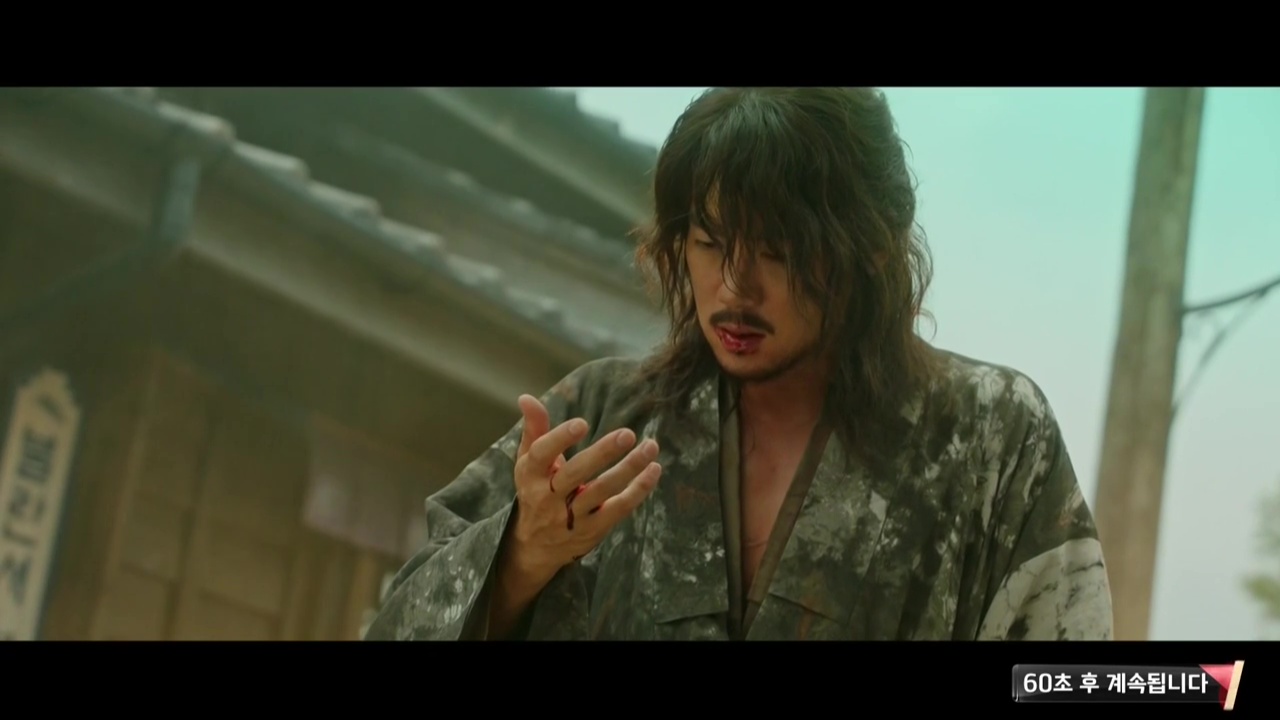
Dong-mae throws a bag of money to the baker for the candies and tells the baker to keep the change. He doesn’t need money anymore and hopes that the baker will continue to make good business. As he walks away, Dong-mae coughs up blood and collapses onto the street.
When Dong-mae wakes up, he’s in his hideout with Eugene taking care of him. Eugene says that he redressed Dong-mae’s wound and notes all the blood Dong-mae coughed up. Dong-mae asks him to turn a blind eye and says that he can’t die today even if he wanted to because it’s mid-month — time to meet Ae-shin. Eugene tells him to take care of his body, and Dong-mae sincerely wishes Eugene the same. Eugene knows that he should hate Dong-mae but admits that Dong-mae has grown on him.
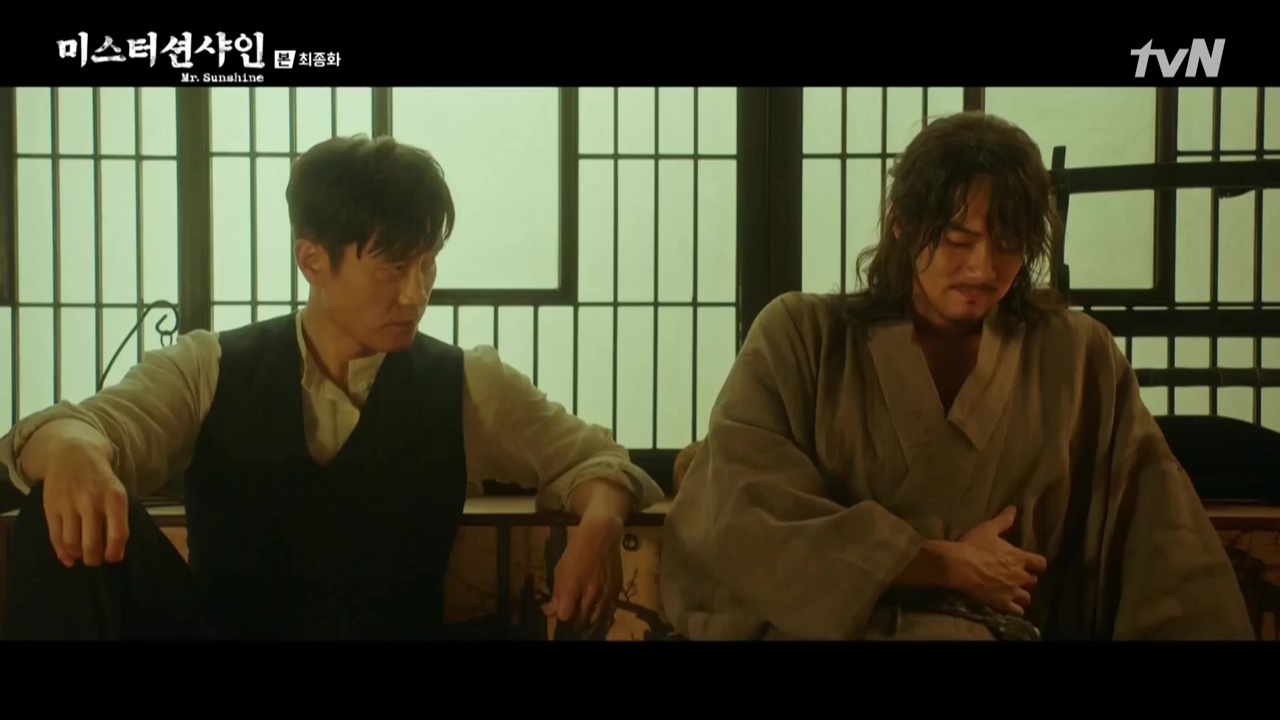
As Eugene enters Hwawollu, he’s stopped by journalist Frederick Arthur McKenzie (a real historical correspondent) from the Daily Mail newspaper asking for help to find the Righteous Army. He’s hoping to cover their story in his newspaper, and he was directed to Eugene. Initially Eugene reacts defensively, but Frederick says he was told to ask, “How’s the picnic, Eugene?” It’s from Kyle, of course, and Eugene complies with the request.
Eugene leads Frederick to the Righteous Army’s hideout, and they’re immediately surrounded by comrades. A few lower their guns once they recognize Eugene, but others remain suspicious of his guest and motivations. Eugene explains that Joseon’s struggle remains unknown and hidden to other countries as Japan continues to cover up their atrocities. He insists that sharing their story to the world will be meaningful.
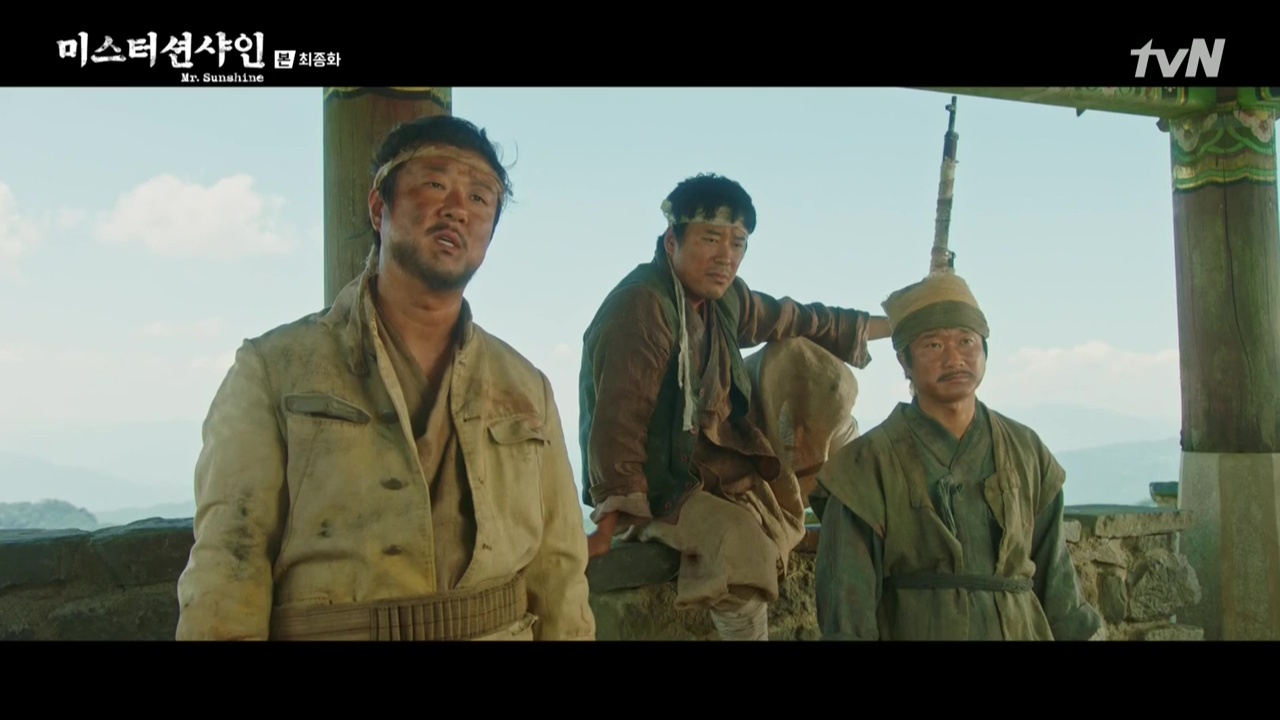
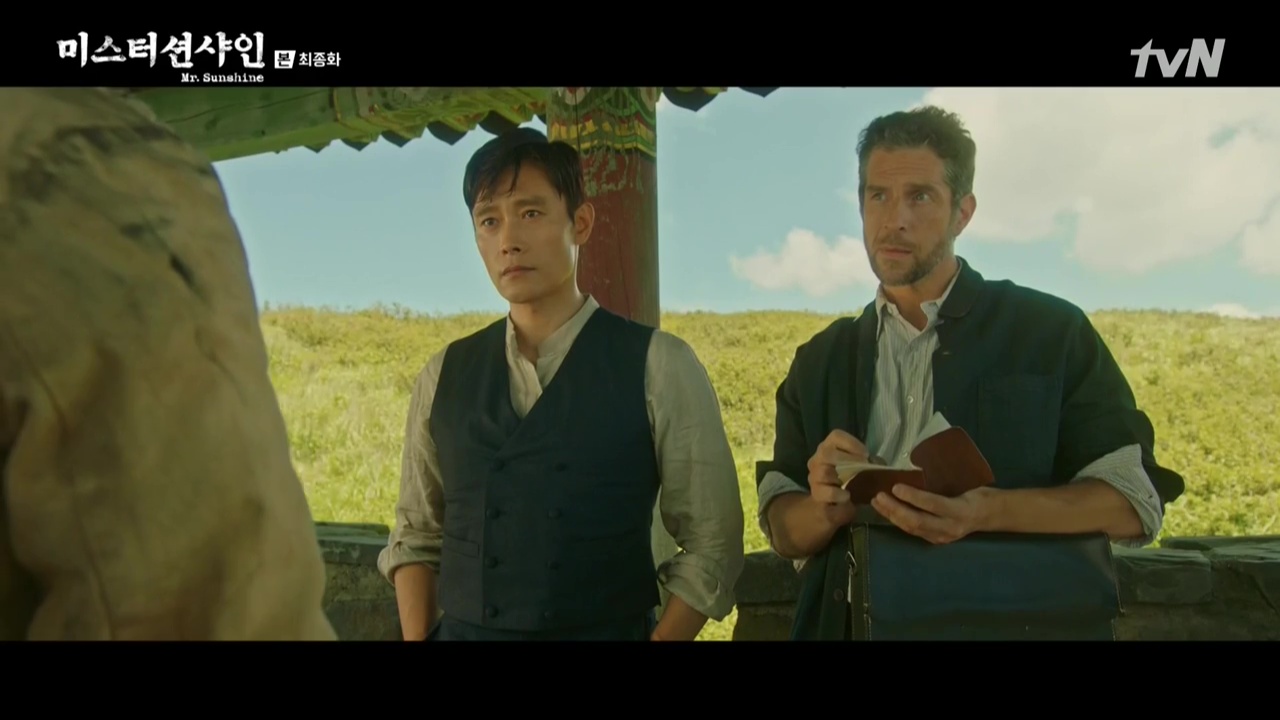
A comrade finds this storytelling meaningless and tells Eugene to fight with a gun instead, but Ae-shin takes Eugene’s side by claiming that she called for them. Even though other nations may refuse to listen, she urges her comrades to attempt to share their story about the weight of their fearless fight for Joseon’s sovereignty.
The mechanic offers to be interviewed, and he shares that the Righteous Army has incredible courage but lacks necessary supplies. Their guns are old, and they’re almost out of bullets. He knows that he’ll probably die fighting, but he’d rather die free than live as a slave. A comrade asks Frederick to procure guns for the Righteous Army, but as a journalist, he can’t help either side. Instead, he offers to take a photo of the Righteous Army, and they agree to be recorded in a photo.
Ae-shin thanks Eugene and says that she’s once again indebted to him. Eugene says that her smile already repaid that debt and adds that he’s even risked his life to return her lost shoe. He’s referring to the time that Ae-shin ran after him to say goodbye, and she asks if that was the moment he fell for her. She comments that he was late and heads off to rejoin her comrades.
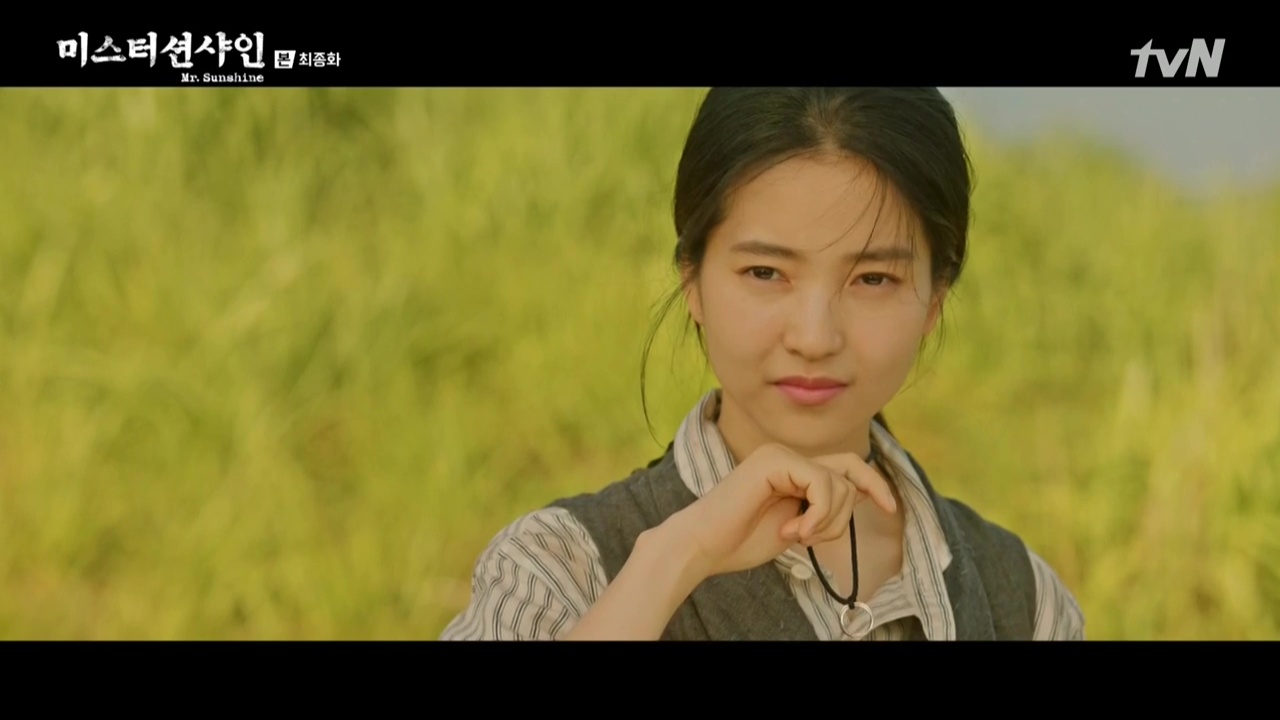
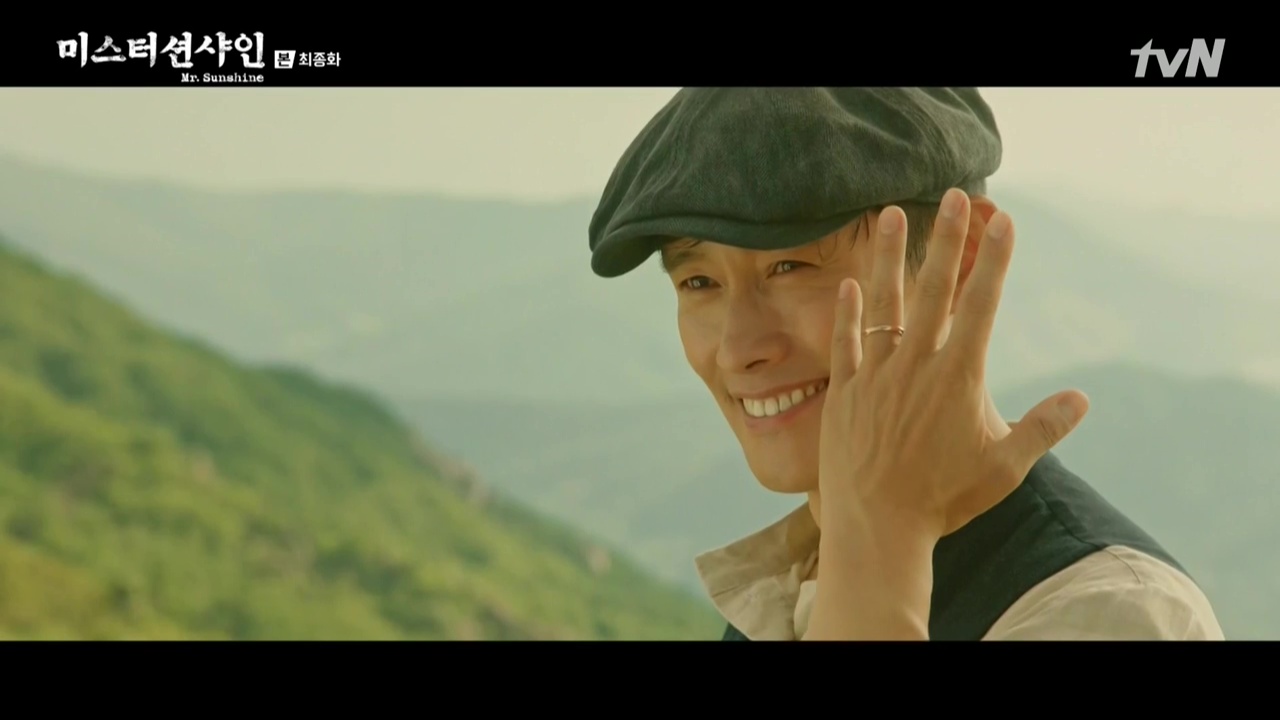
Ae-shin turns around and remembers the moment she fell for him, when they first met on the rooftop holding each other at gunpoint. She shows Eugene her ring hanging around her neck, and Eugene lifts his hand to show his ring. They smile sweetly at each other, and Ae-shin continues on her way.
Dong-mae waits for Ae-shin at the tea shop, remembering his intimate moments with her at the book shop and in Tokyo. Night falls, and the tea shop owner approaches Dong-mae not for closing but for a guest. The guest offers a coin on the table, and Dong-mae looks up to find Ae-shin. He didn’t expect her to come, since she didn’t show up on their promised mid-month schedule, and he expresses relief that he could see her on his last day.
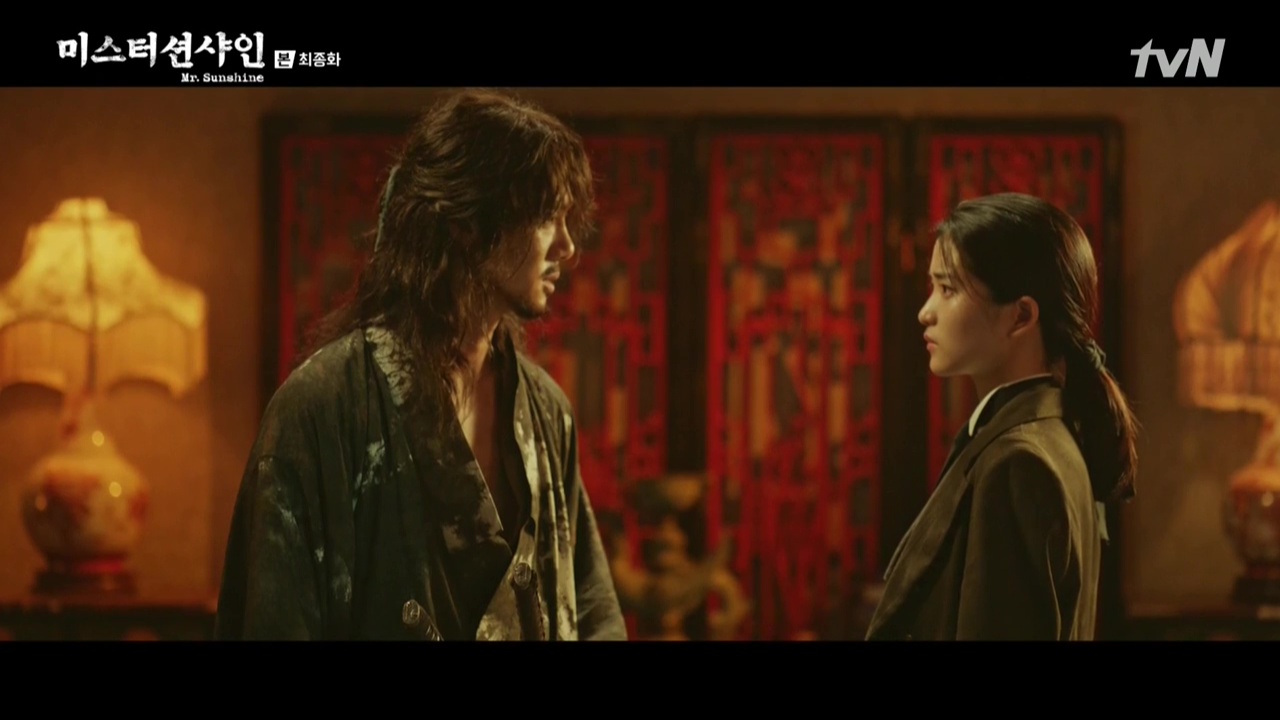
Dong-mae tells Ae-shin that she’s completed her repayment and doesn’t need to see him anymore. Ae-shin asks if he’s leaving and offers to help, and Dong-mae asks if she’s offering her carriage to save him again. He declines her help this time, as his end was predetermined the moment he joined the Musin Society. He knows that riding the carriage will put Ae-shin in danger, so he insists that he will endure the threat alone. He tells Ae-shin to fly as she did and walks away.
Before Dong-mae leaves, Ae-shin admits that his scathing insult of her as a noblewoman spoiled in luxuries haunted her. Dong-mae seems to resonate with that sentiment, and he continues on his way without turning back.
Joon-young trains the Righteous Army comrades to shoot guns, and the tailor asks why they have two people to one gun. Joon-young explains that they don’t have enough guns, so the second person must pick up the gun and continue to fight if the first person dies. The tailor freezes at the harsh reality of their fight.
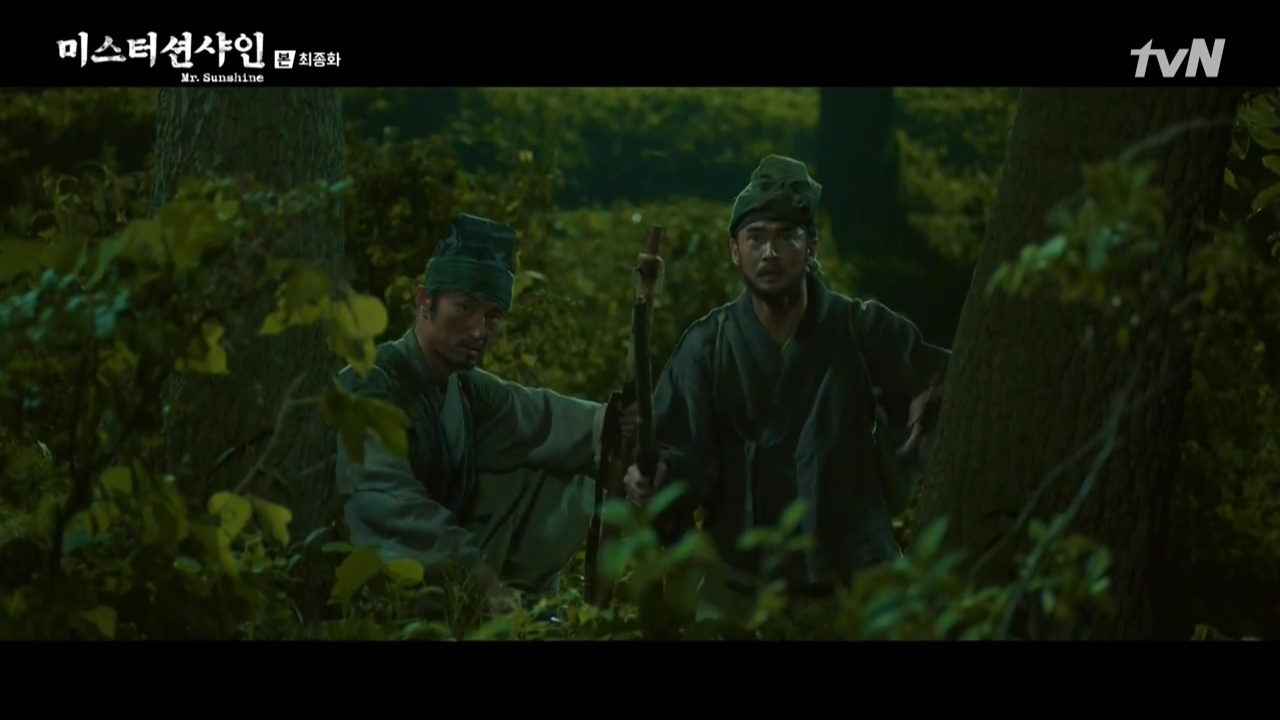
The pawnshop duo delivers funds and a letter to Eun-san as the jaded comrade sneakily watches the exchange. That night, the jaded comrade carefully steals the letter from sleeping Eun-san and runs away to read its contents. The letter reads: “In the name of 20 million compatriots, we must punish the traitor.” The jaded comrade has been caught red-handed by the pawnshop duo, and Choon-shik kills him with a slice of a sword.
The sound of horse hooves approaches from behind, and the pawnshop duo quickly hides from the Japanese forces, who discover the traitor’s dead body. Choon-shik suggests that they run away, but Il-shik says that a gunshot must alarm the Righteous Army to escape. Choon-shik points out that gunshots will ring even if they run away. Point well taken, Il-shik and Choon-shik grab the attention of the Japanese soldiers and run for their lives in the opposite direction of the Righteous Army hideout. The gunshots wake the Righteous Army, and they quickly prepare their escape.
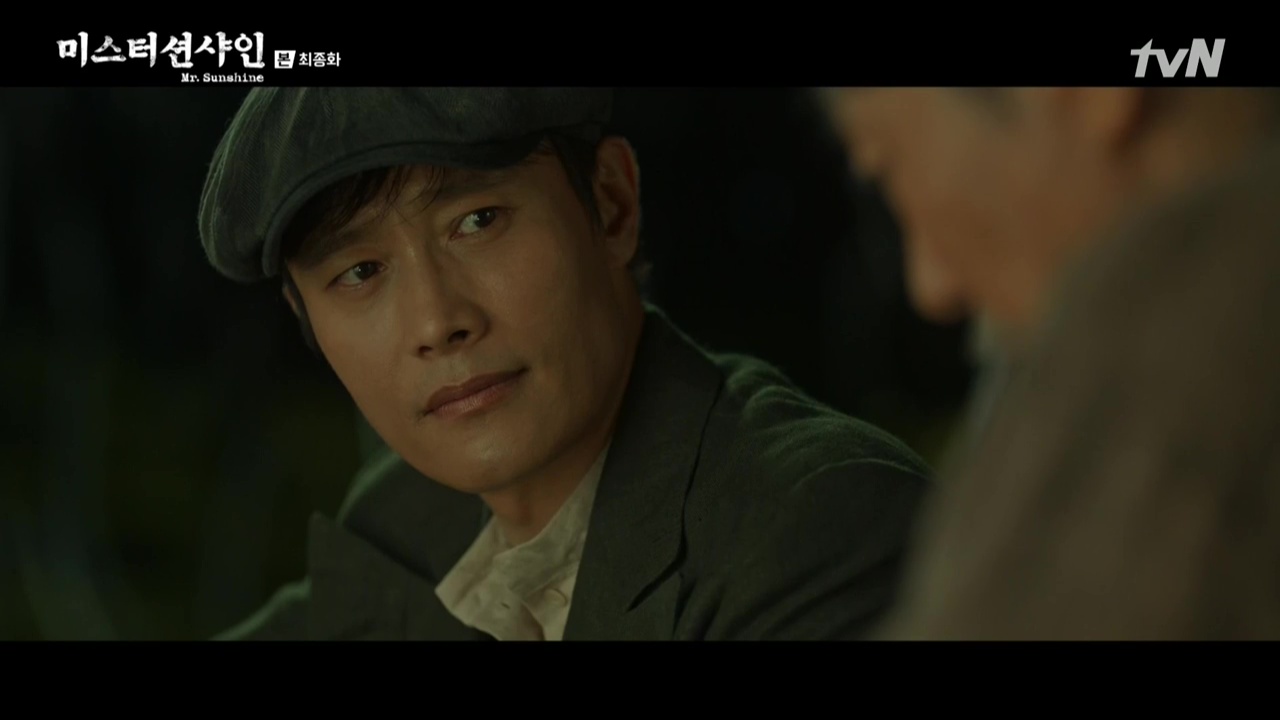
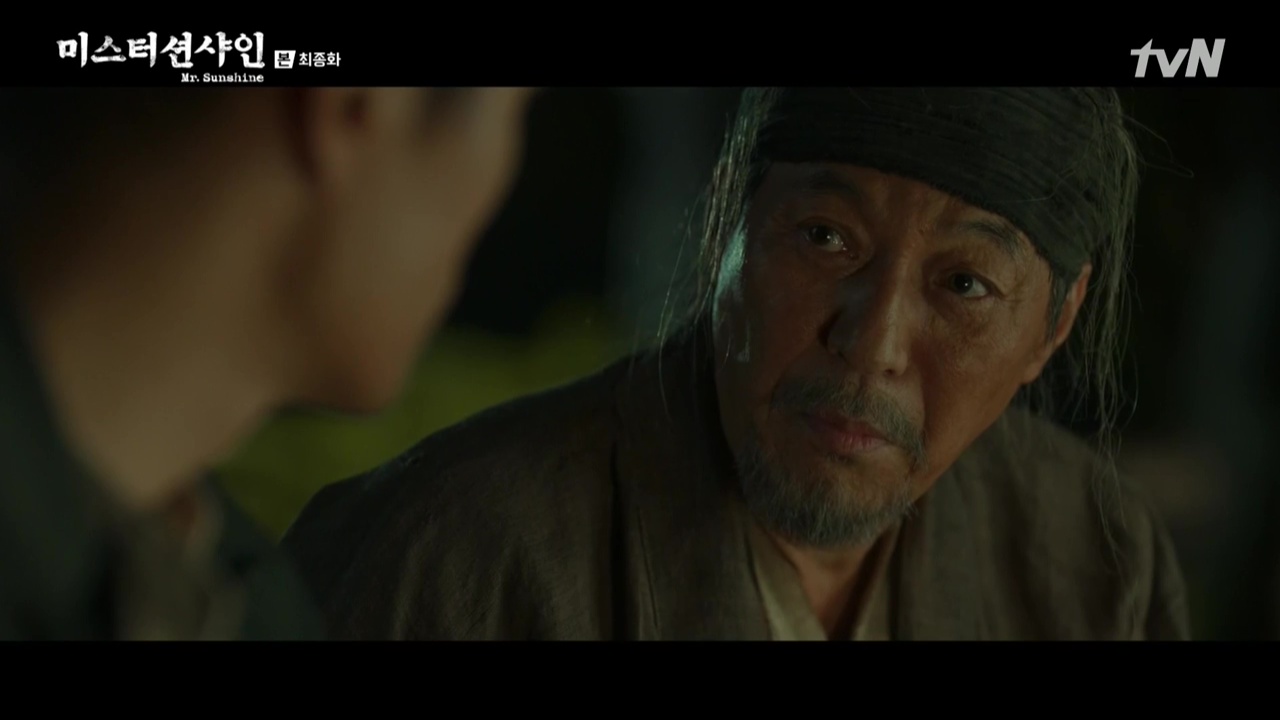
Eun-san meets with Eugene and informs him that the Righteous Army has moved their hideout again. The bounty and increasing pressure has forced Eun-san to request a favor. He hands Eugene a bundle of funds gathered from comrades around the country — notably Hina and Hee-sung’s mother — and asks him to buy twelve train tickets to Pyeongyang, since he’ll attract less attention as an American. He explains that these tickets are for those who must carry on the future of Joseon: children, women, youth, and Ae-shin.
Dong-mae waits at the port with his swords prepared in both hands. As expected, the Musin warriors arrive and appreciate Dong-mae’s convenient greeting. Dong-mae comments that they were one day late and wonders if it was the heavens or maybe Yang-hwa (Hina) that helped delay the ships. Dong-mae prepares to accept his death, but the Musin warriors have a surprise for him. They drag the limp body of Yujo and taunt Dong-mae about how his right-hand man was searching for him in Japan.

Dong-mae’s eyes sharpen as he reminds himself that he can still cut anyone. With that, he runs into an outnumbered battle, skillfully killing his enemies but also suffering fatal piercings. Covered in blood and out of breath, Dong-mae fights to kill one more warrior, and then, a sword cuts through his chest. As he coughs up blood, Dong-mae falls to the ground and looks up at the sky.
Dong-mae smiles as he remembers Ae-shin and her confession that his insult haunted her. He says, “Alas, I am a bad guy. I hoped she forgot those harsh words, but when she admitted that those words hurt her, I was content that I possessed one moment in Ae-shin’s life.” Then, Dong-mae closes his eyes and concludes his battle.
The Musin warriors drag Dong-mae by his wrists and head off to destroy Joseon. As they drag Dong-mae’s dead body, we see the reflection of Dong-mae and his gang walking into the opposite direction. Dong-mae’s gang fades away, and the phantom Dong-mae gives his dead counterpart one last look before disappearing.
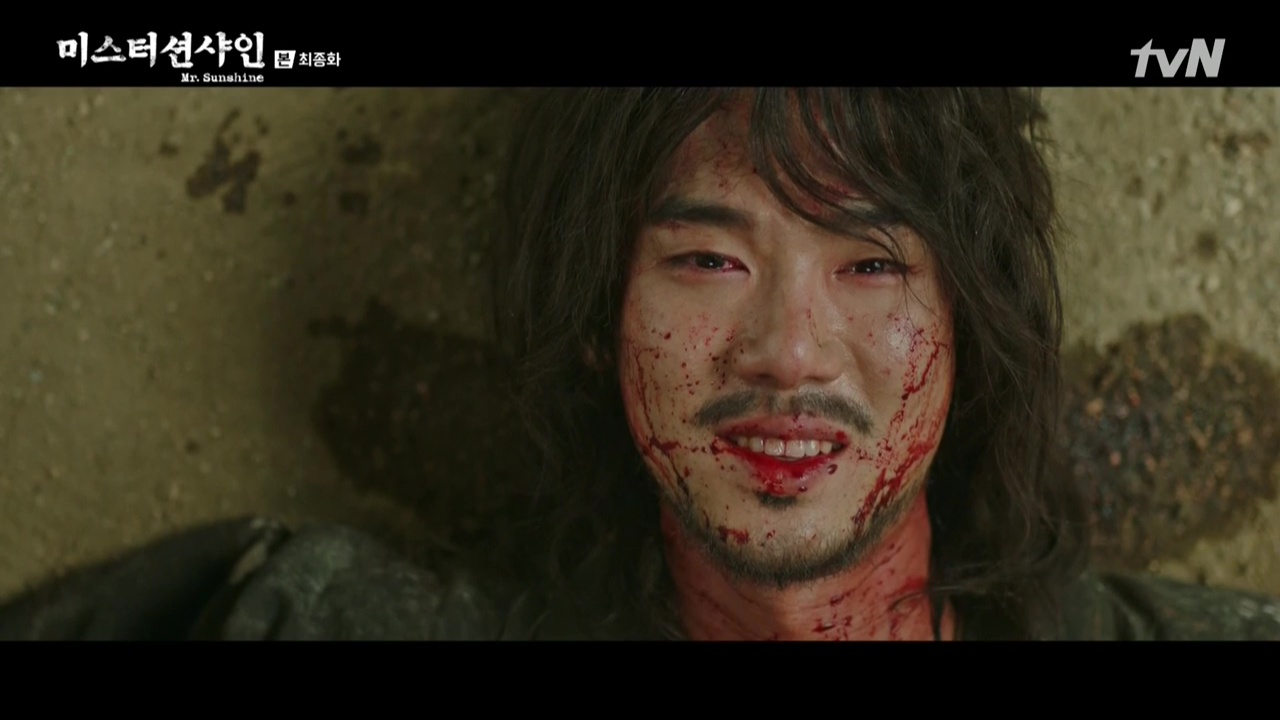
On a rainy night, Eun-san shares his new plan with the Righteous Army to reach Manchuria, where comrades Minister Lee Jung-moon and Song Young have gathered supplies. Due to Japan’s control of the railroads, they can no longer deliver the arms to Joseon and must travel to Manchuria instead.
Eun-san divides the fighting comrades into three platoons, with Ae-shin leading the platoon that will take the train to Pyeongyang and then travel to Manchuria. Eun-san orders Joon-young and the rickshaw runner to steal Japanese uniforms to facilitate the safe boarding onto the train. The remaining platoons will meet any scattered comrades and travel to Pyeongyang by land.
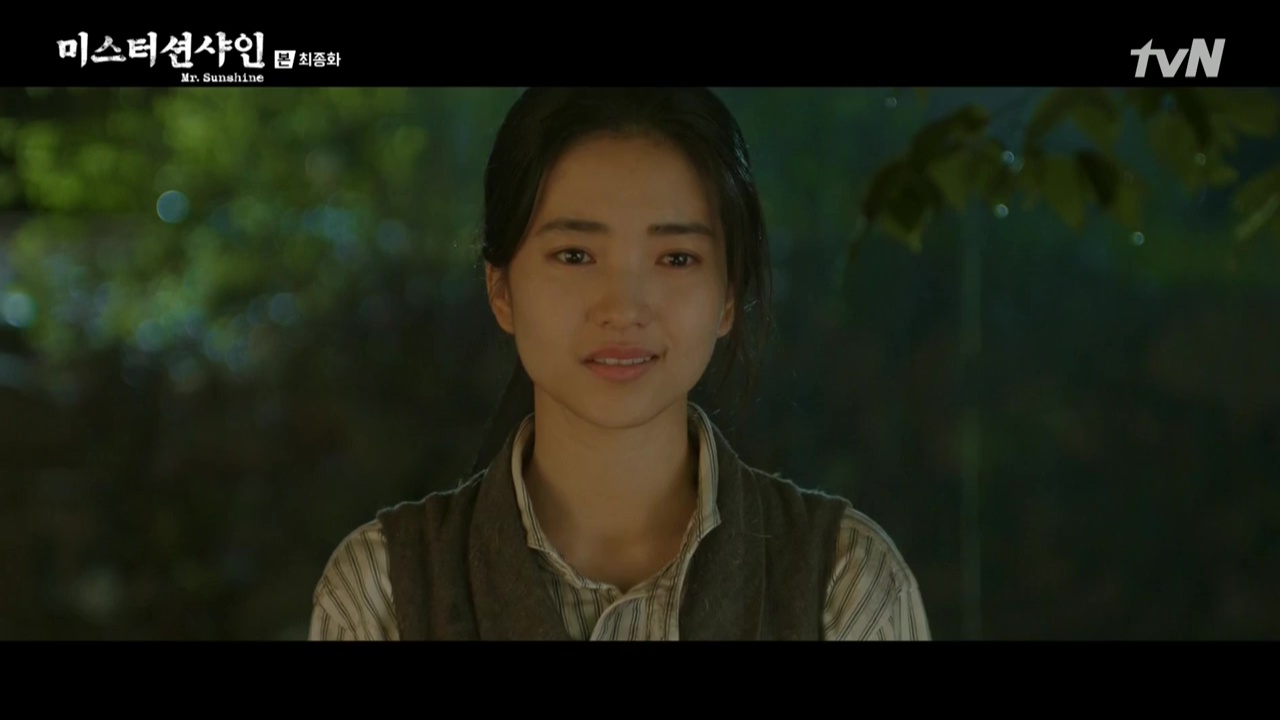
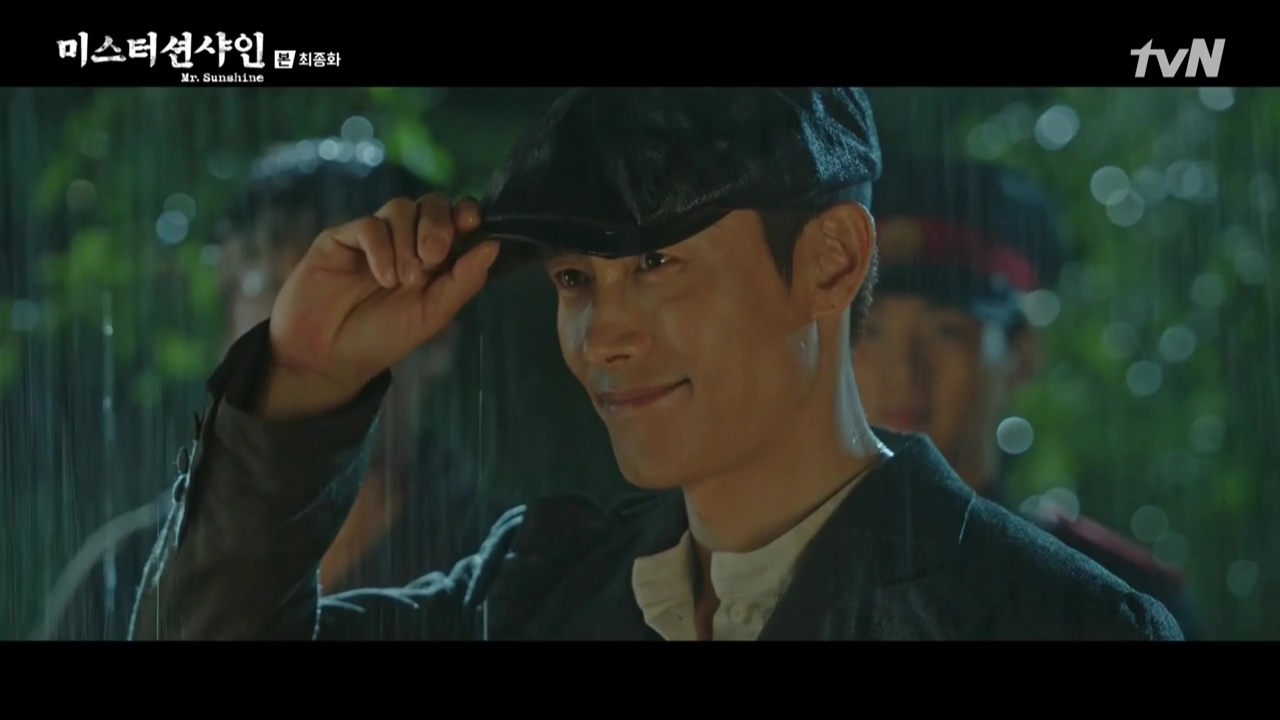
The children with the Righteous Army cry from hunger, so Ae-shin provides her portion of barley. The mothers gratefully accept the food, and Ae-shin plays the music box, which provides a sense of solace and sorrow for Ae-shin and the rest of the Righteous Army. Ae-shin cries to the sorrowful tune, and suddenly, Eugene appears with a gift for Eun-san. He hands over his Joseon flag, and Eun-san jokes that their fourth platoon leader is a foreigner. Eugene announces his one-man platoon and gives Ae-shin a nod.
The next morning, the comrades unfold the Joseon flag and admire its beauty. A young boy trips and leaves muddy handprints on the flag, and the older comrades tease the boy for his seal of patriotism. That gives them an idea, and a woman offers the juice from flower petals for their handprints on the flag. One by one, the comrades leave their stamp on the flag, and the faint blood color of the petals coincidentally makes the handprints look more meaningful.
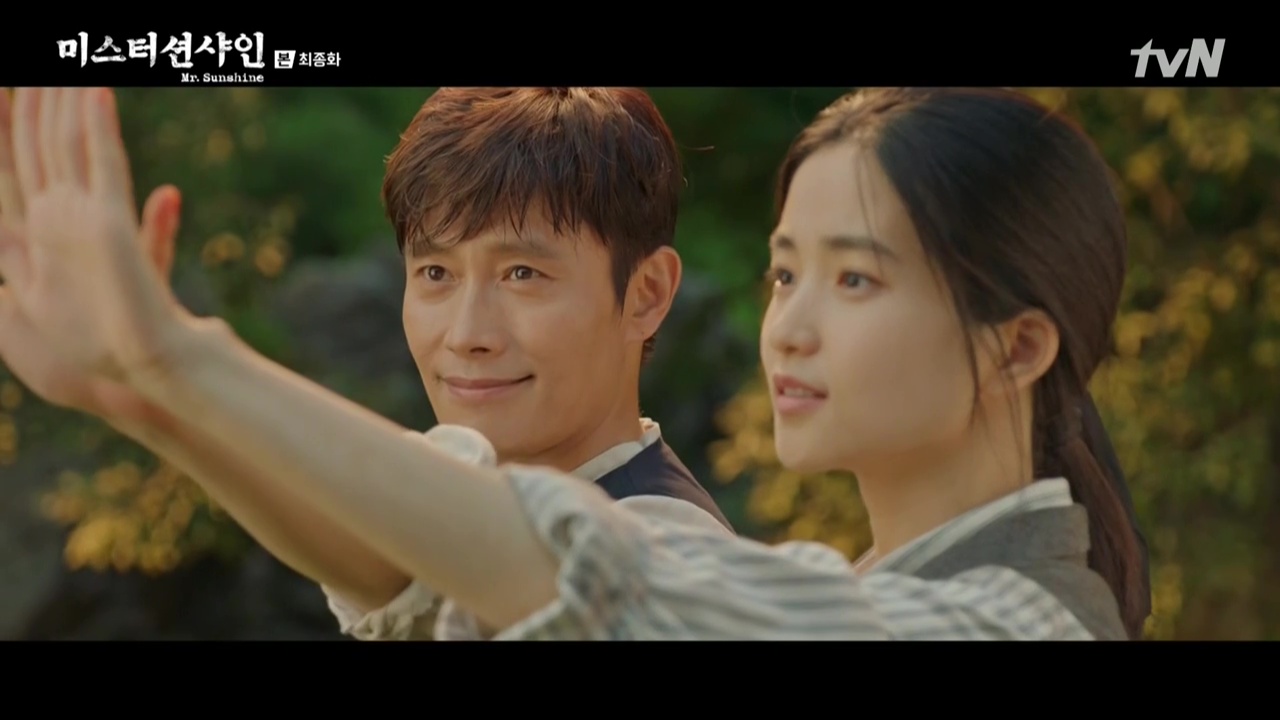
Ae-shin lifts her hand to look at her flower-stained pinky fingernail. Eugene joins her, and Ae-shin laughs that she’s never seen a man stain his fingernail. Eugene jokes that he saw another man (disguised Ae-shin) do this, so he followed suit. Ae-shin says that she’ll be a woman tomorrow and warns him not to fall for her too hard.
The next day, Ae-shin prepares to board the train with her disguised platoon. Disguised in a Japanese uniform, Joon-young urges her to board quickly, and Ae-shin says that she’s taking one last look at Joseon, as she may not return.
Gwan-soo provides Soomi with a disguise, and he repeats the words of one blue-eyed American soldier to assure her that God is always with the Joseon people. He places the gat on her head and says that it will protect her. “God (gat) bless you,” he says. Aw, that’s a sweet use of a pun.
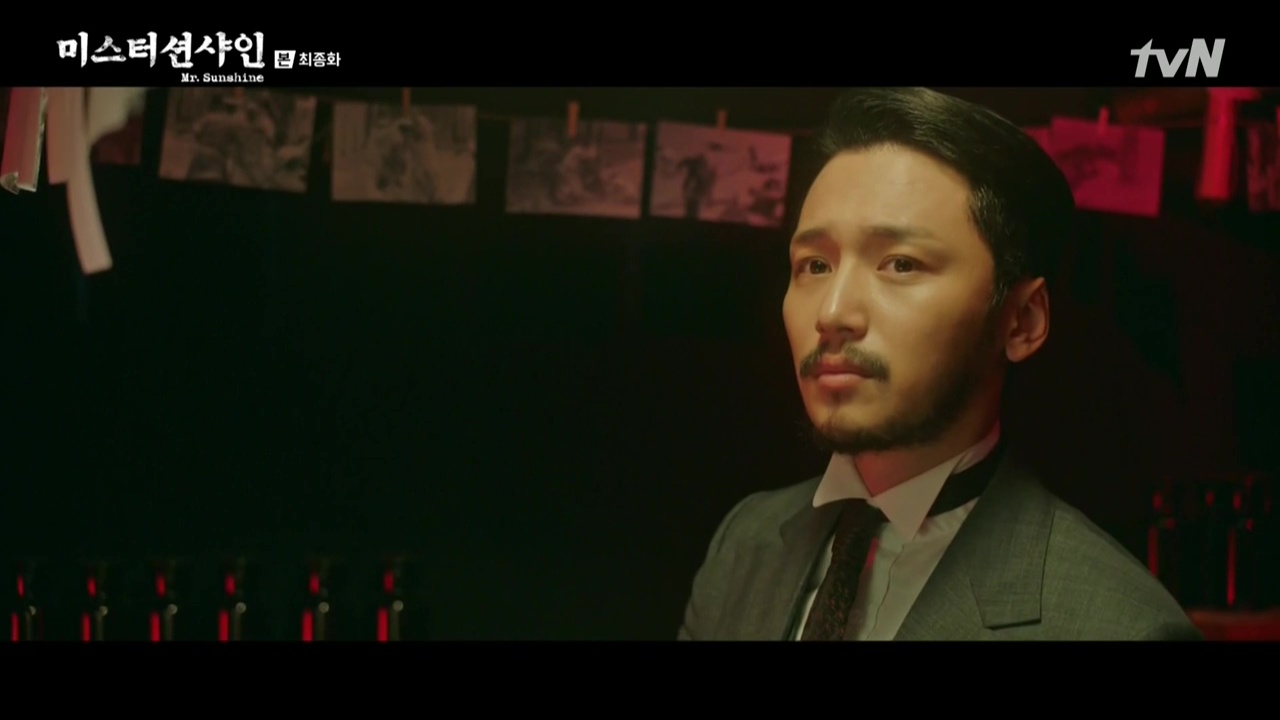
The post office manager brings records of newspaper type acquired in Hee-sung’s name to the police chief, and they suspect that Hee-sung is the nameless newspaper culprit. They seize this opportunity to regain the favor of Minister Lee Wan-yong.
Meanwhile, Hee-sung develops his photos in the dark room, his collection ranging from the photo of the traitor ministers to Hina’s staff to fighting Joseon soldiers to the sketch of Ae-shin. He pauses to admire the comrades who’ve fought and died for Joseon, and he says that it’s been an honor to know them and bring meaning to his life. He wraps the photos and looks at the sketch of Ae-shin one more time before packing his records.
Hee-sung’s reporter arrives at the pawnshop as he’s burying the chest of records and photos, and he gives her his camera. He says that someone gave him the camera to root for him, and he’s paying it forward to her. He tells her to leave and stay away from the pawnshop, since she could be in danger. He gives her smile and confirms that he’s firing her.
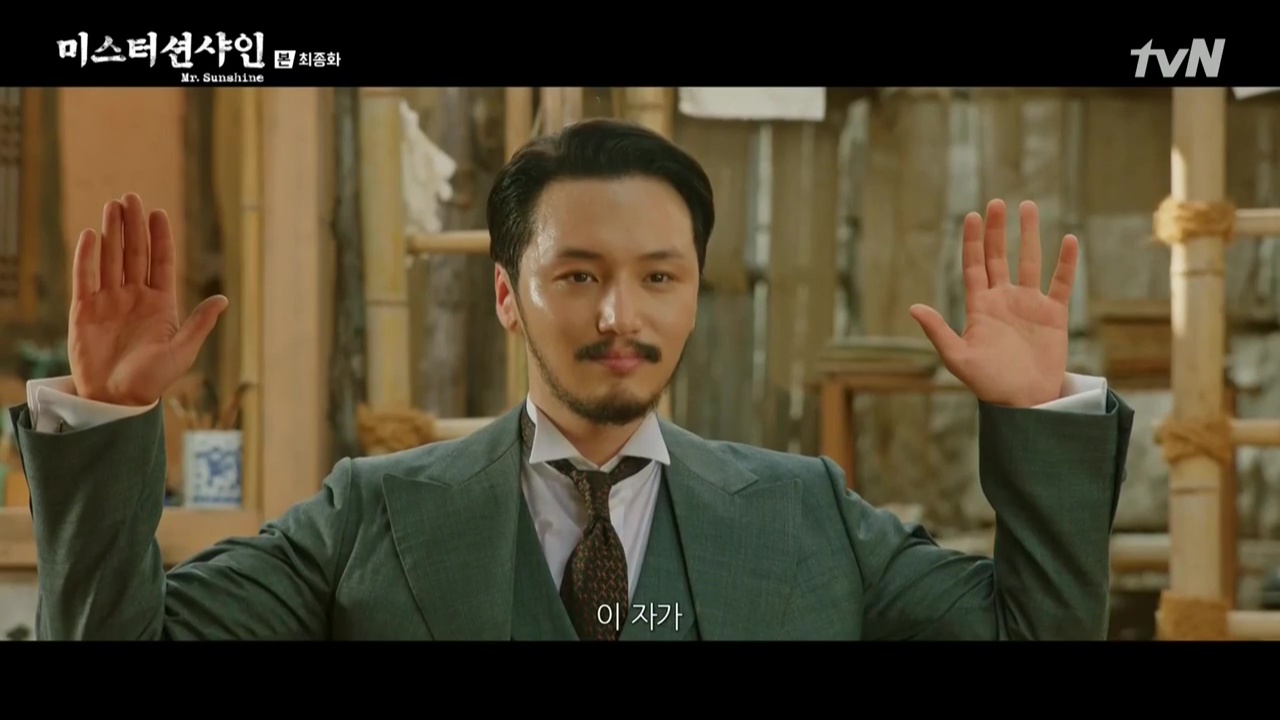
Realizing the impending threat, Reporter Yoon takes the shovel and tells Hee-sung to quickly cover up the spot. She makes him promise to return for the chest, and Hee-sung jokingly promises to come back for the shovel. Just as Hee-sung finishes covering up his treasures, the police chief arrives to arrest him, and Hee-sung willingly surrenders.
Eun-san leads his unit of comrades through the hills to find Japanese soldiers lining up their scattered comrades for murder. It seems like their escape plan leaked, which puts Ae-shin’s platoon in danger, but they’ll be too late to save the comrades on the train. Eun-san must rely on the remaining platoons to protect those on the train and leads his unit to save their comrades in front of them. Before the Japanese soldiers release fire on the captured comrades, the Righteous Army fighters shoot at them, and their scrappy guerilla warfare makes a dent in the Japanese forces.
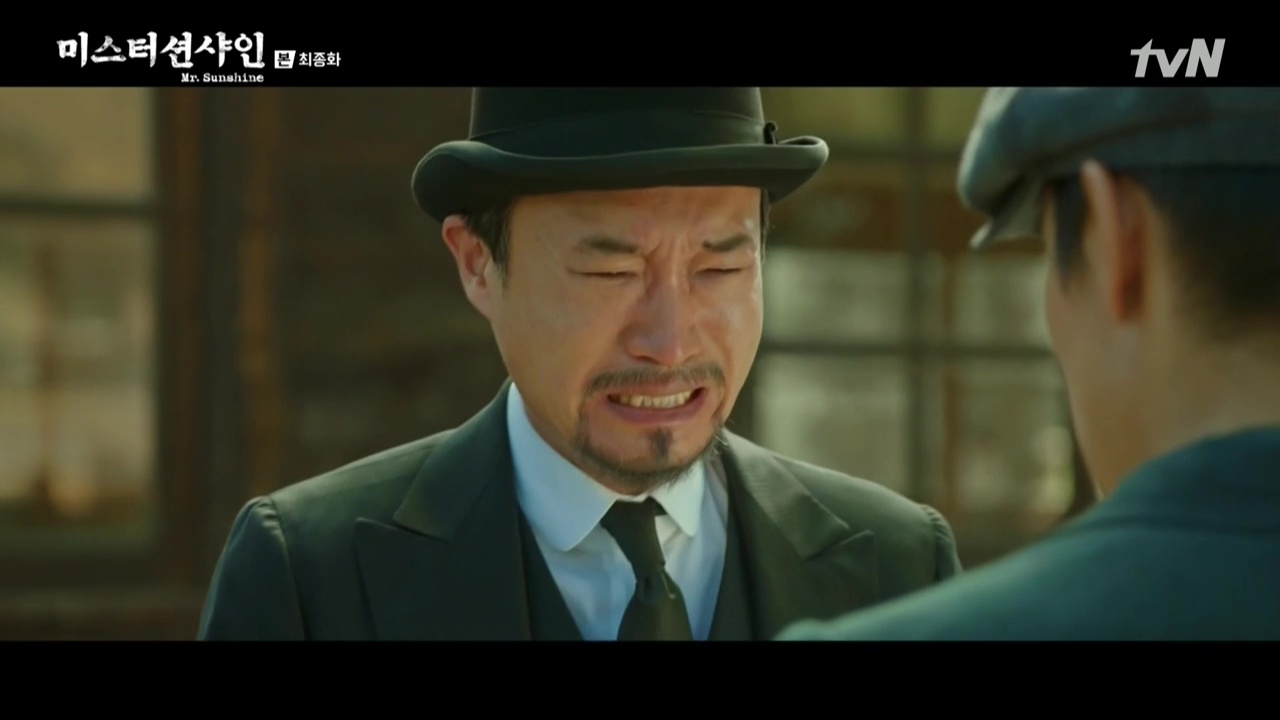
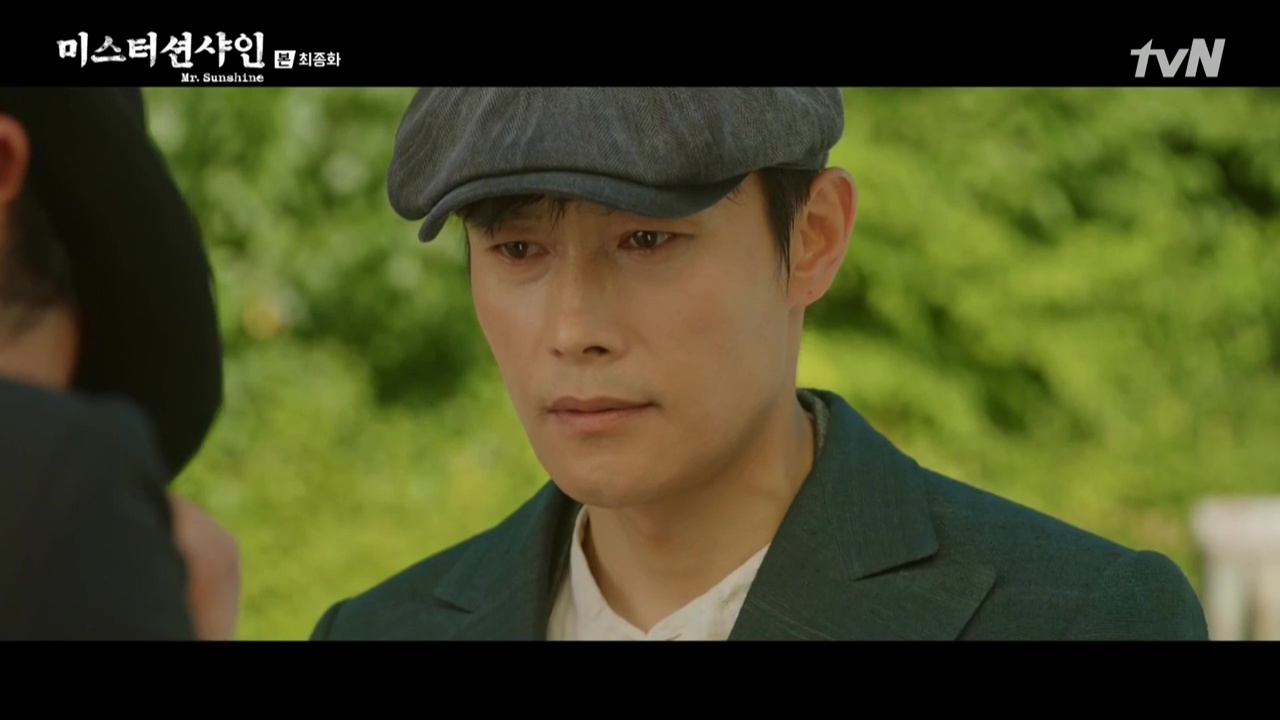
As Eugene arrives at the train station to meet Soomi and Gwan-soo, he overhears the Japanese forces command to delay the train’s departure and wait for supplemental soldiers for a thorough search of the train. Eugene realizes that the Righteous Army’s escape has been compromised and tells Soomi that they need to take a detour.
Eugene tells Gwan-soo to take Soomi to Stella with his bag and check on her frequently. Then, he spells out Gwan-soo’s name in his hand in Korean, causing Gwan-soo to burst into tears. Gwan-soo hugs Eugene, imploring him to return to Joseon, and he takes Soomi to safety. Eugene keeps a close eye on the Japanese forces at the train entrance and checks for his gun under his jacket.
In the train, the two disguised comrades check Ae-shin’s ticket and inform her they’ve been discovered. Ae-shin knows that the Japanese forces are delaying the train departure to wait for supplemental troops and stresses that the train must depart now. Joon-young says that they’re missing two comrades, and Ae-shin knows which two: Eugene and Soomi. Regardless, she must continue with the plan and orders a comrade to follow her to force this train’s departure.
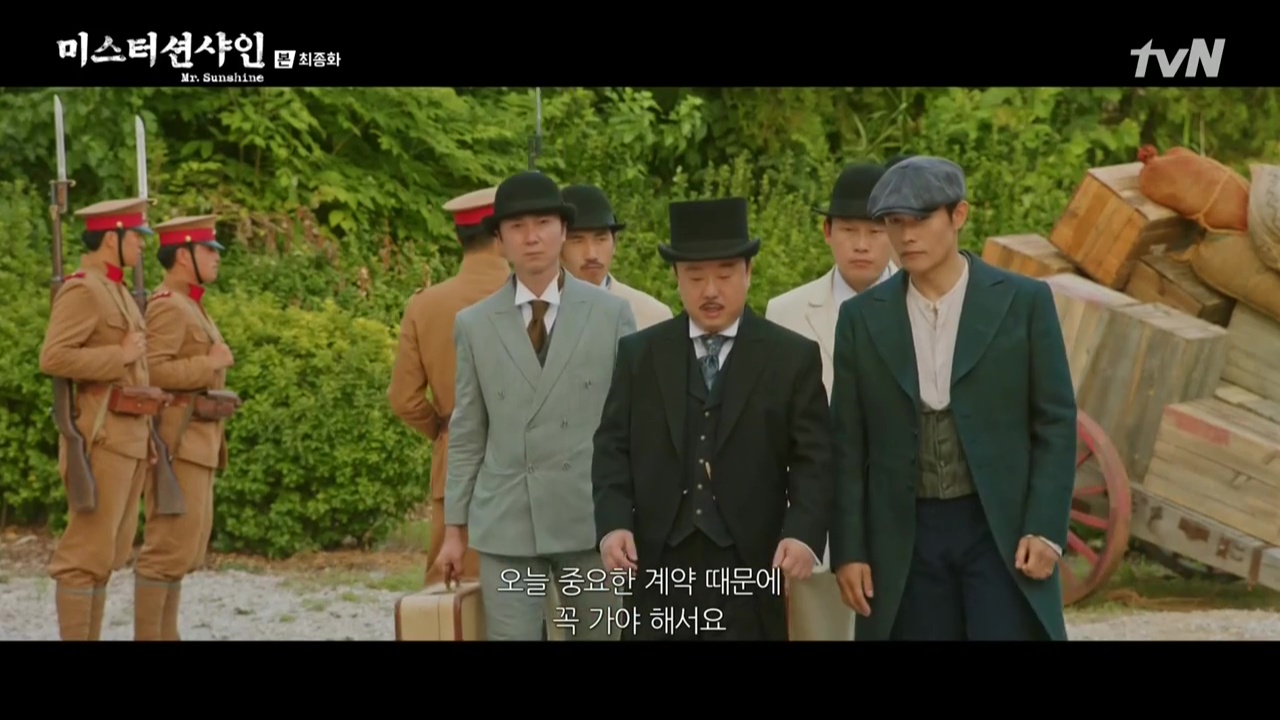
Eugene’s suspicious loitering catches the eye of a Japanese soldier, but the soldiers are distracted by a Japanese baron that they salute to. The Japanese baron complains about all the ruckus in Joseon, and Eugene casually joins his conversation. Eugene pretends to know the Japanese baron and namedrops Takashi Mori as his connection. The Japanese baron regrets to inform Eugene that Takashi died three years ago, and Eugene pretends that he had no idea.
A Japanese soldier stops the baron from boarding the train because of intel about the Righteous Army rebels escaping on this train, and the baron orders the soldiers to find them quickly before they ruin his business. Eugene continues to walk with the baron, who shares that he has a coal mine business in Pyeongyang and has an important business deal that day. The baron asks why Eugene is headed to Pyeongyang, and Eugene honestly responds that his lover is headed that way. They continue their conversation, and Eugene easily slips in with the baron.
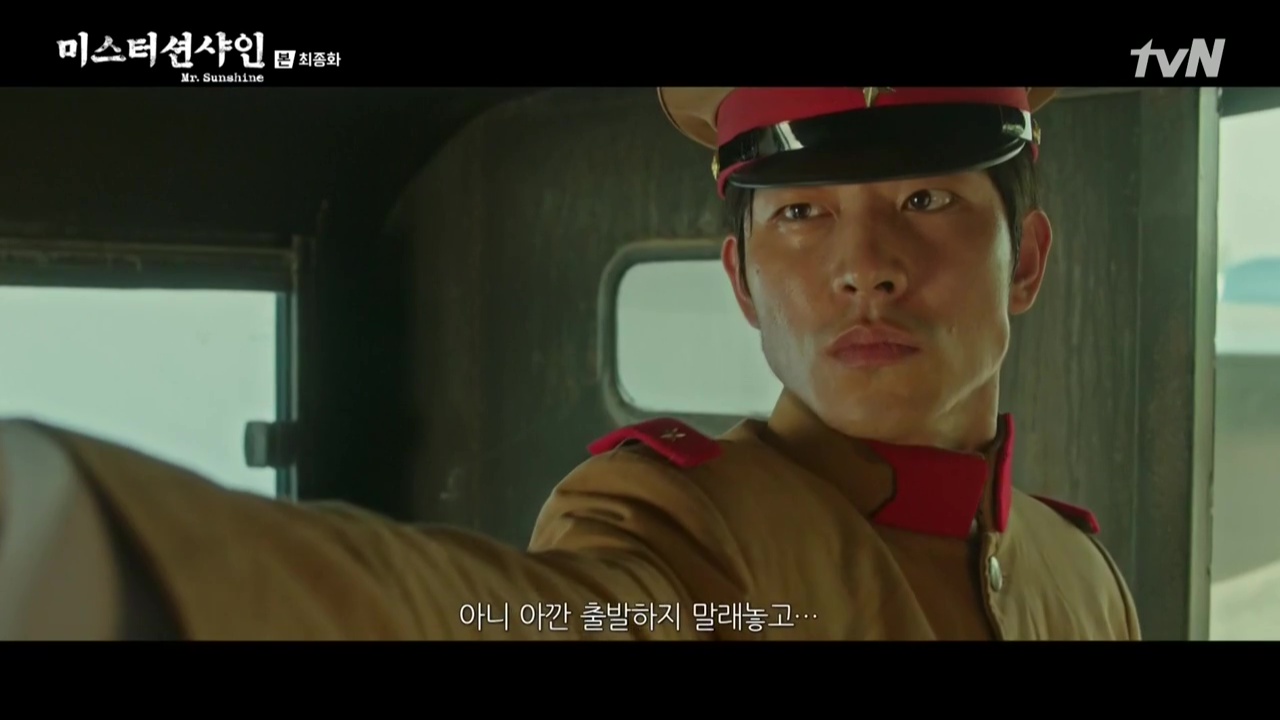
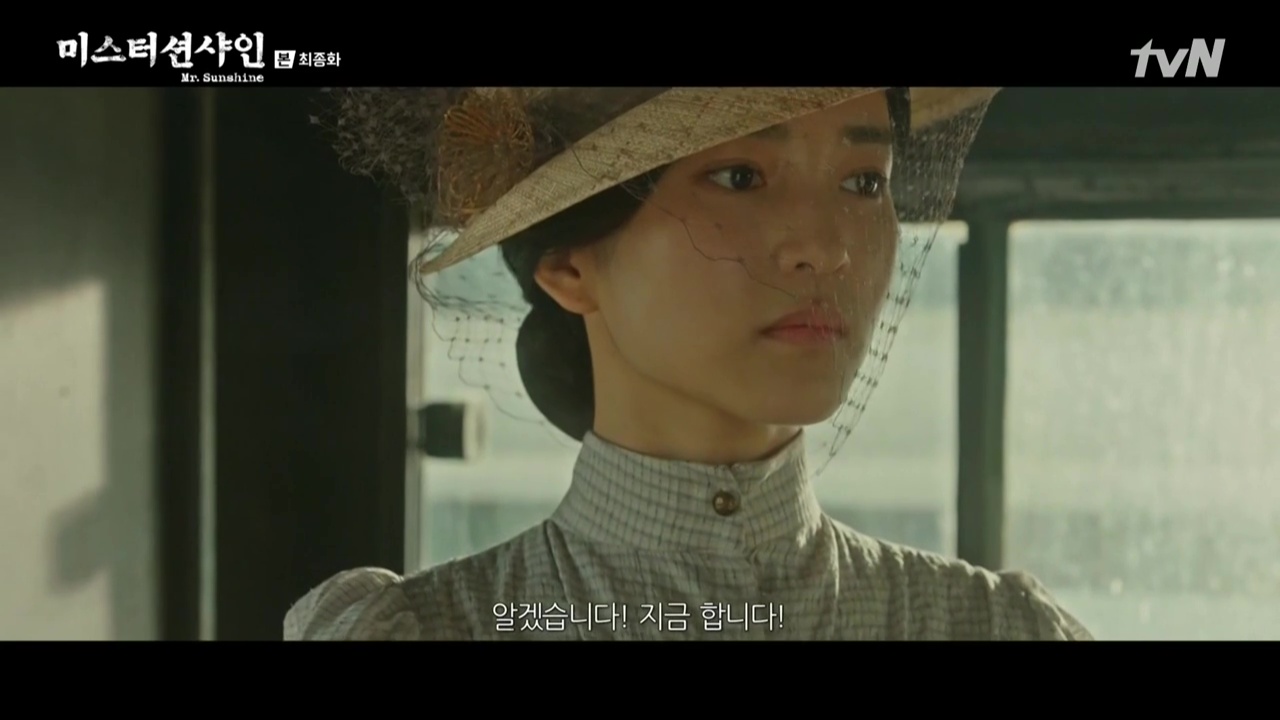
Ae-shin and her comrade barge into the cab and demand the train’s departure, holding the conductor at gunpoint. Ae-shin orders her comrade to keep the train moving and to lock the door to the cab. The Japanese soldiers run after the departing train, and Eugene grabs the businessman to chase the train, just barely boarding as the train takes off.
On the train, the baron tries to thank Eugene with whiskey, but Eugene politely declines and heads to general class. When he enters the general passenger car, he’s met by Joon-young, who quietly greets his instructor. Eugene tells him to save their greetings and gives him the rundown: About six more Japanese soldiers boarded the train, and there’s a useful item in first class. He orders Joon-young to make it to Pyeongyang dead or alive, protecting his comrades, and reminds Joon-young that he’s a lion (a reference to the proverb from his last lesson).
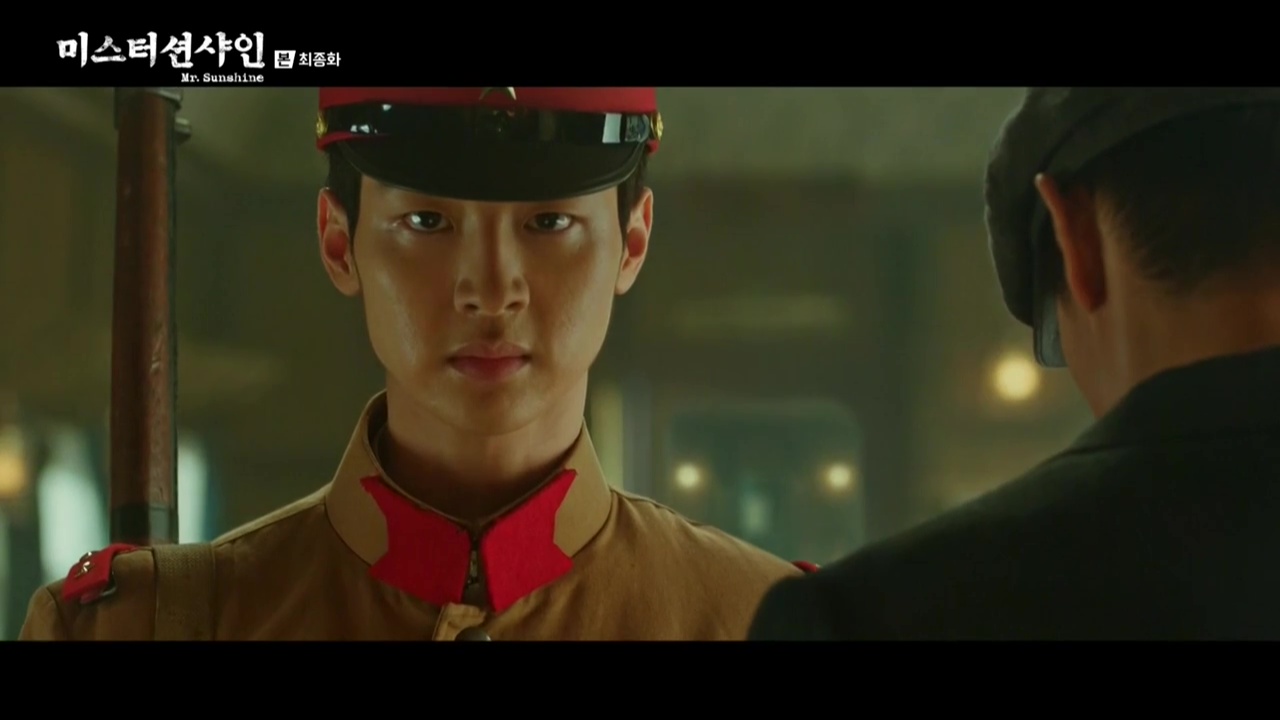
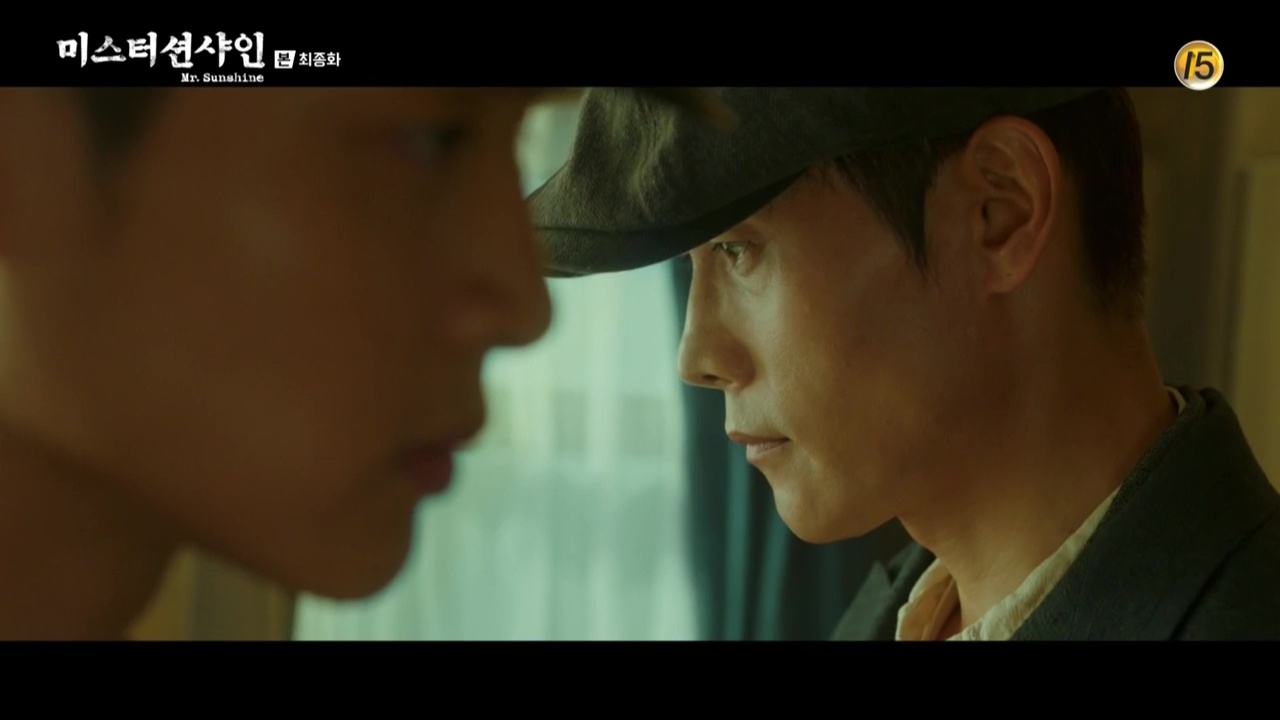
Then, Eugene takes the time to exchange greetings. He tells Joon-young that he’s proud of him. Holding Joon-young’s hand, Eugene says that he missed him and takes his ticket to head to his seat. Joon-young takes a moment to collect his emotions and continues with his mission.
As the Japanese soldiers search the passengers with the sketch of Ae-shin, the young boy with the Righteous Army points to them and calls them Japs. The disguised tailor scolds the boy in Japanese, and the disguised nurse quickly covers up the slip to avoid further suspicion. The Japanese soldiers don’t think twice and continue their search.
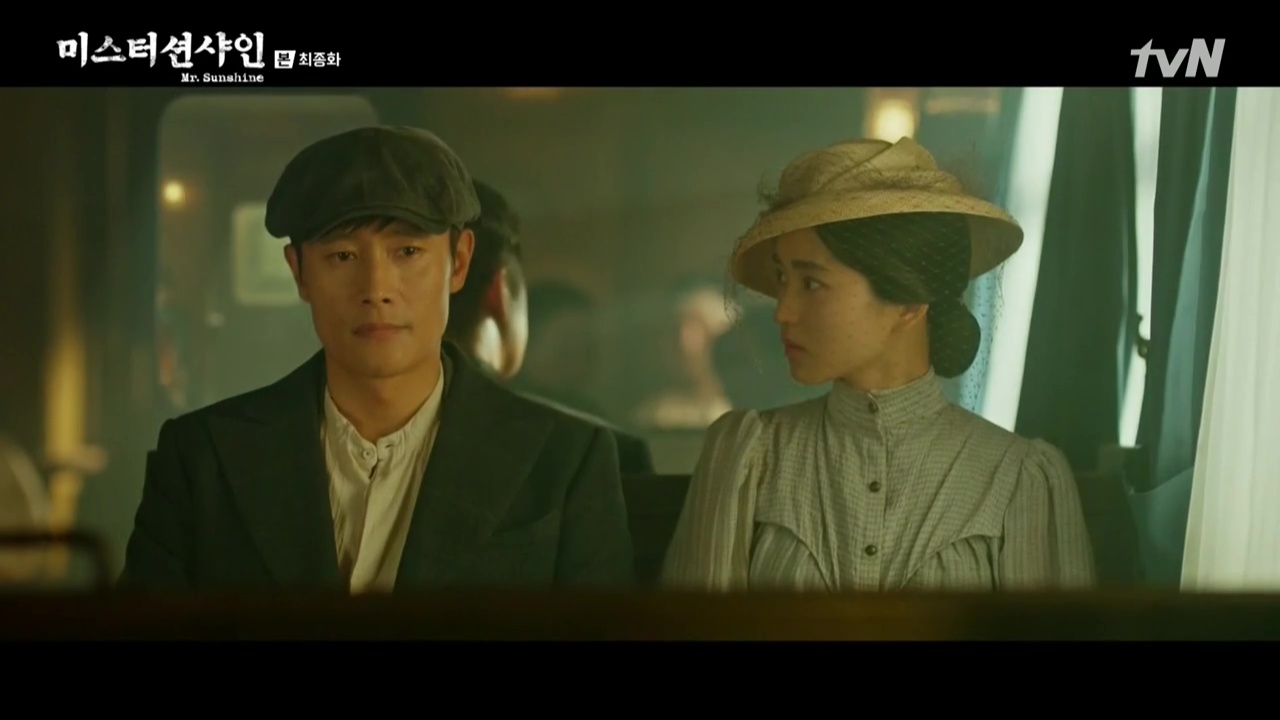
Ae-shin reaches into her bag for her gun when someone suddenly sits next to her. She turns to find Eugene, who commends her excellent execution of the mission. She says that it’s because she’s the wife of an excellent American. Eugene smiles at the compliment and proceeds to check his gun. He only has one bullet to use for his mission in first class, and Ae-shin holds his hand to stop him. Eugene assures her that as always, he’ll just need to use his one bullet well. He squeezes her hand, and we see that they both have their rings on.
After successfully fighting off the Japanese soldiers, Eun-san orders the remaining Righteous Army fighters to gather the injured comrades and to scavenge any weapons. Then, they hear the echoes of marching soldiers and horses approaching, and Eun-san looks at the regrettable sight of Japanese forces lined up on the hills. A comrade fearfully asks if they’ll be able to fend off these forces, and Eun-san responds that they can’t turn back now.
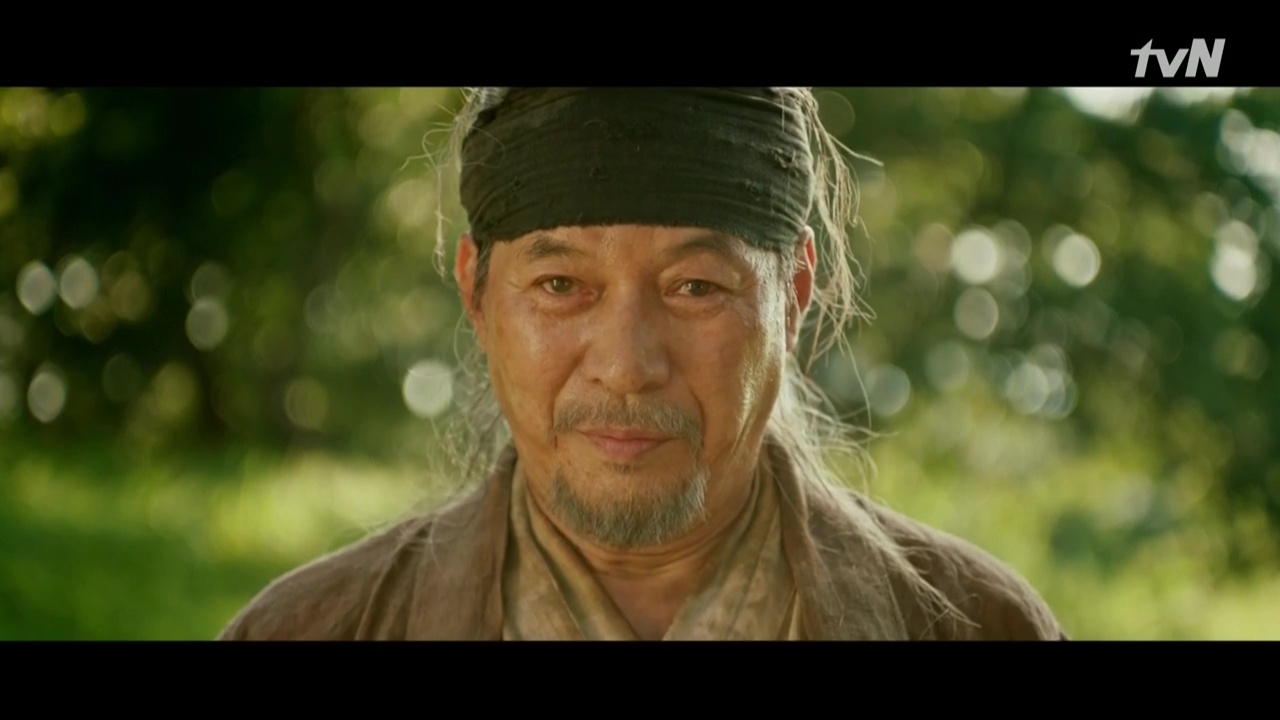
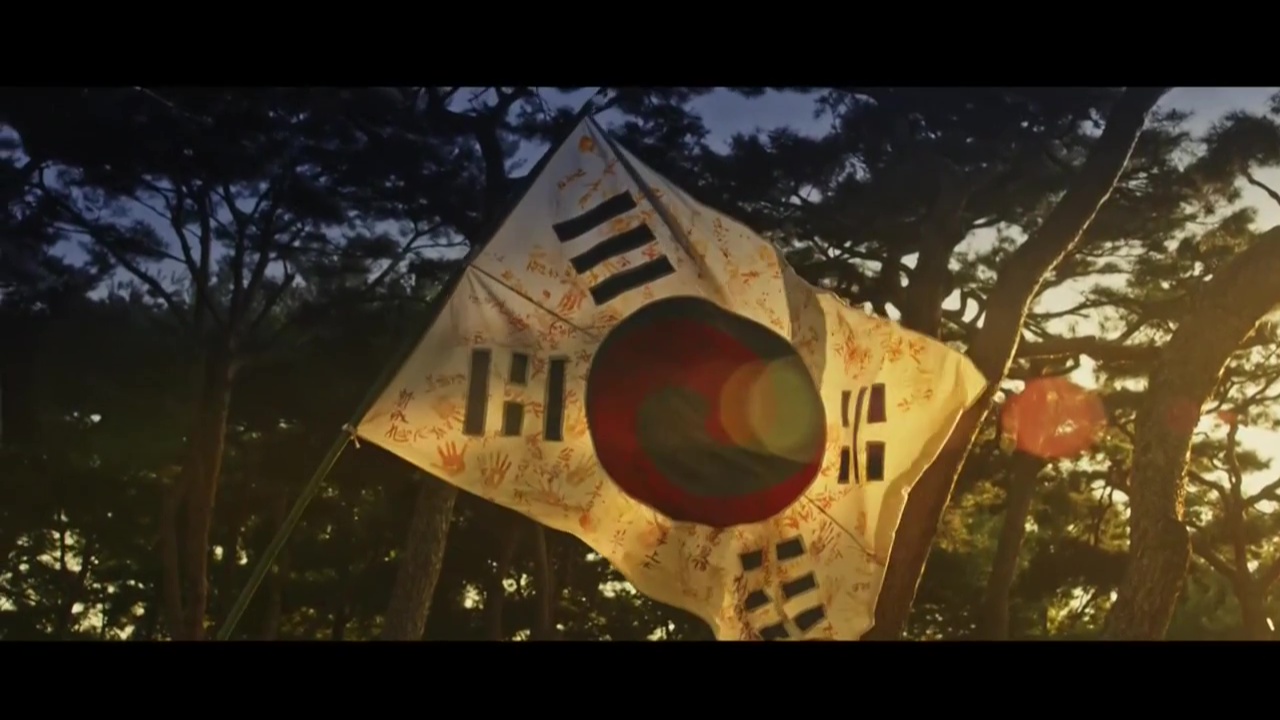
Eun-san tells the fighters. “It’s not only the magnificent days that make history. Although we know that we will lose and barely endure with our crude weapons, we must fight and make it known that we were here, that we were afraid but fought to the end.” The comrades agree that they only die once and seem determined to take a few of the Japanese soldiers with them. They run into the battle with the Joseon flag waving with the promising handprints of Joseon’s future.
Eugene enters the first class passenger car to meet with the baron, who once again offers whiskey. Eugene declines once again and says that he needs to save his lover. Then, he asks who killed Takashi, and the businessman infers that it was the deed of a Righteous Army rebel, like their train inconvenience today. Drawing his gun, Eugene corrects him and reveals that the culprit was an American who escaped Joseon.
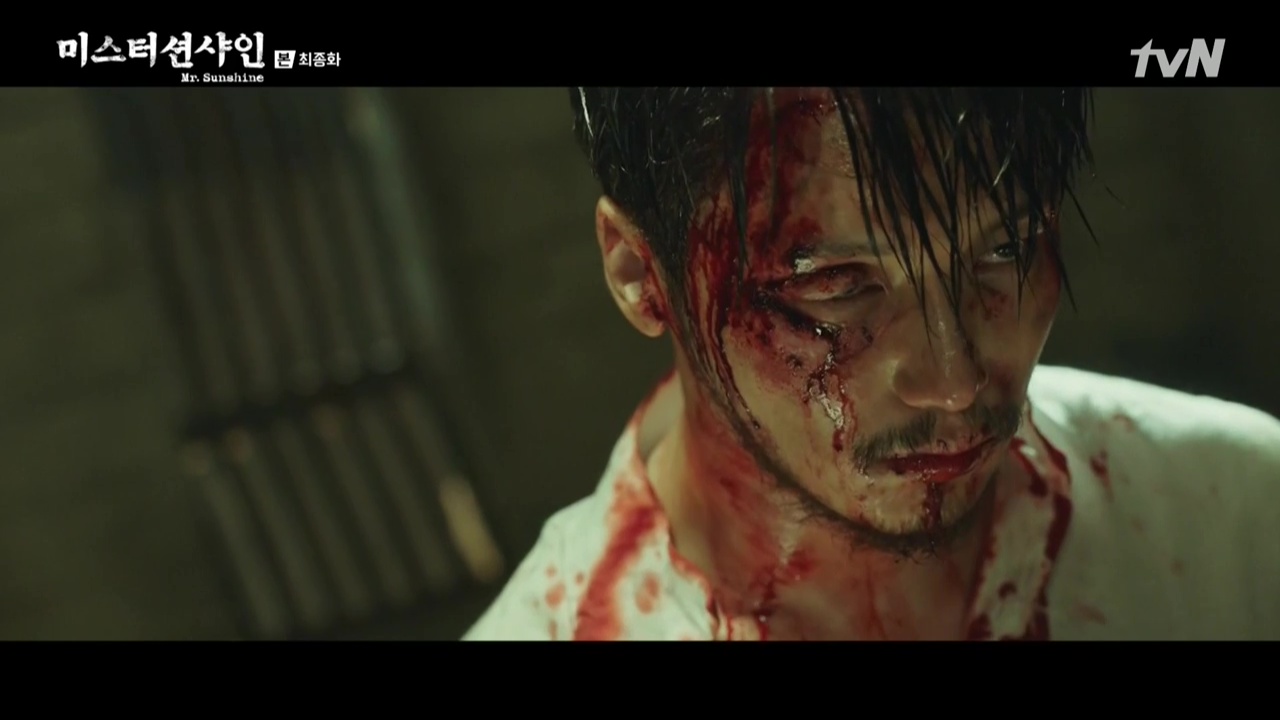
A Japanese soldier brutally beats Hee-sung and demands to know where his photos are. The soldier notes the detail and bias in his newspapers, and he demands the list of Righteous Army rebels, as he knows that Hee-sung is on the side of rebels Eun-san and Ae-shin. Bruised and bloody from the beating, Hee-sung looks up with a smile and says that those are beautiful names. That earns him another beating, but Hee-sung continues, “I only like beautiful and useless things: the moon, stars, flowers, smiles, jokes. If I am linked with the rebels for this reason, then I am honored.”
The soldier yells at Hee-sung to speak in Japanese and continues to beat him. Hee-sung suffers a fatal blow to the head, and he falls to the ground. He slowly loses consciousness and closes his eyes to the sound of the ticking pocket watch.

The Japanese soldiers continue to search the train passengers, and Joon-young lingers in front of Ae-shin with the sketch in his hand. A soldier approaches Joon-young and asks what troop he’s from, since he’s never seen him before. When Joon-young fails to answer, Ae-shin stands up and reveals her identity. Then, she takes out her gun and shoots at the enemy soldiers.
At the sound of the gunshots, the Japanese soldiers gather to attack Ae-shin and Joon-young. They’re outnumbered and look desperate in their fight against the enemy soldiers. Then, a voice orders the soldiers to seize fire. It’s the baron, and he’s held captive by Eugene, who orders the Japanese soldiers to retreat.
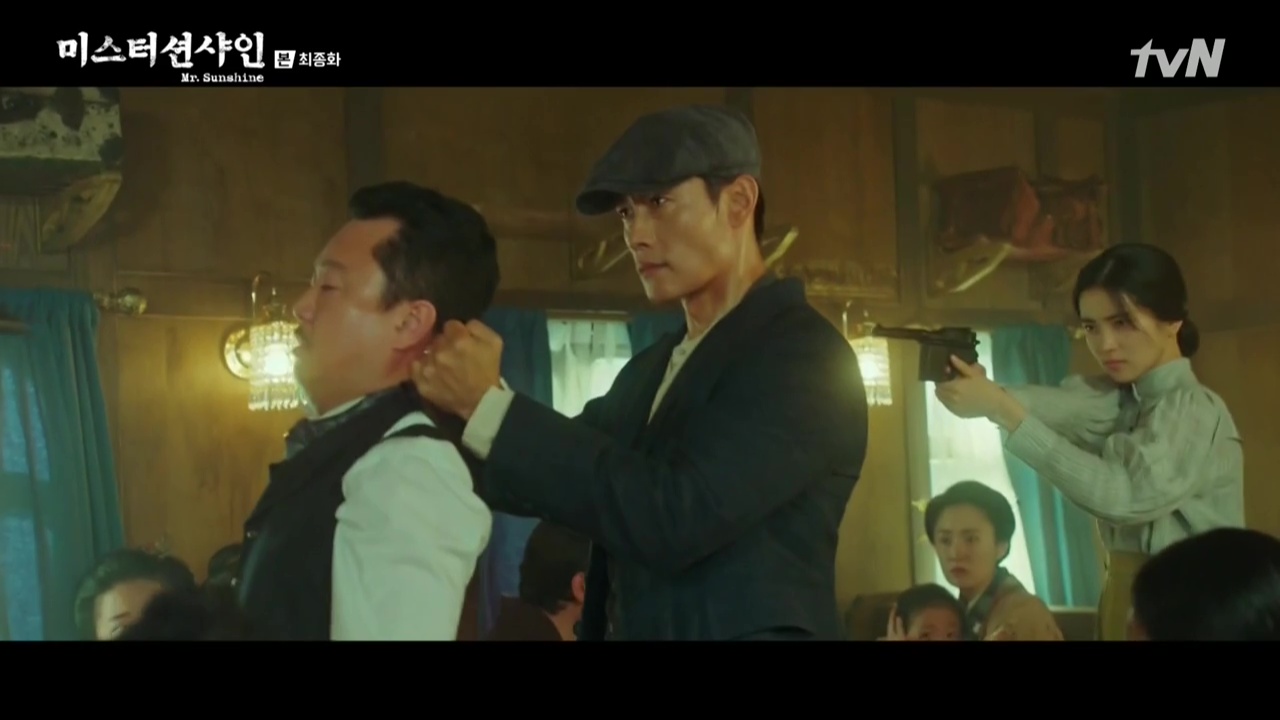
Eugene walks toward the soldiers with the baron hostage, and Ae-shin follows him with her gun pointed at the soldiers. The soldiers continue to backpedal into the next train car, and Ae-shin admits that her gun is empty. She asks what his plan is, and Eugene says that he’s walking the path to delay Joseon’s ruin. He asks her to endure a little longer until the tunnel and asks her not to cry. He says, “This is my history and my love story. That’s why I’m going. I pray for your success.”
As they near the tunnel, Eugene hold back his tears and turns around to Ae-shin. He tells her, “Continue to go forward as I take a step back.” He gives her one last smile and yells at the soldiers to move forward. Once they enter the next train car, Eugene points his gun at the coupler of the two train cars. Realizing what he’s doing, Ae-shin runs to the end of the train, but Eugene has already decoupled the trains with his last bullet.

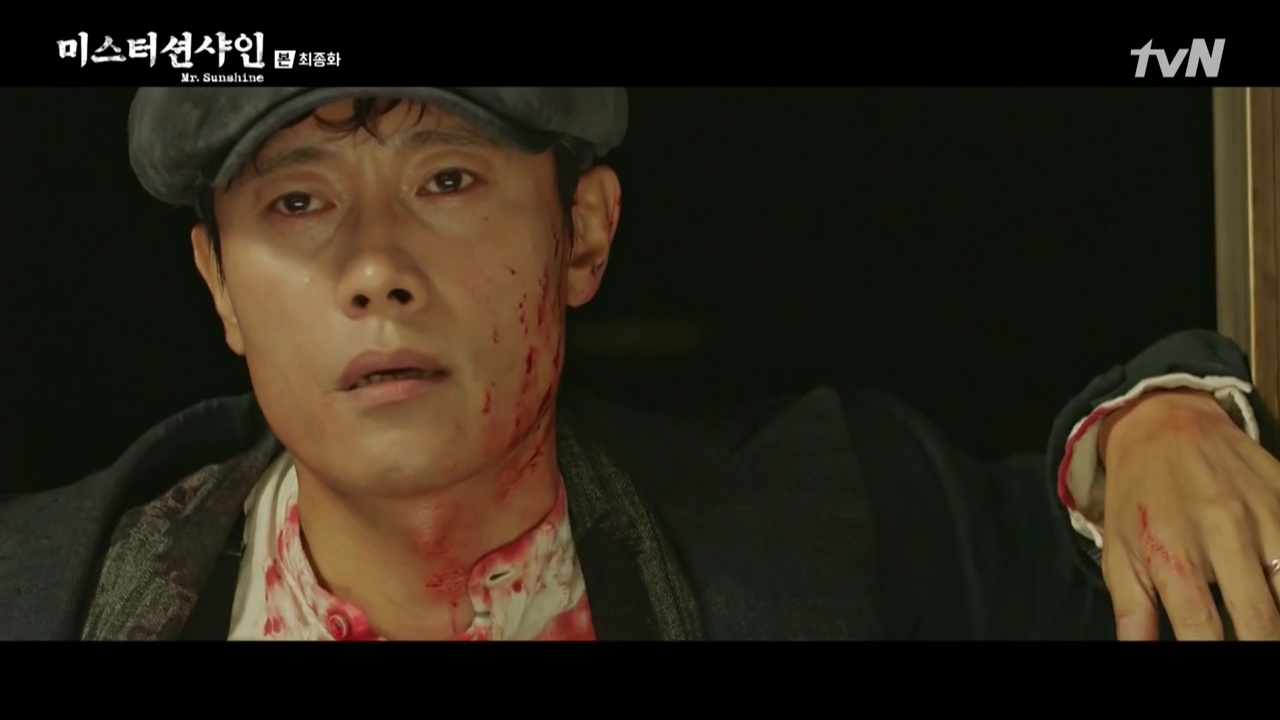
Ae-shin cries for Eugene as he falls victim to the gunshots of the Japanese soldiers behind him. As the train continues to separate from Eugene’s car, she screams, “Choi Yoo-jin!” The train exits the tunnel, and she crumbles at the edge of the train. Eventually, Eugene’s train car reaches the end of the tunnel, and he’s covered in blood from the gunshots. He looks to the sky as he once did in his youth and falls, blood dripping down his ring-bearing hand.
Resident General Ito Hirobumi orders Commander Hasegawa to bury the names of the deceased Righteous Army rebels and ensure that their existence is never documented. But the names of the deceased fighters don’t die, as Gwan-soo repeats the names of the Righteous Army fighters to Emperor Gojong. Gwan-soo sobs through his report to the emperor, who also cries silently in mourning.
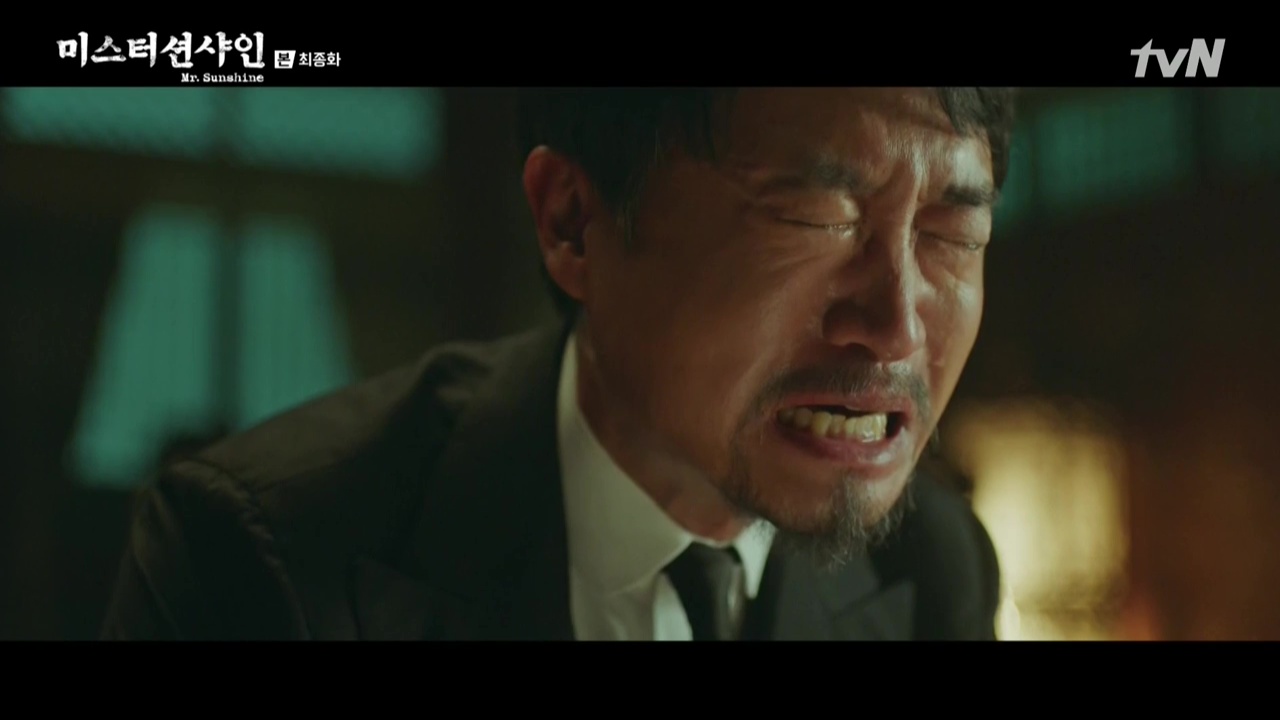
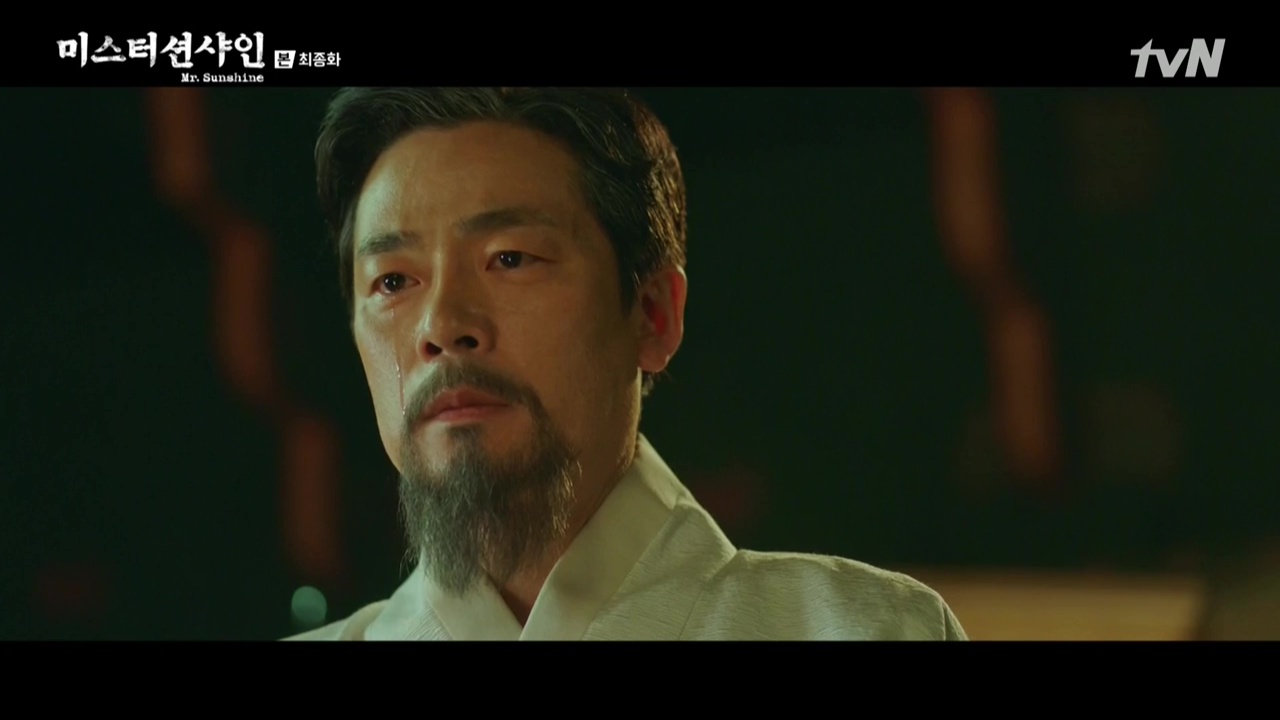
At the language school, Soomi opens Eugene’s bag to find his mother’s ornament and the photo of Eugene and Ae-shin from the Japan studio. She cries when she sees the photo, and we hear the voiceover of Gwan-soo’s letter to Kyle, who tearfully reads the letter: “I deeply regret to inform you of Eugene Choi’s death. Born in Joseon, Eugene lived as an American and a foreigner until he died, and he wished to be buried in a country that never accepted him. So I ask of you to request that Eugene be buried in the foreigner’s burial site.”
Il-shik and Choon-shik return to their pawnshop, and they find a note from Hee-sung asking them to accept his pocket watch as payment for rent. Villagers enter the pawnshop with remnants from a destroyed Joseon, including the medicine cabinet and Dong-mae’s sword. Hee-sung’s pocket watch, Dong-mae’s sword, Eun-san’s pottery, and the shoes of an unknown Righteous Army comrade are displayed almost as memorabilia.
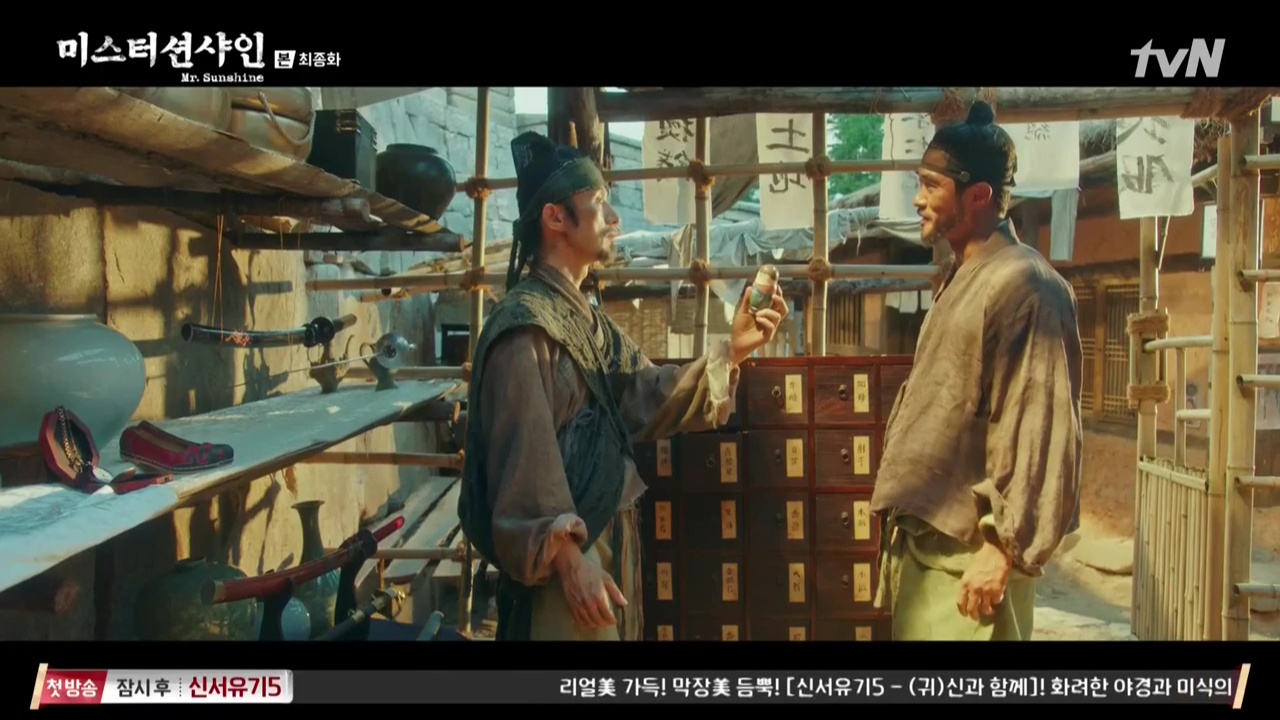
Il-shik finds Eugene’s matryoshka doll in one of the medicine cabinets, which used to be Ae-shin and Eugene’s secret correspondence vehicle. It seems that Eugene wrote a letter to Ae-shin in the doll before he left for Japan with her. He writes, “Our trip to Japan will likely be our farewell. Wherever you went, I always wanted to be with you. I didn’t know you would make me say goodbye.”
When Eugene returned to Japan after completing his time in prison, he visited the photo studio to retrieve the photo of him and Ae-shin. He smiled and cried at the photo, and we hear him continue to narrate his letter: “Every step I took with you fulfilled my life. Every moment with you felt like a picnic. Oh, by the way, picnic starts with a P.”
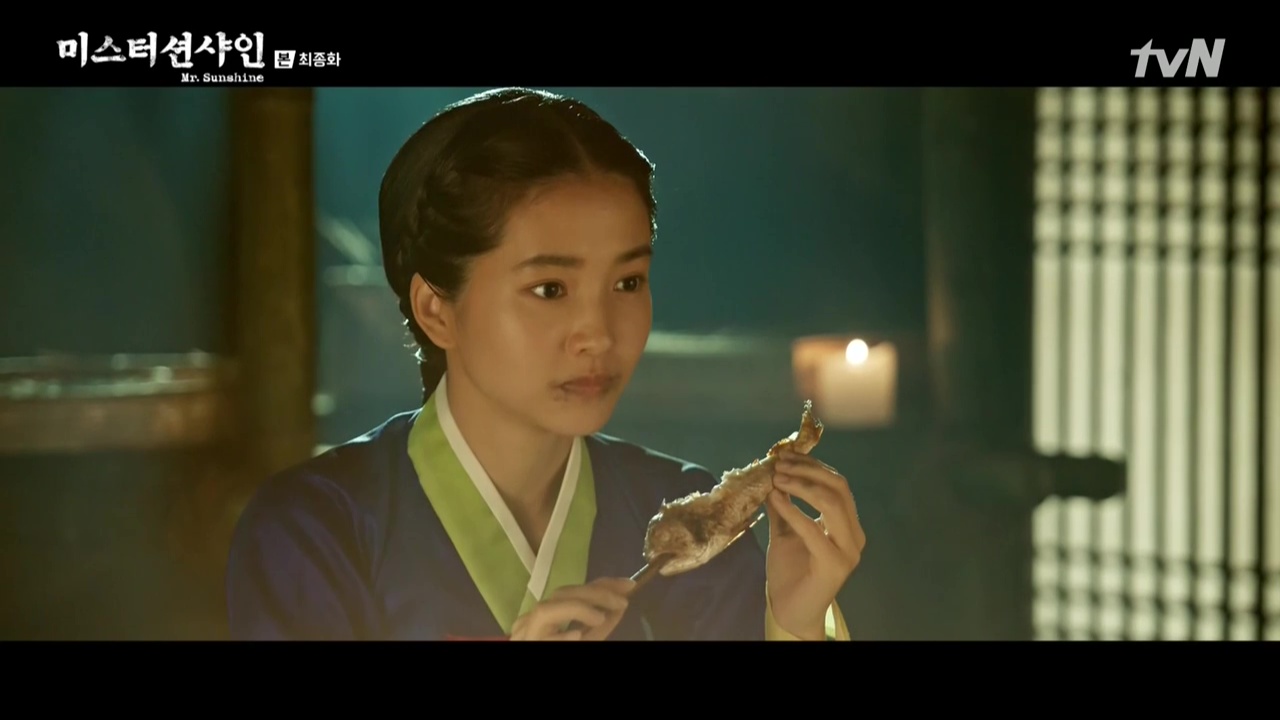
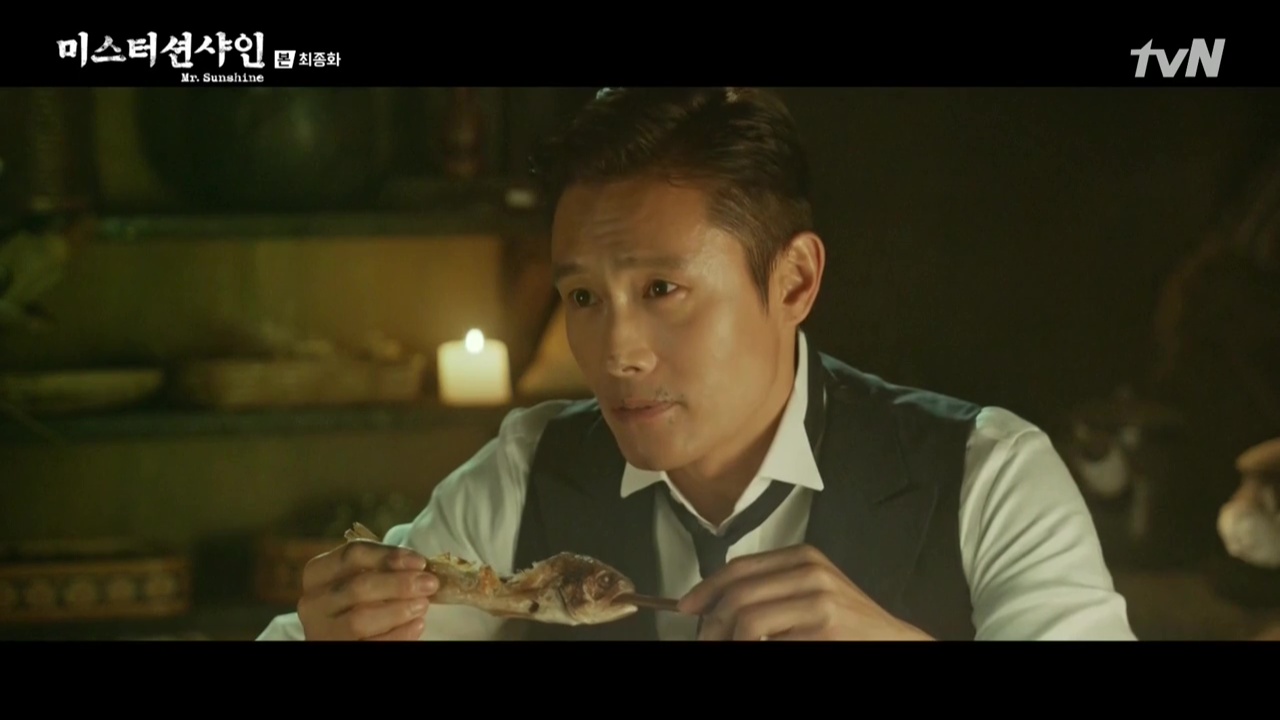
Back when Eugene and Ae-shin went fishing, they had returned to the medicine shop to cook the fish they caught. Eugene boasted that he was good at everything on a boat, and Ae-shin didn’t know, insisting that she doesn’t know much other than paintings — her usual excuse of being an innocent noblewoman. She asked what fish was in English and assumed that the word started with a P based on the pronunciation. Eugene corrected her that it was F, and she pouted about him spoiling her mood.
Continuing with his letter, Eugene asks, “Are you still saving Joseon? Please do so. Go Ae-shin had a burning passion, and I loved that Go Ae-shin very much. Now, I say goodbye.” Two years later in Manchuria, Ae-shin teaches her comrades under the waving Joseon flag. She tells her comrades that once they shoot, they’re location is revealed, and she asks what to do next. Soomi (yay, she joined!) wonders if they shoot again, but Ae-shin corrects her: They run fast.
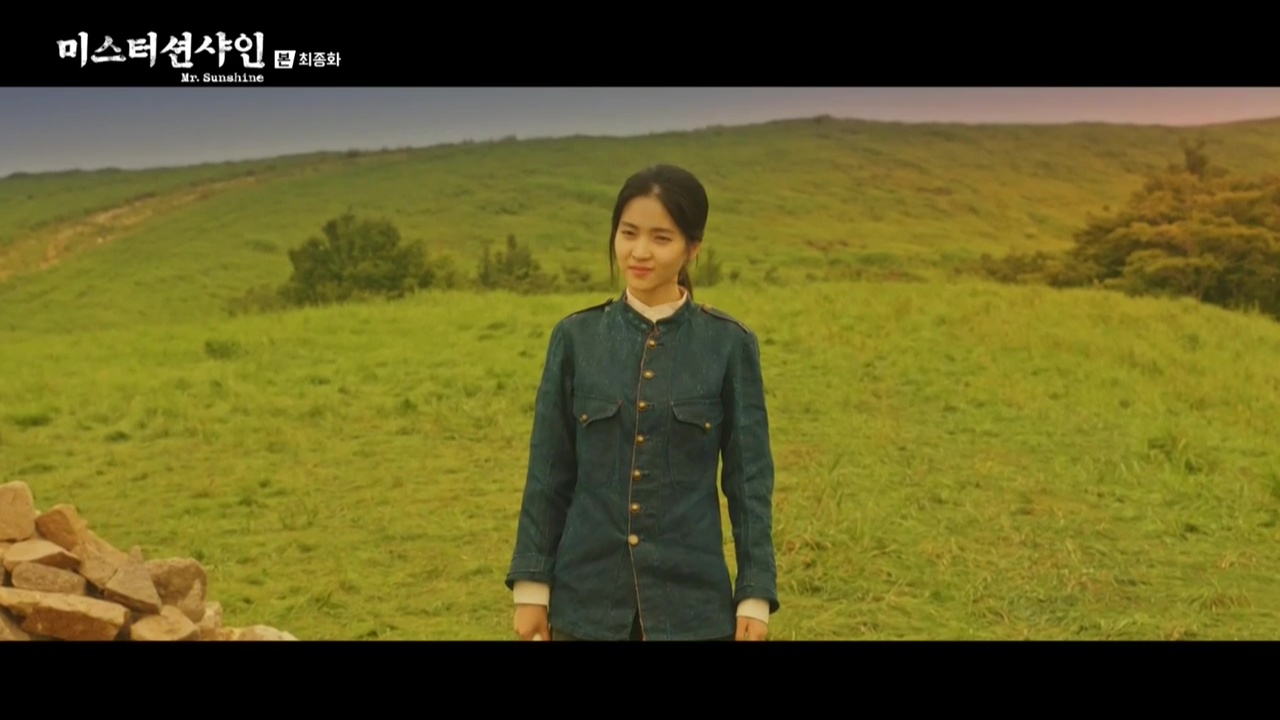
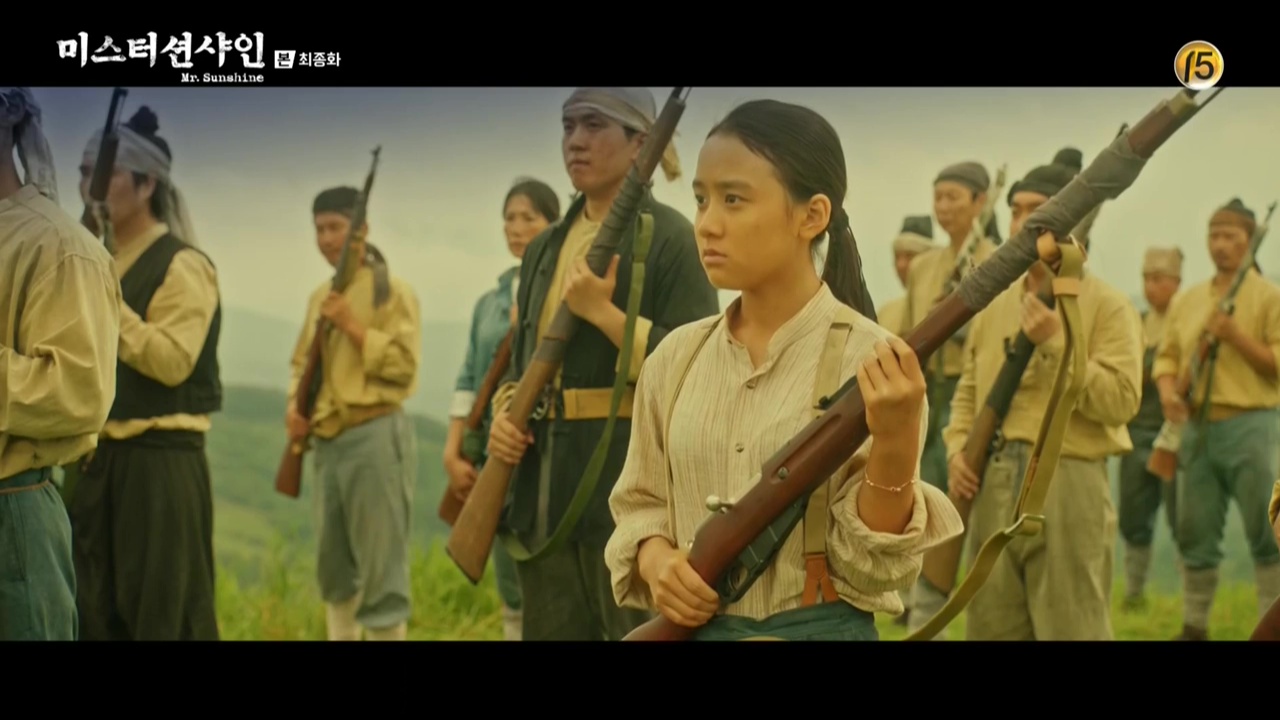
With that, Ae-shin orders her comrades to run up the hill, and they all race to the top. Ae-shin smiles at her running comrades, “These were brilliant days. We were all flames, blooming and wilting passionately. Now we burn our flames once more with the embers left by comrades. Since my English hasn’t improved, I kept my farewell short: Goodbye, comrades. In our freed nation, see you again.”
In the year 1919 at the foreigner’s burial site in Gyeongseong, we see a Joseon soldier honoring the Eugene, whose grave reads: “The Greatest & Noble one, still on a picnic here in Joseon.” The soldier remembers his youth, when Eugene told him that this was his fight — it’s Domi (cameo by Kim Min-jae)! Grown Domi says that he won’t stop in their fight and salutes to Eugene with his comrades.
The closing message reads: “Goodbye Mr. Sunshine. In a freed nation, see you again.”
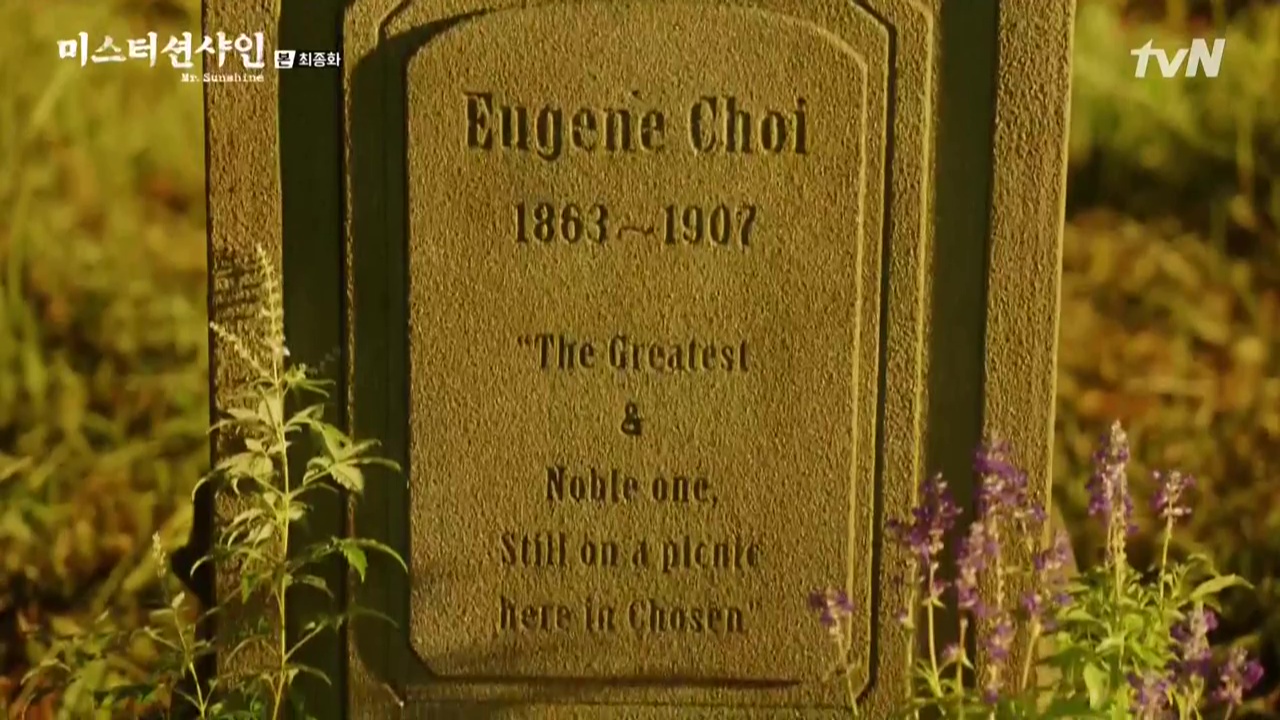
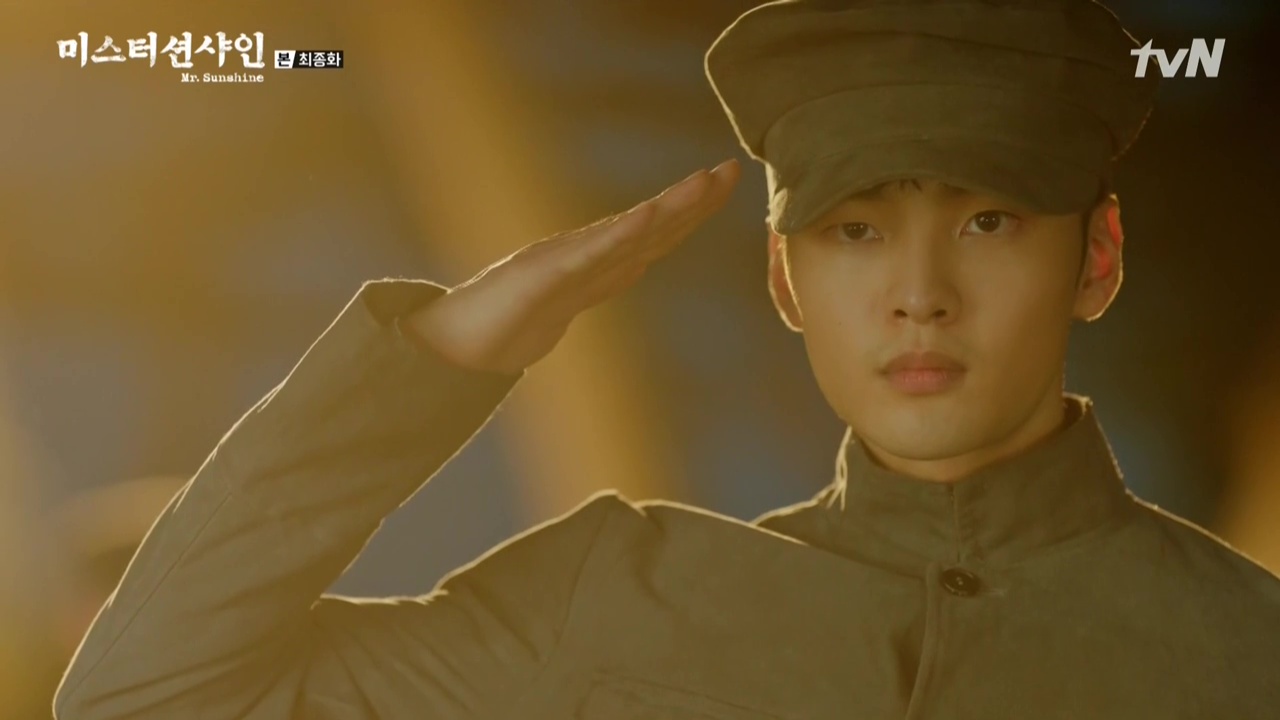
COMMENTS
Goodbye, indeed. Woo, we made it! In true tvN fashion, we were gifted/cursed with a loooong monster of a finale, but I’ll admit that the show made a grand and memorable exit. This episode was bursting with emotion and nose tingling feels that signal the floodgates to open, and I would have been a mess if I had watched this in one go. Fortunately, recapping required lots of pausing and excuses for me to take breathers when a scene got too overwhelming, which happened quite frequently. Starting from the moment we entered the episode, I was captured by Hee-sung’s duality in photographing the traitor ministers and the symbolism of the camera shutter gunshots. He knew that that they were standing on the wrong side of history and understood the importance of documenting the names and faces of the oppressors. This is the duality I needed from Hee-sung ten episodes ago because Byun Yo-han is so damn capable of carrying this character, as we saw in his final moments as Hee-sung. At least Hee-sung died in glory, honoring and protecting the history of the oppressed.
Though Dong-mae was possibly my favorite character, I was ready for him to die. Even he was counting down the days until his death. Regardless, I appreciate that we got to see him until the end because close-ups of Dong-mae drenched in emotion were just the best. Also, his last interaction with Ae-shin was so important to closing his character arc. He had always regretted saying those piercing words to her, but he also took pride in affecting Ae-shin so deeply. Ae-shin’s confession clarified the impact of that insult, which I believe motivated both Ae-shin and Dong-mae to their respective places in the resistance.
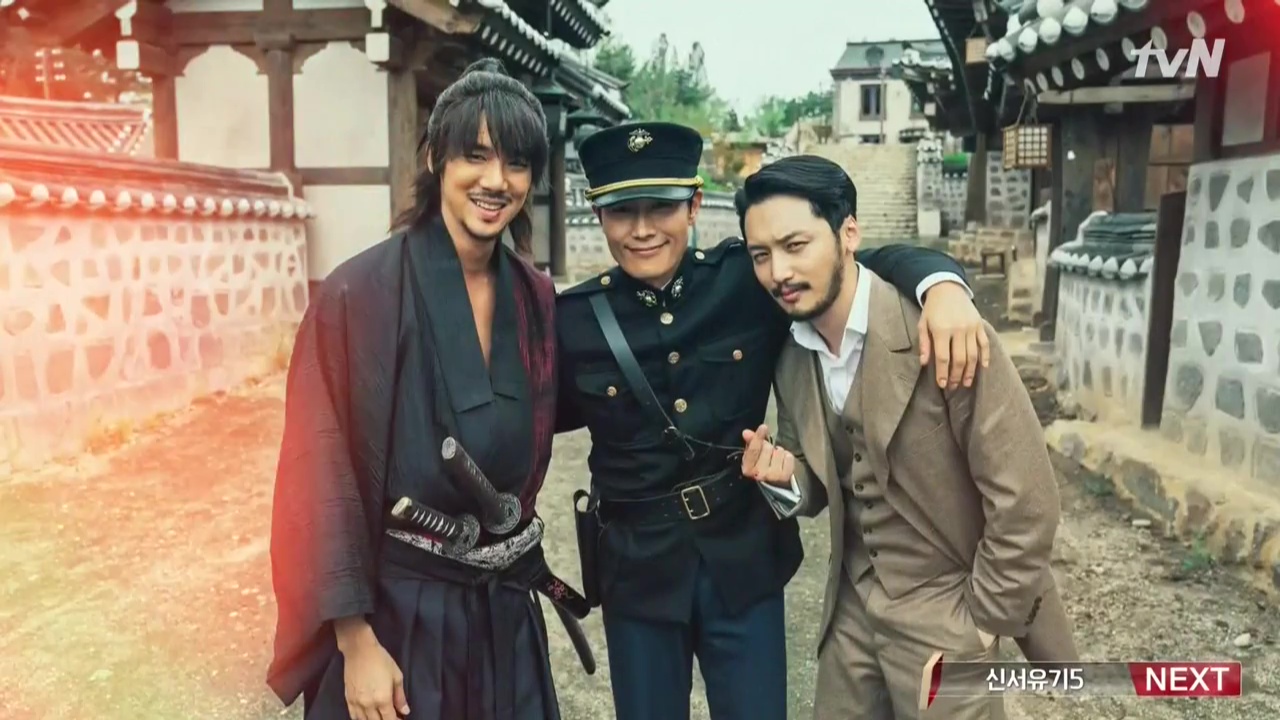
As with the appearance of An Chang-ho in a previous episode, I love when shows pay homage to historical figures because it adds another fascinating dimension of realism to the events on screen. I live for these moments in historical fiction, especially when they’re done with a subtle touch as this finale did with Frederick Arthur McKenzie, a real-life correspondent who gave a voice to the Righteous Army. The photo that he took in the scene really resembles the real-life photo taken by the real journalist, and I appreciate how this small detail adds to the pathos of the show.
These last few episodes really brought me back to the initial hype of this show and reminded me of the epic drama I was promised. For a blockbuster show with great ratings and an aesthetically beautiful production, I wasn’t impressed with a good middle chunk of the show, which was disappointingly devoid of any necessary action. I’m glad someone turned on the switch for the last couple of episodes, making it an action-packed, tear-jerking ride until the end with a sprinkle of whiplash. Ultimately, as promised, there were guns, glory, and a sad ending, though I would consider those last few minutes more hopeful than sad. I’m interested to revisit my thoughts on this show in a few weeks to reflect in retrospect and consider this show in a more objective light because this finale shook me to my core.
Peace out, Mr. Sunshine. (Maybe probably not) See you (and your Paris Baguette PPL) again!
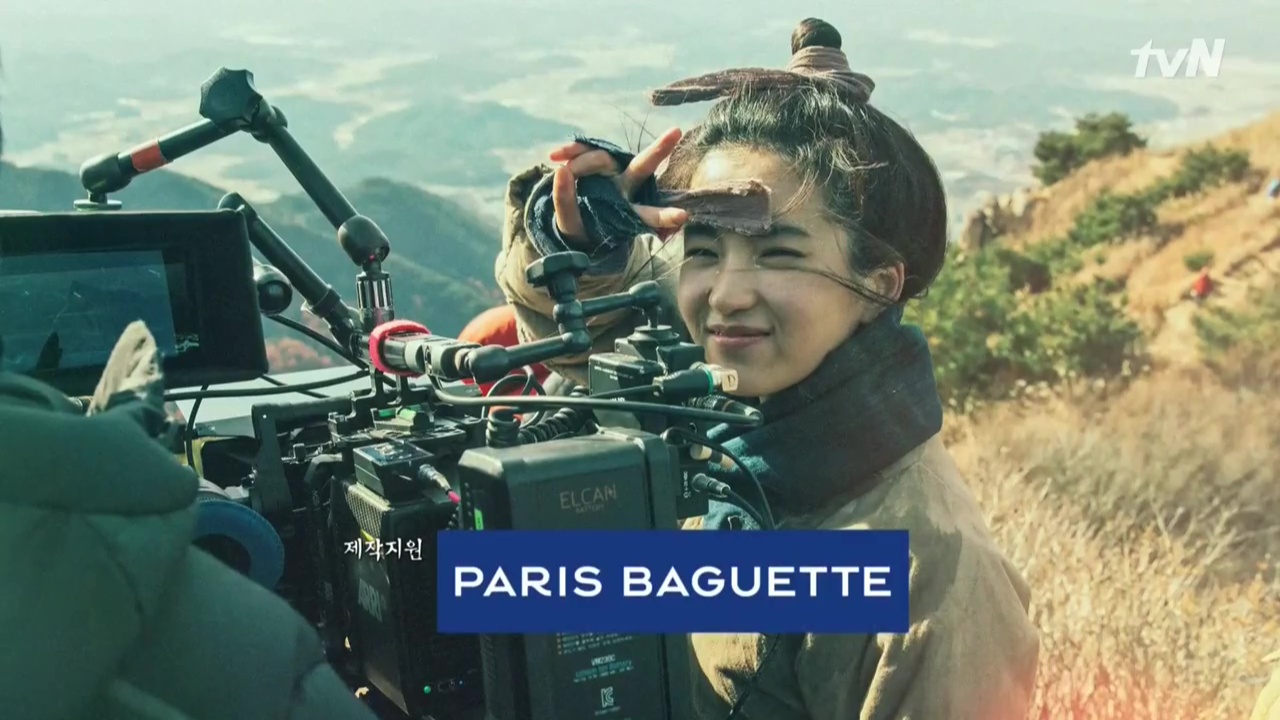
RELATED POSTS
- Premiere Watch: Your House Helper, Mr. Sunshine
- The epic battle for Joseon in tvN’s Mr. Sunshine
- Lee Byung-heon’s period drama Mr. Sunshine gets delayed
- Period drama Mr. Sunshine secures slot on tvN’s early 2018 schedule
- Byun Yo-han added to Mr. Sunshine’s star lineup
- Yoo Yeon-seok joins Mr. Sunshine as tragic second lead
- Film ingenue Kim Tae-ri cast opposite Lee Byung-heon for Mr. Sunshine
- Lee Byung-heon makes drama comeback with Goblin writer’s Mr. Sunshine
- Goblin writer Kim Eun-sook returns with period drama Mr. Sunshine
- Goblin writer Kim Eun-sook discusses her next project
Tags: Byun Yo-han, Kim Min-jung, Kim Tae-ri, Lee Byung-heon, Mr. Sunshine, Yoo Yeon-seok
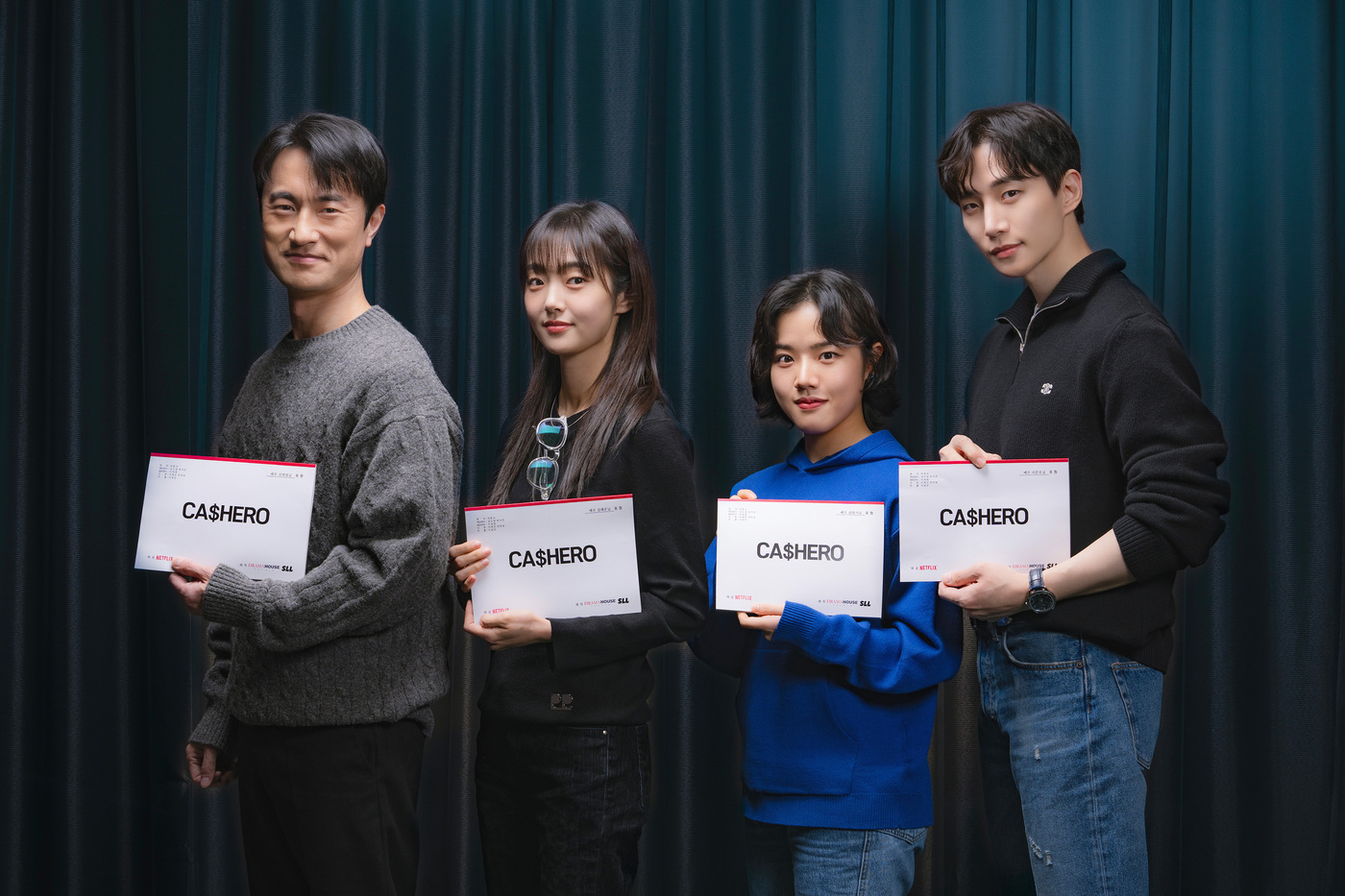
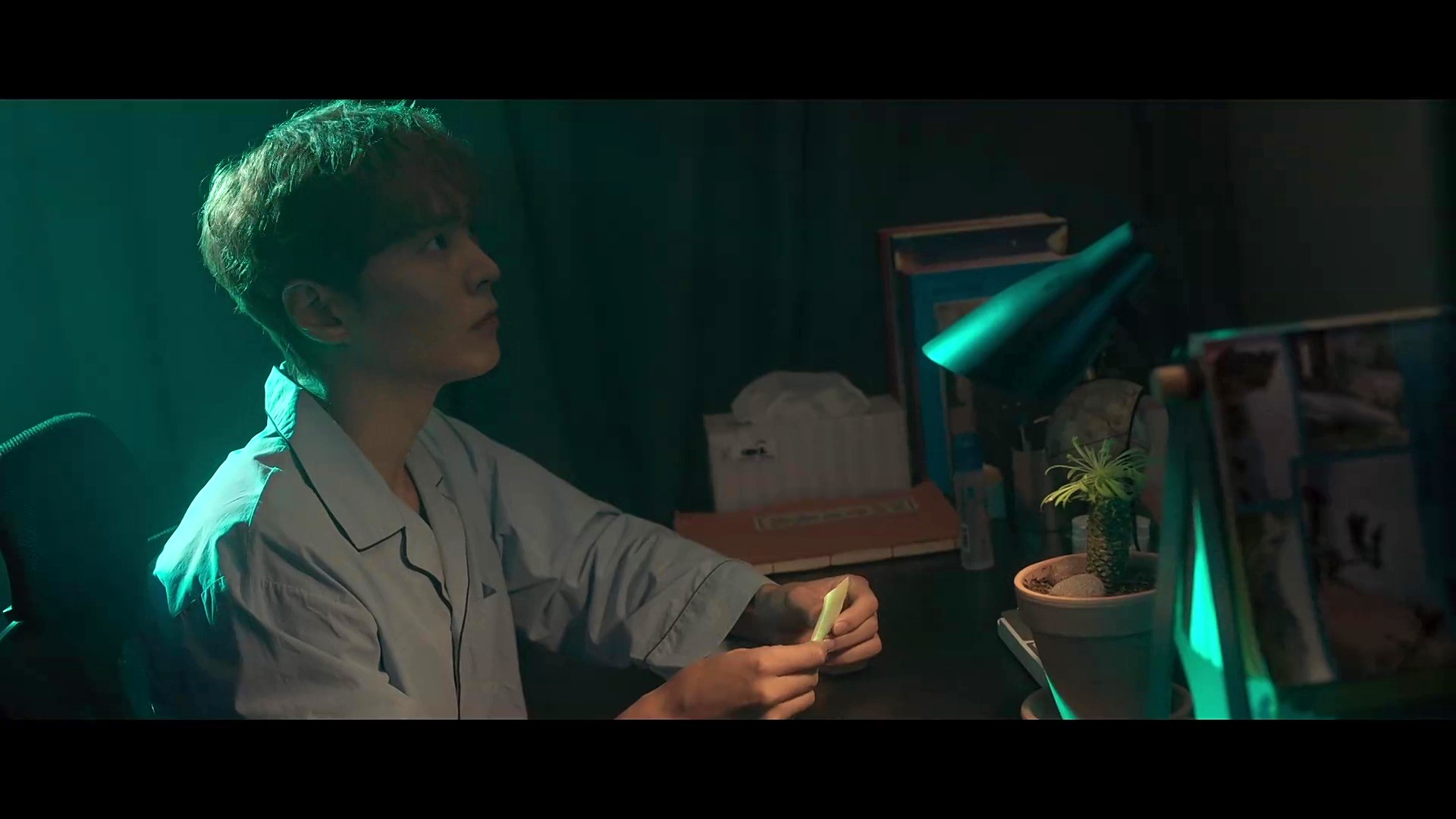
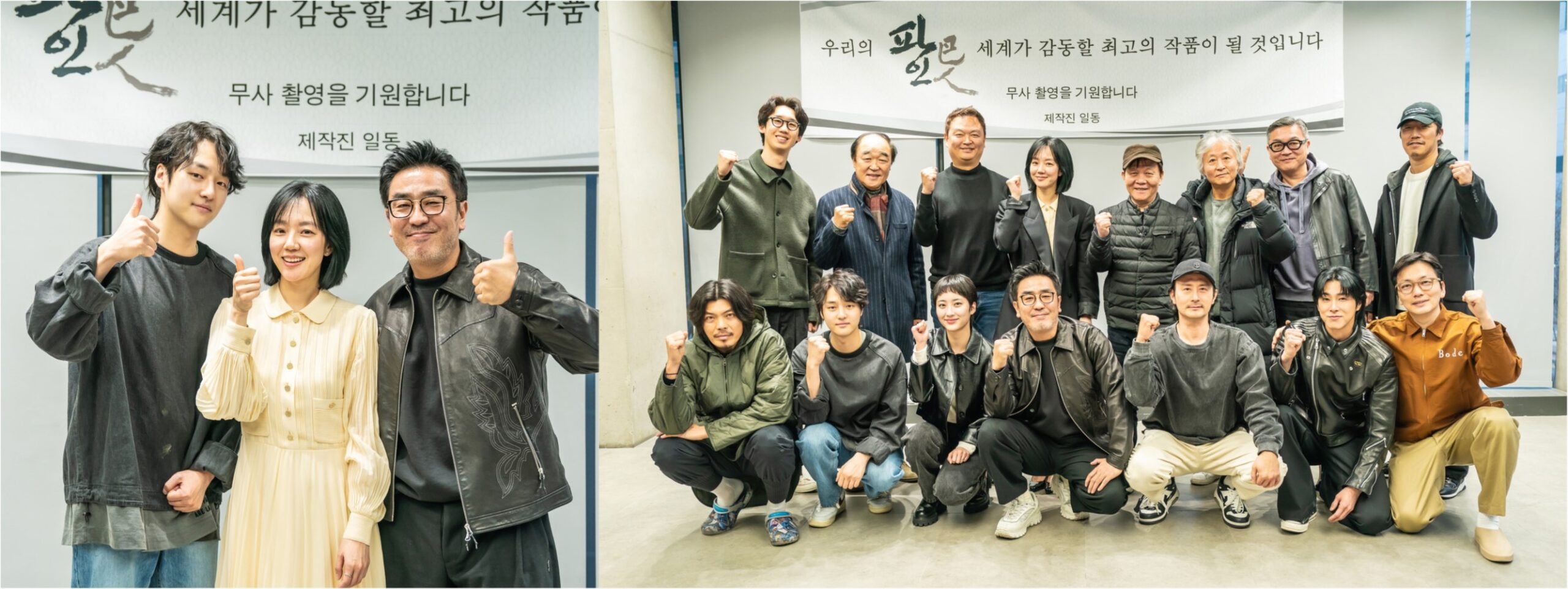
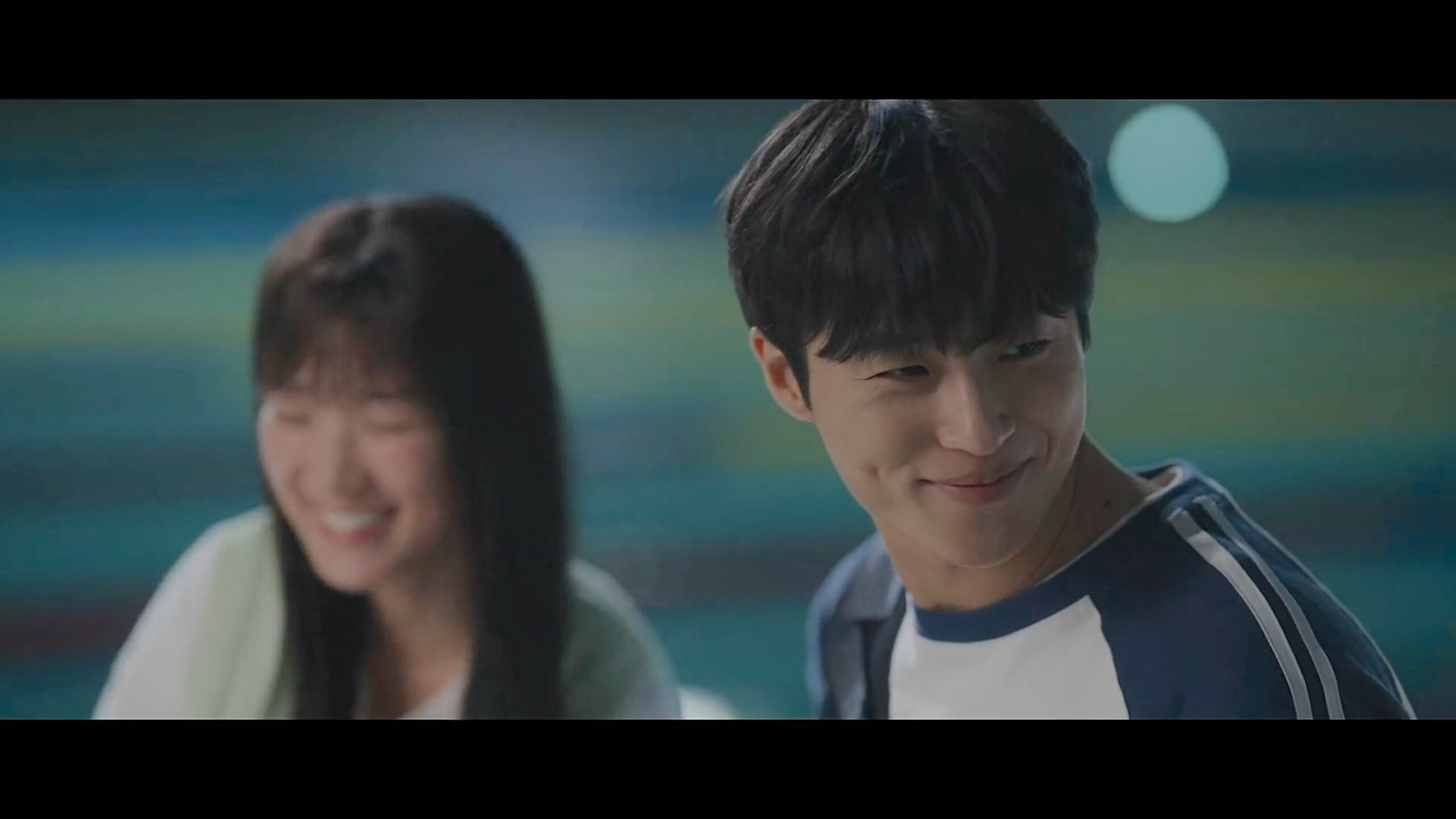
![[Beanie Recs] Dramas about fangirling](http://d263ao8qih4miy.cloudfront.net/wp-content/uploads/2022/05/BeanieRecs.jpg)
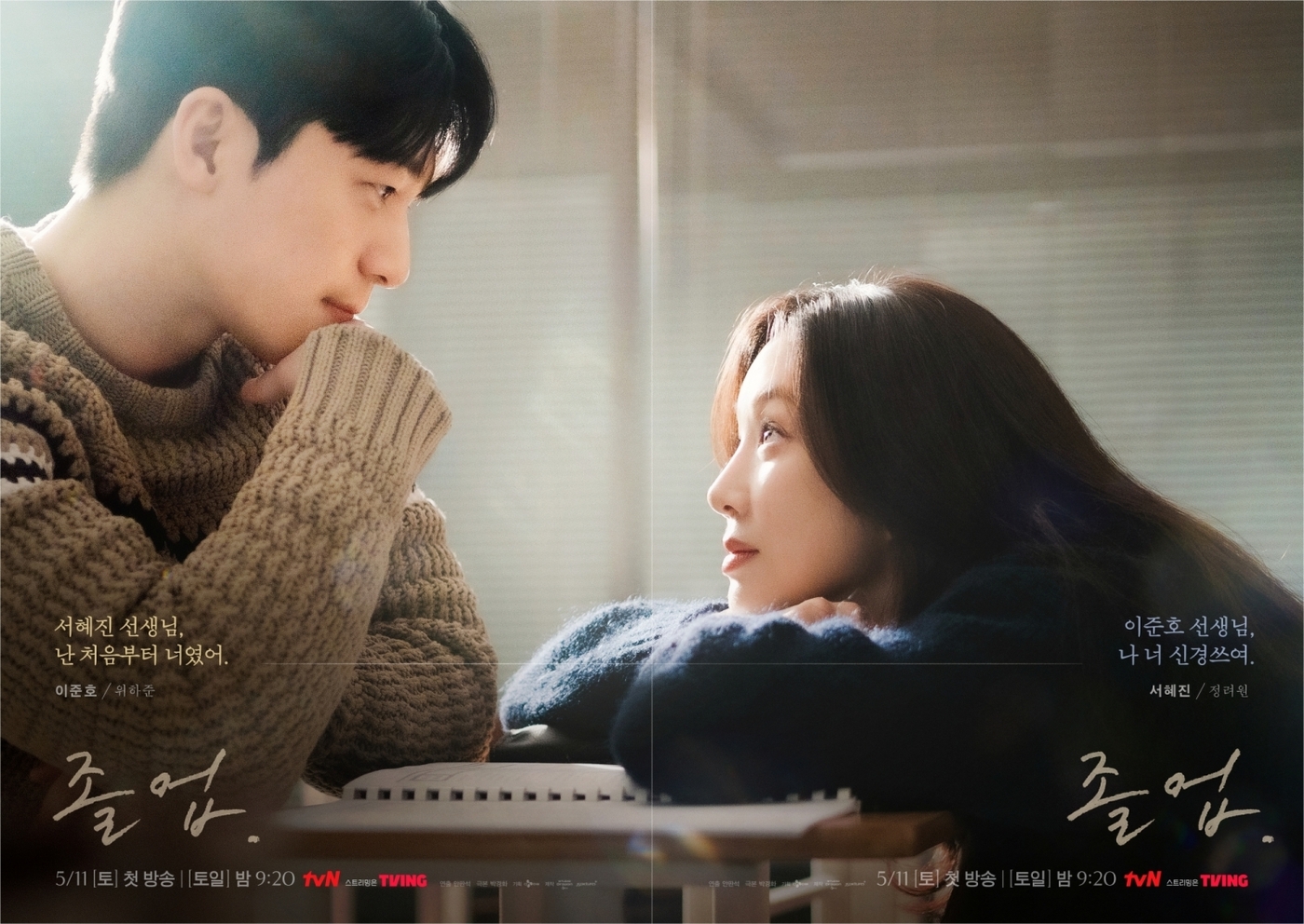
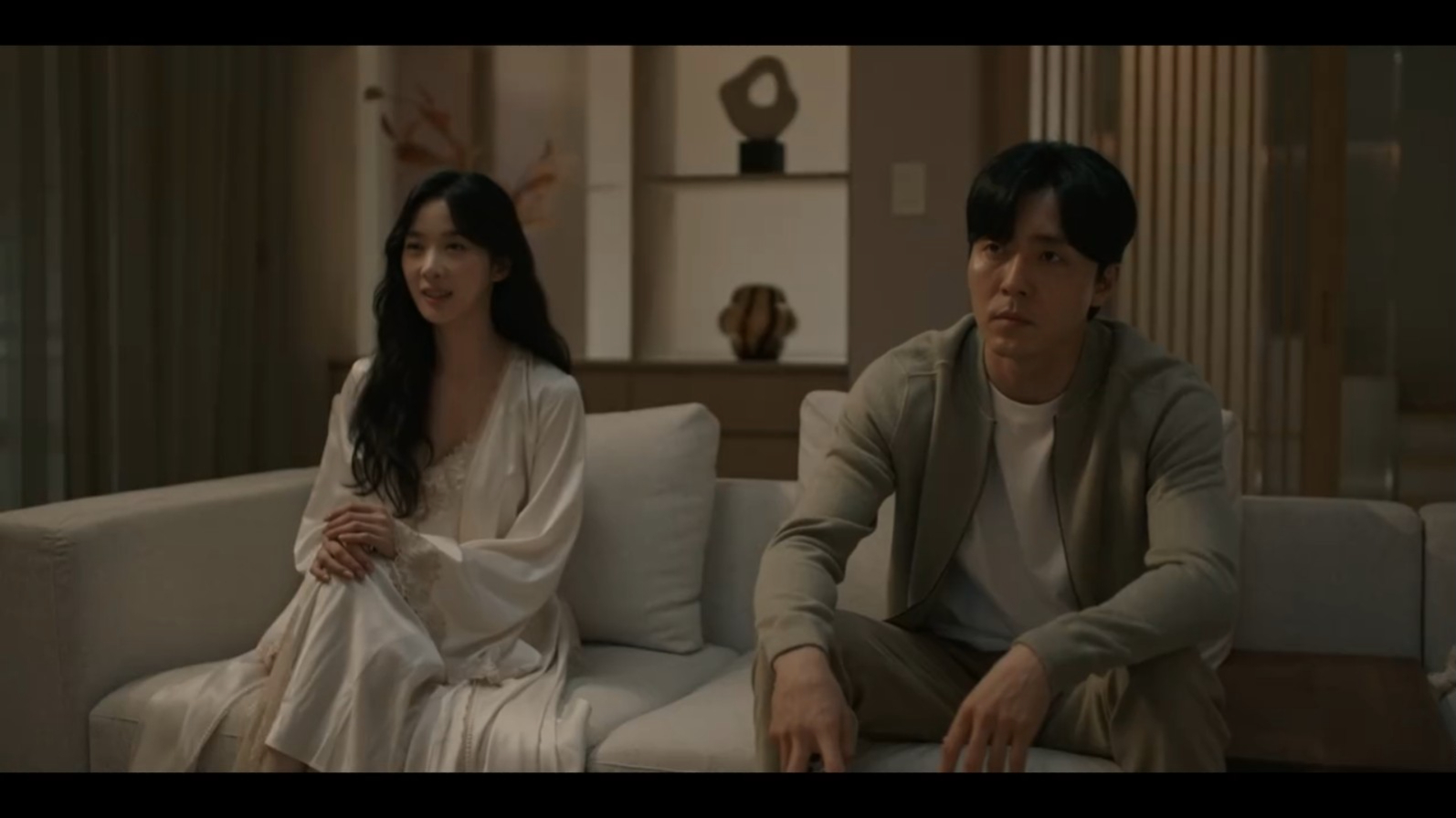
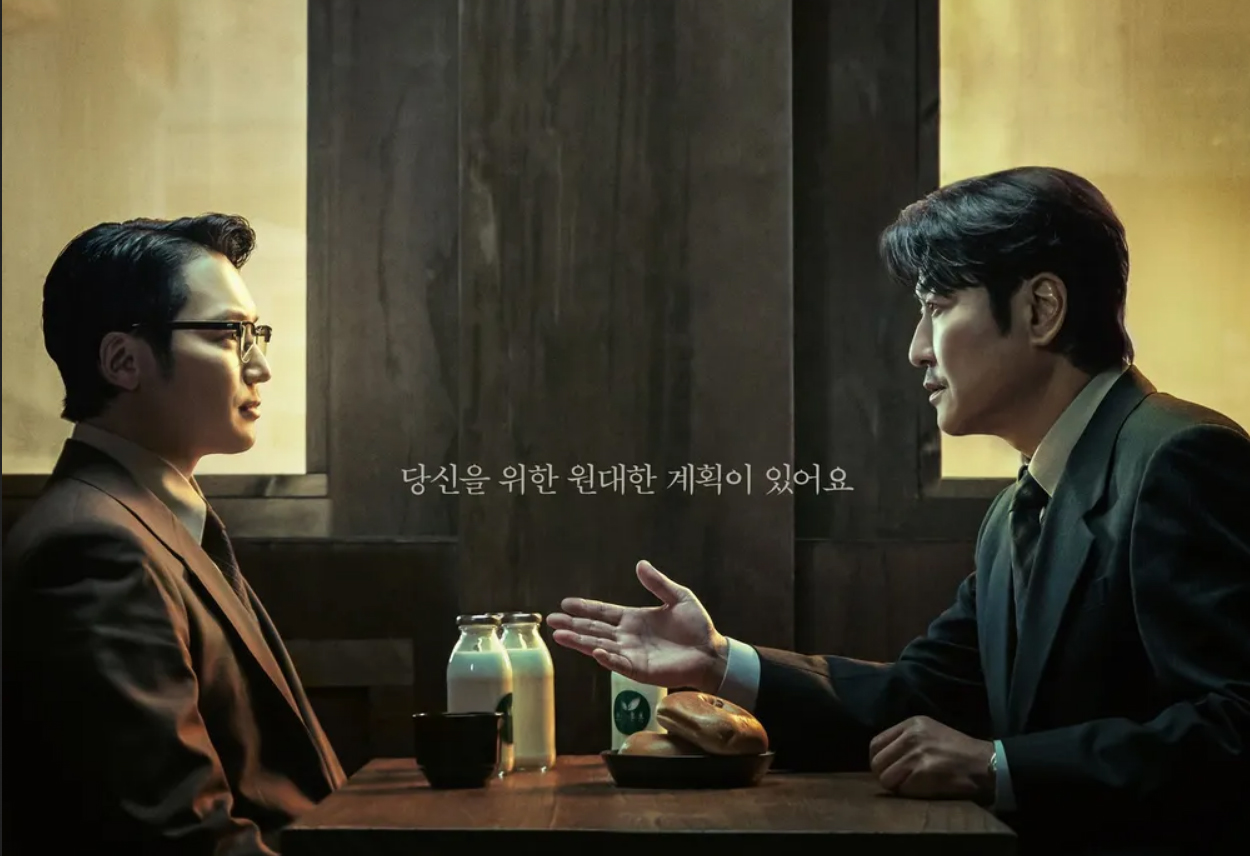
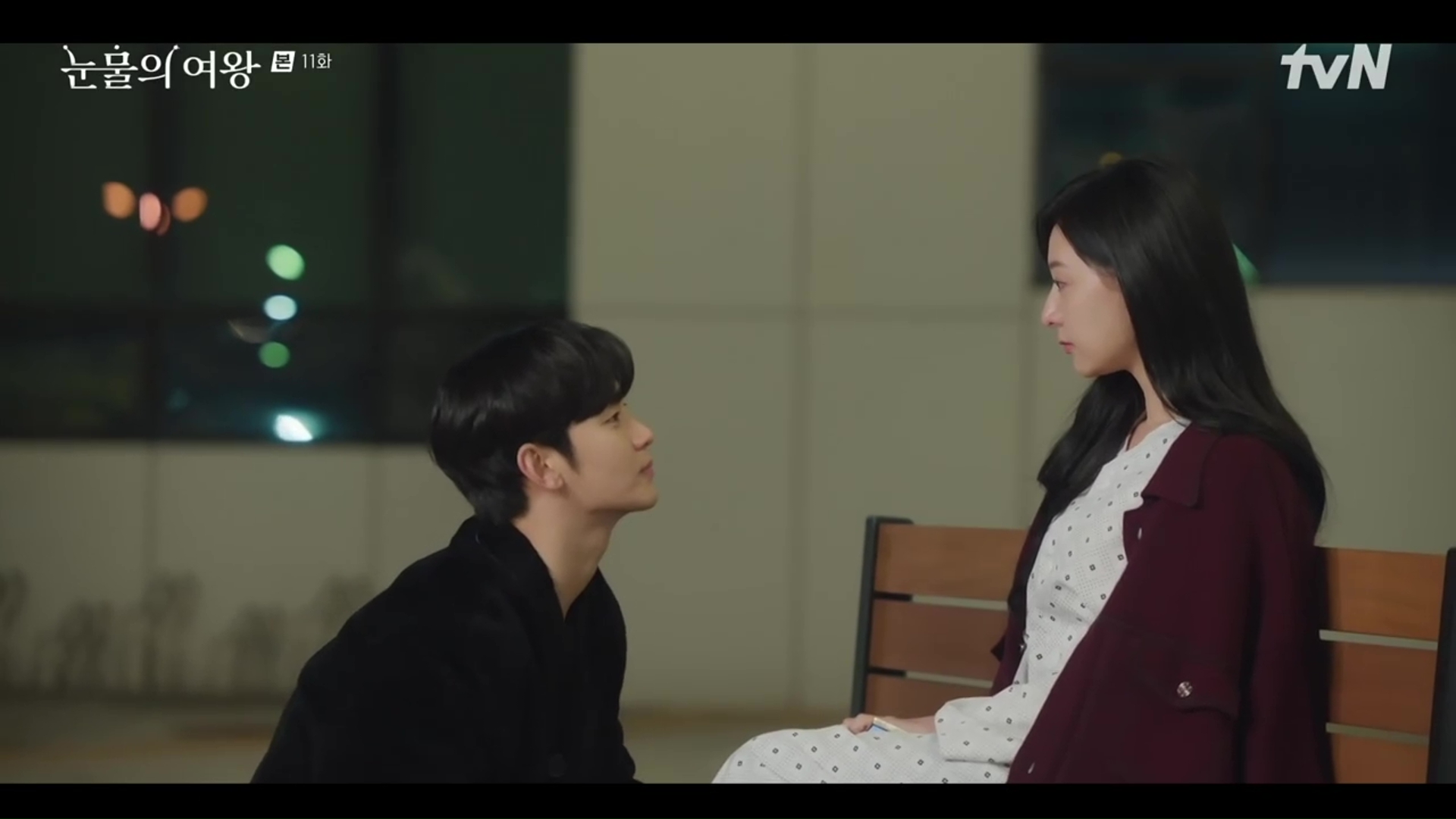
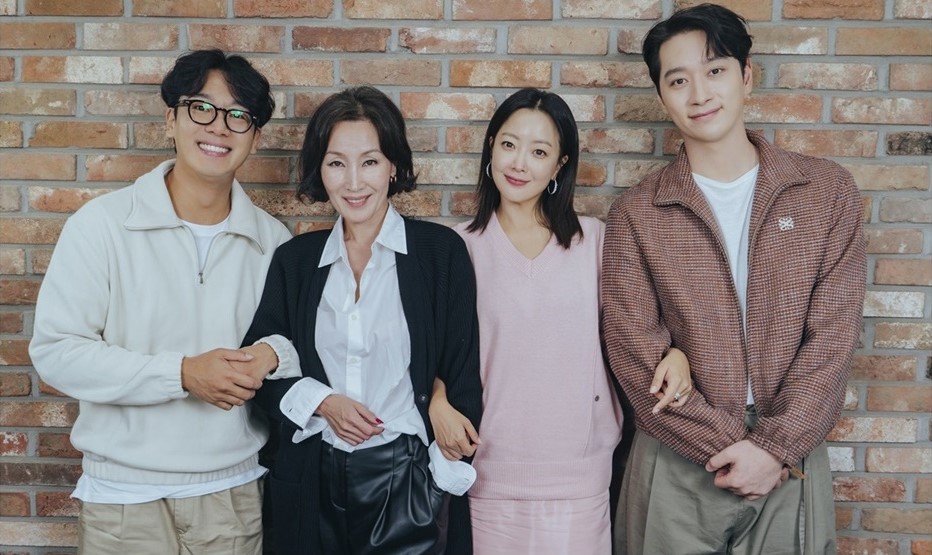
Required fields are marked *
Your email address will not be published. Required fields are marked *
51 april rdc
October 2, 2018 at 6:57 PM
AND that ends our beloved Mr Sunshine. First, I would like to thank you @dramallama for every recap which I’ve looked forward to every week. I’m a silent reader who don’t post comment because I’m actually in the office and hiding the smallest browser possible to read your recaps. ˆˆ Everytime I watched Mr Sunshine, I’m having a hard time understanding some scenes and the context as a whole BUT you’re a great help. Even the comments, I was reading it attentively to check what I’ve missed and to connect with other sunshiners.
Is there other Filipinos here? I’m advance mag-sip so, sepanx much na ko. Ahaha Love you all, and SEE YOU AGAIN.
Required fields are marked *
Mamas Boy
May 20, 2023 at 7:31 AM
Pinoy here. Pareho tayo. I have to check the recaps dahil may scenes na hindi ko naintindihan. Kaya matagal ako manood. Haha! Sepanx din, super. Kahit 24 eps ito, parang ayoko pang matapos. At parang gusto ko pang ituloy ang kwento until the Japs were defeated in 1945 (end of WW2).
Required fields are marked *
52 adieunoire
October 2, 2018 at 8:21 PM
Thank you @dramallama for recapping the drama!
I did not enjoy majority of this drama. It was really slow and draggy, but I enjoyed the last 4 episodes. I feel like this should have been 16 or even 20 episodes, but what’s done is done.
Yoo Yeon Suk and Kim Min Jung were stand outs in this drama. Byun Yo Han was excellent, but I still feel like his character could have been used more. I’m glad he got his place in the rebellion, even in the end.
I spent much of the last 2 episodes in utter disbelief and shock at how many leads died. I wasn’t expecting a happy ending, but I figured at least Hee Sung would have made it! I’m glad it ended the way it did, it’s not like this time period was a happy time. But it left hope for the future and for the Freedom of Korea.
I hope that we see more dramas during this time in the future (and more historically accurate).
Required fields are marked *
53 Dr.Elizabeth
October 2, 2018 at 8:26 PM
Thank you for the recaps. What an emotional roller coaster of a last few episodes! All actors were magnificent! However, I really wanted Dong Mae to somehow live and survive! And still be collecting money from Ae Shin even in his old age. Yep, I'm a fan. Discovered this angst-ridden, tragic, very flawed character, and this brilliant actor in this drama! I still think his chemistry with Ae Shin is off the charts ! There is always that palpable tension between them that borders on animosity, and sexual tension. My opinion! 😀
Overall, I absolutely loved this drama. I don't think there are any dramas that can compare with this one recently! It is far more of a better class than Goblin. Different, and more compelling to watch. The actors brought in their all, with stellar acting all around. No cringe worthy acting by the lead actress in this one! (Yep! Still talking about Goblin. Peace to all. My opinion after all!😚😚)
My other new "discovery" , is the actress who plays Hina! She was amazing! I will check out her other dramas, and will now be looking forward to her future projects.
How wonderful to watch a drama that is worth the Netflix monthly subscription in its elevation of quality, and art! Kudos to the makers!
Cheers! xx
Required fields are marked *
Zora
October 3, 2018 at 3:10 PM
You're not alone.. I think Kim Goo Eun's acting as Eun Tak is cringey (Peace out to all KGE fans!) I mean, she's a good actress..I love her in Coin Locker Girl and Memories of the Sword but man I don't know why I didn't like her acting in Goblin. Try watching "Hina" in Man to Man (it's in Netflix too). It was not that bad but I think that "Hina" was way better than from her character in Man to Man.
Required fields are marked *
lolita
October 5, 2018 at 5:24 PM
Ditto -- I think Yoo In-na would have made the better Goblin Bride...
Required fields are marked *
Iamastonished
October 7, 2018 at 4:38 PM
Fantastic contribution made by the wardrobe, makeup and set dressers. The detail was superb.
Required fields are marked *
54 PakalanaPikake
October 2, 2018 at 11:04 PM
Thank you for your recaps and commentary during the drama expedition known as MR. SUNSHINE. It has been a labor of love, for which I am grateful. You really went the extra mile during this extra-long final episode. Many thanks! ;-)
I especially appreciated your pointer to Scots-Canadian journalist Frederick Arthur McKenzie and the show's recreation of his portrait of the Righteous Army in the field. I've located a couple of his works from 1908 and 1920, and have posted them on my fan wall. His eye-witness accounts are down-to-earth and brimming with detail.
While watching the show, I had been put off by the actor's American-sounding accent, which seemingly did not jibe with McKenzie's position as a correspondent for the Daily Mail of London. I'll admit that I jumped to conclusions about the casting, and could not have been more wrong. He was born in Quebec of Scots ancestry -- no wonder he sounded like a North American and not a Britisher. ;-)
Required fields are marked *
PakalanaPikake
October 3, 2018 at 12:30 AM
My thanks is addressed to @dramallama. Sheesh...
Required fields are marked *
55 Chukahae (축하해)
October 3, 2018 at 3:26 AM
⭐️ First and foremost, thanks @dramallama for recapping this series. Deciding to pick up this show with the knowledge that this will be a 24 parts drama from the start might not be an easy decision. I’m happy that you stick with it through thick and thin. Personally, I enjoyed every moments of it. Part of it because the story about selfless people fighting for the sovereignty of their nation is my kryptonite. Another part is I like that the righteous army story is portrayed through the lenses of individuals that were unlikely to be part of it initially but ultimately made the fight possible in the end. I acknowledge that this kind of show might not be for everyone. So having beanies to share the laughs, happiness and tears (which is a lot) with means a lot.
Required fields are marked *
56 Chukahae (축하해)
October 3, 2018 at 3:28 AM
⭐️ I like that the finale managed to provide satisfying conclusions for many different arcs where each of our characters get their fitting closures.
😢 Lee Yang-hwa dies liberating her hotel from being tainted by the enemies
😢 Hee-sung dies protecting his credibility as a true journalist
😢 Dong-mae dies standing up against those that mocking his group which is his life
😢 Eugene dies aiding the safety of his countrymen despite being the foreigner until the end
☀️ Ae-Shin and the rest of righteous armies which are the hope and the future of Joseon
⭐️ See you again. In our independent country. In Baeksang.
Required fields are marked *
57 farzane
October 3, 2018 at 3:46 AM
I`m still not over how epic and tragic this final was. and how I have mixed feelings of hating the sad ending and loving how it ended.
1. I think Kim Taeri just got the chance to show her awesome acting in these final episodes, remarkably the starting scene in the final. I was moved by how Joseon people guarded her (I usually say I don't like these cheesy scenes but I was all tears as it was so honest and real).
2. never even imagined that Hui-sung`s statement about how he loves useless but pretty things (like his love in first sight for Ae Shin which I couldn't get the deepness the show was trying to convey!) would be used in such an epic way. how this mere ideology got him as far is seeing beauty in sacrifice, in guns, in bruises. I definitely adored him in his last minutes. how humble he was not to even count himself as a fighter, but just someone who knows them.
3. Dong Mae's final moments was just like him during the whole plot, alone, sad, in a bad man disguise, romantic but harsh. they way he was dragged at the end was a sad but real reminder of how lonely and unremembered his death was. he died as a man who nobody knew of his good deeds, who had no one to cry for him, who was too romantic to wear the Japanese swordsman garment, and who had to be a bad guy to survive.
3. with no doubt Eugene`s death was the most impactful moment for me. That was when I started crying loud like I`m losing someone I truly know. he was straightforward and honest all the way. how the scenes built up to that tragedic moment, like them grabbing hands, his teary words, his smile, and boom! how he kept looking at her waiting to be shot (okay I`m in tears again). I think even if it was for this scene only, Lee Byung hun deserves the large payment he got! this was THE BEST TRAGEDIC SCENE I`VE EVER SEEN. It actually hurt time and times more than titanic male lead death. maybe because this was due to a choice, not a naturally disastrous situation.
5. Eugene said that he wonders where their fate lies between glory and sad ending. I would say Hui-sung`s was somewhere in the middle, Eugene`s death was made as glorious sad ending which I will be getting goosebumps and shedding a tear every time I remember it, Dong Mae`s death was simply sad, deeply sad, honestly sad, they didn't make his glorious like Eugene`s, his death tough..like you are not getting goosebumps but an ache in the heart, a realization of his loneliness.
Required fields are marked *
58 farzane
October 3, 2018 at 4:01 AM
the only problem I had with the ending was that was it really necessary to kill all the characters and leave Ae Shin alive? like Hui-sung could live a few more years by pulling some strings. I know the plot was telling us from many episodes before to be curious about the fate of these three men, but the order was not my thing.
also now that I look back trying to conclude each character, making a detailed profile of them in my mind, I notice that Ae Shin`s character was probably the least polished. all I can remember is her patriotic passion and her deep sorrow for her parents. and also his good taste in men :D. I would like to know if you guys have other things on her I may have not noticed. I admire this drama for strong characterization even at the price of slow-moving scenes in the middle episodes. so I want to know if I missed something on her.
Finally, I Loved all the characters exactly at the place they were and
I`m thankful for the flashbacks at the photo and the fishing part. cause it reminded us that Eugene and Ae Shin actually did have a good time together at least. I really envied the essence of their relationship and ship them sooo much.
Required fields are marked *
WishfulToki
October 3, 2018 at 7:24 AM
I agree with you on Ae-Shin, but I think that was the whole point. Others have noted that Ae-Shin is the symbol of Korea (the best of old Joseon and the hope of modern Korea), and I agree. Her patriotic passion burned so fiercely that romance always came second. For her it was also a family tradition: her grandfather, parents and closest servants all fought and died for Joseon. Her home was demolished and plowed through, symbolising also how the motherland was violated when Joseon lost sovereignty. Once Ae-Shin realised that her fight was not for an abstract idea of Joseon but for her closest family and friends (and by extension all of Joseon became her family), there was no stopping her. Eugene realised he was always in second place, but that doesn’t mean Ae-Shin gave up the chance to be with him easily. I think her daydreaming of life in America was very helpful to understand that she really wished for love and happiness, but she gave it up. Her sense of duty would not let her run away. I don’t know if that helps!
Required fields are marked *
Beverly A
October 4, 2018 at 12:34 PM
Best comment here! Thanks!
Required fields are marked *
farzane
October 8, 2018 at 2:21 AM
Thank you for your comment. Totally agree... now that I think about it, yes to make out Ae shin`s character, more than looking at each situation plot showed us, we should look at the whole story. that way we can see what you explained.
Required fields are marked *
farzane
October 8, 2018 at 2:49 AM
and about Ae Shin`s love for Eugene. I mentioned this in a comment in previous episodes. how hard it was for us to accept Ae Shin`s priority. I think many of us kept questioning if she loves him as much as he does. like we expected her to put love first. and I wondered if it would have felt this hard to understand if the roles were swapped like the common epic stories, where there is a man who lives for a greater cause and a woman who supports him by giving up her comfort. we accept this as normal, but we had a hard time understanding Ae Shin. I guess we were just stereotyped: "women should put love first". "Men wouldn`t change their path for love". So leaving the stereotypes behind, I think Ae Shin LOVED him and he was never the second. It was just a matter of choices, she had to walk down a path where he might not be there, even though her wish is the otherwise.
Required fields are marked *
setlib
October 3, 2018 at 7:52 AM
Honestly I think my favorite thing about Ae-sin, what made her seem like a well-rounded character to me, was all her flaws. The show didn't completely put her on a pedestal. Her overconfidence in her English skills (and her total embarrassment when she finally realized what she asked Eugene to do with her); even her sitting in Eugene's chair in the American legation; her shouting "Come Here" in English; her stuffing a huge slice of nectarine in her mouth while meeting with the (concubine?) at the palace; her butchering a piece of cake that little Soomi knows how to cut correctly, etc. Many of these examples reinforce that in some ways she really is "a noble fool who lives in luxury" but of course she's so much more than that.
Required fields are marked *
farzane
October 8, 2018 at 2:28 AM
exactly! I Loved how she was still a noblewoman when she sat at Eugene`s chair. and yes her confidence in English. really loved it all. Thank you for mentioning that
Required fields are marked *
59 farzane
October 3, 2018 at 4:20 AM
oppps, I meant HER taste :D
Required fields are marked *
60 Magalie
October 3, 2018 at 1:48 PM
Thanks for that recap, and for the previous ones that helped me with some cultural points I did not really get.
That last episode was so emotional, too emotional I have to say.. I could not stop crying , even if I knew it wasn't going to end well. Doom had been foreseen in the previous episodes. But seing all those characters dying one after another, what a shock!!! I should have watched it with a break too!
Hee-sung's death really broke my heart and shocked me, first because I did not think he would die, and also because he wasn't a fighter with a weapon, but he had the courage to save his secrets till the end. I really grew found of his character, because he was a noble, he could have married his fiancee long before and have lived the idle life of a rich man, but he had a conscious, was against the idea of an arranged marriage (too bad he fell in love with Ae-shin when he sees her), wasn't happy with his image of a rich boy or with the actions of his family and decided to play his part in saving his country.
Well, I could go on for hours, I really loved the show and can't watch anything too serious for a while now, I've been too emotionally drained with the last two episodes. I just want to finish by saying I have liked the pace of the show. It went with the pace of the love-building between Eugene and Ae-shin, I liked that they took their time. Also, for me, that slow pace is reflective of the "awareness" of the people of Joseon...I mean, at the start most of the people were slaves counting on the nobles to protect the country, being quite passive. Even if,as spectators, we knew the threat of Japan scheming to invade Joseon, the people seem to be oblivious of that, nearly stoic. They even seem to accept being invaded by the Japanese troops at first. But in the two last episodes, you can see that they suddenly realise what's going on, they start to rebel, to join the Righteous Army. That change of pace is like their awakening, the sense of emergency to the situation. Well, that's my perception anyway :)
Required fields are marked *
61 Iamastonished
October 4, 2018 at 6:41 PM
I ask the question: What is Mr. Sunshine trying to evoke?” What does the director Lee Eung-bok want me to experience?” Beyond the plot lines and the romance and the eye candy what are Kim Eun-sook and director Lee Eung-bok conspiring to do. There is a cycle that is going around and around. Loss, sadness, regret, resistance, hope, loss, sadness, regret….. And so on, again and again: it was exhausting. After reading all of the comments submitted by beanies worldwide suddenly a light went on. This is “han,” a word that has no direct translation in English. One literary commentator translated it this way: “In sorrow there is beauty and in beauty there is sorrow.” More sleuthing ensued. This Korean word han is slippery. The Los Angeles Times explored the concept as “intensely personal, yet carried around collectively, a national torch, a badge of suffering tempered by a sense of resiliency.” The theologian Suh Nam-dong described han as "a feeling of unresolved resentment against injustices suffered, a sense of helplessness because of the overwhelming odds against one, a feeling of acute pain in one's guts and bowels, making the whole body writhe and squirm, and an obstinate urge to take revenge and to right the wrong—all these combined”. The author Kim Eun-sook and director Lee Eung-bok displayed endurance as the bedrock. Kim Eun-sook exposes us to one charged encounter after another; be it personal; interpersonal; familial; cultural; religious; or political, straight to the zeitgeist of han. It was a battering so skillfully crafted by Director Lee I was obliged to be in solidarity. Not every author/director team is capable of cajoling me into pain on such a scale. It wasn’t fair: I am ashamed to say they did it with pretty candy, rainbow cake, period coffee cups, beautiful fashions, antique street cars and shiny things. I was so easily had. They moved me as the events moved a perfect cast in the script and it made me uncomfortable. Han is irreconcilable. I was hoping the King would insist that Ae Sin go to San Francisco to raise consciousness about the plight of Korea. She would become a student activist and raise money to buy arms, organize expatriates and conspire with willing Methodists. I thought that white dress and smart hat the King gave her would look great in church but that was a vain hope, a lamentable bitter delusion, a piercing regret, a beautiful sorrow. Han is not for the faint at heart.
Required fields are marked *
Chukahae (축하해)
October 7, 2018 at 5:59 PM
This isn’t a reply to your comment. Sorry for that.
But here I listed the links to the subbed Mr. Sunshine OSTs that you have requested before.
Park Hyo SIn - The Day
https://www.youtube.com/watch?v=b8CQElyv4iQ
Melomance - Good Day
https://www.youtube.com/watch?v=QyoLae2t1_A
Park Won - Stranger
https://www.youtube.com/watch?v=NIoOHWIJ_Z0
Hwang Chi Yeul - How Can I Forget You
https://www.youtube.com/watch?v=FFlGuqAxIdQ
Lee Su Hyeon - Sound
https://www.youtube.com/watch?v=MR6Cu-iHpuU
Baek Ji Young - See You Again
https://www.youtube.com/watch?v=fQKXEgVrn4A
Sejeong - Paramour
https://www.youtube.com/watch?v=XGJLVHHWHos
Nuest W - And I
https://www.youtube.com/watch?v=1FVTr7OSBHY
Ben - If You Were Me
https://www.youtube.com/watch?v=cjesEPF_tDw
Ha Hyun-sang - Becoming the Wind
https://www.youtube.com/watch?v=6d1fmZGVfkQ
Shin Seung Hun - As Beautiful as Fireworks
https://www.youtube.com/watch?v=mzyAegqSdkQ
Kim Yuna - Days Without Tears
https://www.youtube.com/watch?v=QTy16m3ACNY
Elaine - Sad March
https://www.youtube.com/watch?v=rEPMUWHGeaI
Savina & Drones - My Home
https://www.youtube.com/watch?v=qYOUUp1bYc8
O30hn - Shine Your Star
https://www.youtube.com/watch?v=Oagd00ww5Jw
Required fields are marked *
Iamastonished
October 7, 2018 at 8:39 PM
How thoughtful of you. Knowing the lyrics really adds to my appreciation of my favorite scenes. Hear are some beautiful words and pictures for you.❤❤❤
https://www.youtube.com/watch?v=1JGZeMlNToI
Required fields are marked *
Chukahae (축하해)
October 7, 2018 at 8:47 PM
No problem and thank you for the beautiful MV. 😊
Required fields are marked *
Iamastonished
October 7, 2018 at 9:14 PM
My pleasure
Chukahae (축하해)
October 7, 2018 at 8:53 PM
I thought the admin gonna delete that because of the multiple links in a single comment. Hence, the double posts. 😅
Required fields are marked *
stpauligurl
October 7, 2018 at 9:19 PM
Thank you for these links to the words. I loved all the OST but never knew what they were saying.
Then again, I don't really need a translation, because the songs in themselves are filled with so much emotion.
Required fields are marked *
Chukahae (축하해)
October 7, 2018 at 9:22 PM
👍🏻. These osts filled us with all kind of emotions.
Required fields are marked *
stpauligurl
October 8, 2018 at 5:00 AM
They sure do, don't they? When I feel up to it I want to rewatch Mr. Sunshine, but the last weekend I watched drained me so much emotionally that it will take some time before I feel up to it. So I'll listen to the music instead.
Chukahae (축하해)
October 8, 2018 at 5:39 AM
@stpauligurl, Same. I have picked up new shows so I might not able to rewatch it anytime soon. But, I can listen to these osts any day.
Chukahae (축하해)
October 7, 2018 at 6:01 PM
Comment was deleted
Required fields are marked *
Chukahae (축하해)
October 7, 2018 at 6:02 PM
Comment was deleted
Required fields are marked *
Chukahae (축하해)
October 7, 2018 at 6:02 PM
Comment was deleted
Required fields are marked *
Chukahae (축하해)
October 7, 2018 at 6:02 PM
Comment was deleted
Required fields are marked *
Chukahae (축하해)
October 7, 2018 at 6:03 PM
Comment was deleted
Required fields are marked *
Chukahae (축하해)
October 7, 2018 at 6:03 PM
Comment was deleted
Required fields are marked *
Chukahae (축하해)
October 7, 2018 at 6:03 PM
Comment was deleted
Required fields are marked *
Chukahae (축하해)
October 7, 2018 at 6:04 PM
Comment was deleted
Required fields are marked *
Chukahae (축하해)
October 7, 2018 at 6:04 PM
Comment was deleted
Required fields are marked *
Chukahae (축하해)
October 7, 2018 at 6:05 PM
Comment was deleted
Required fields are marked *
Chukahae (축하해)
October 7, 2018 at 6:05 PM
Comment was deleted
Required fields are marked *
Chukahae (축하해)
October 7, 2018 at 6:05 PM
Comment was deleted
Required fields are marked *
Chukahae (축하해)
October 7, 2018 at 6:06 PM
Comment was deleted
Required fields are marked *
Chukahae (축하해)
October 7, 2018 at 6:06 PM
Comment was deleted
Required fields are marked *
Chukahae (축하해)
October 7, 2018 at 6:06 PM
Comment was deleted
Required fields are marked *
Chukahae (축하해)
October 7, 2018 at 6:09 PM
Comment was deleted
Required fields are marked *
62 PakalanaPikake
October 4, 2018 at 8:07 PM
Comment was deleted
Required fields are marked *
63 PakalanaPikake
October 4, 2018 at 11:54 PM
Part 1 of 2
@dramallama inspired me to do some research on Canadian journalist and war correspondent Frederick Arthur McKenzie. His sober eyewitness accounts and photographs of the Japanese suppression of Joseon are searing. At the very least, read the prefaces to both his books. His comments on the persecution of Korean Christians cast a sidelight on the subversive contribution of missionaries like Joseph, and document the nonviolent resistance of many Joseon citizens.
Portrait of 3 members of the Righteous Army in “An Outpost of Korean Rebels” on facing page 172 of The Tragedy of Korea (1908). Frederick Arthur McKenzie photographed them in 1907.
https://books.google.com/books?id=Q4wsAQAAIAAJ&pg=PA172-IA1#v=onepage&q&f=false
“Journalism in Korea: A Group of Sub-Editors” on facing page 220 of the same book. They look like dead ringers for Il-sik and Choon-sik.
https://books.google.com/books?id=Q4wsAQAAIAAJ&pg=PA220-IA1#v=onepage&q&f=false
Google Books scans of The Tragedy of Korea by Frederick Arthur McKenzie (1908 London edition).
Note: HathiTrust.org offers both scans I selected. IMHO, the user interface is better organized for navigating the document than is Google Books's. Both services provide search capability. I did not have to set up an account to read online at either site. I do not know whether Beanies outside the USA are able to access these services.
Harvard University copy, reddish cover. This scan includes only 21 of 27 photographs. There are no links to them from the contents pages. You can access them from the thumbnail view.
https://books.google.com/books?id=aUgpAAAAYAAJ&source=gbs_navlinks_s
https://babel.hathitrust.org/cgi/pt?id=hvd.32044011345303;view=1up;seq=9
University of California at Berkeley copy, black or dark-greenish cover. This scan contains all 27 photographs and is inscribed by the author.
https://books.google.com/books?id=Q4wsAQAAIAAJ&printsec=frontcover#v=onepage&q&f=false
https://babel.hathitrust.org/cgi/pt?id=uc1.b3234380;view=1up;seq=6
The Tragedy of Korea (1908), has been translated into both Korean (as 대한제국의비극 = Taehan Cheguk ŭi pigŭk) and Japanese (as 朝鮮の悲劇 = Chōsen no higeki). This is the book that contains the photograph of the Righteous Army (Eui-pyung) that @dramallama included in her recap. There are 27 photographic portraits of Korean civilians, Joseon and Japanese soldiers, palace guards, Korean prisoners, villages burned to the ground, ruined city walls, and McKenzie's lead "boy" and his family, among other subjects.
Beanies who read Korean and Japanese can find the bibliographic information here -- and use WorldCat.org to locate libraries who hold those translations, as well as electronic editions:
http://www.dramabeans.com/members/pakalanapikake/activity/617590/
- Continued -
Required fields are marked *
PakalanaPikake
October 4, 2018 at 11:55 PM
Part 2 of 2
In the preface to his follow-up volume after the uprising of 1919, Korea Fights for Freedom (1920), McKenzie states that The Tragedy of Korea was translated into Chinese. Whether the translation survived China's own turbulent history is another question. Alas, this later work has no illustrations. Various electronic editions of it are available. The following are available free of charge:
Korea's Fight for Freedom by F. A. McKenzie; scanned by Google Books; original from University of Illinois at Urbana-Champaign (dark green or black cover)
bibliographic record: https://catalog.hathitrust.org/Record/100411222
https://babel.hathitrust.org/cgi/pt?id=uiug.30112074979599;view=2up;seq=16
https://books.google.com/books?id=rUhEAQAAMAAJ
Another copy; original from University of California at Berkeley (red cover). Has a good table of contents but incomplete navigation links that are still better than those of the other full copies.
https://books.google.com/books?id=tbpFAAAAIAAJ&pg=PA13&source=gbs_selected_pages&cad=2#v=onepage&q&f=false
-30-
Required fields are marked *
Iamastonished
October 5, 2018 at 4:59 AM
Wow PakalanaPikake !! What an excellent post. I will follow up on your links. You are really something. Here have some rainbow cake. https://www.youtube.com/watch?v=vBvo7RVSEvk
Required fields are marked *
PakalanaPikake
October 5, 2018 at 2:18 PM
You're most welcome, @iamastonished! Thank you for the rainbow cake. ;-)
Required fields are marked *
Iamastonished
October 5, 2018 at 9:24 AM
Fantastic primary source. Thank you for your attention to detail
Required fields are marked *
PakalanaPikake
October 5, 2018 at 2:23 PM
You're welcome, @iamastonished. I became a little bonkers while researching, which is why it has taken a while to post it. But wait, there's more... ;-)
Required fields are marked *
Ally
December 29, 2018 at 6:44 AM
I skimmed the preface of the latter copy and he really attributed the Koreans sense of nationality and uprising to having been converted to Christianity which is really interesting. That the western ideas of fighting for ones freedom infiltrated Korea through religion. The Jews know a thing of two about losing their own country and being slaves to another as well. Also that the Japanese tried to quell the rebellion by persecuting the Christians. This is something not even touched on in the kdrama, but gives me a sense of understanding how and why Christianity is so prevalent even now in Korea. Thanks for the links! You are always a treasure trove of information. Thank you for your time and research!
Required fields are marked *
PakalanaPikake
December 30, 2018 at 2:08 AM
Part 1 of 2
You're most welcome, @ally-le! I'm glad to learn that those posts were useful to you. I expected that Christianity was appealing to the downtrodden masses of Joseon because it viewed commoners, butchers, and other low-borns as children of God and the equals of the higher classes that had treated them so badly for millennia. It wasn't illiterates who sought out Christianity, but Confucian scholars who themselves walked the talk, which I find immensely uplifting.
Re: Japanese persecution of Korean Christians. It doesn't come as a surprise, considering how Japanese Christians were mercilessly persecuted. Here's some background:
Why Japan Wants Its Past Persecution of Christians to Be World Renowned
A dozen “hidden Christian” sites on verge of gaining UNESCO World Heritage status.
https://www.christianitytoday.com/news/2018/may/japan-unesco-hidden-christian-persecution-world-heritage.html
As you will see in the links below that I posted on the revenge drama MAWANG / THE LUCIFER, I found interesting connections between the intense social pressure to conform that creates wangtta (outcasts), and the intense desire for Christianity that led Joseon scholars to seek out Jesuit missionaries in China to bring the Gospels back with them, to request missionaries, and to send their own sons to study for the priesthood in Macau.
A year ago, a couple of months after MR. SUNSHINE's finale, I was asked to comment on symbolism in ep. 18 of MAWANG. (Thanks to @linda-palapala for introducing me to this show! I didn't know I could appreciate a revenge drama so much.) I ended up doing some research on the Joseon martyrs because one of the filming locations was a church with a large portrait of several priests, including Europeans:
http://www.dramabeans.com/2007/04/devil-mawang-wave-of-japanese-support/#comment-3159220
- Continued -
Required fields are marked *
PakalanaPikake
December 30, 2018 at 3:00 AM
Oops -- Although it seems as if MR. SUNSHINE aired ages ago, the finale was only in late September of this year. Sheesh! So I actually watched MAWANG 7 months before MR. SUNSHINE. Man, have I slipped my clutch. This is what I get for live-watching too many Kdramas simultaneously. ;-)
The background material on the persecution of Christians in Joseon was already in the back of my mind at the time MR. SUNSHINE aired.
PakalanaPikake
December 30, 2018 at 2:09 AM
@ally-le Ally:
Part 2 of 2
A later discussion with @Tom on wangtta (outcasts) in MAWANG is germane to an inkling that arose in the back of my mind as to the appeal of Christianity in Joseon; it begins here:
http://www.dramabeans.com/2007/04/devil-mawang-wave-of-japanese-support/comment-page-2/#comment-3178117
and continues here:
http://www.dramabeans.com/2007/04/devil-mawang-wave-of-japanese-support/comment-page-2/#comment-3178688
and here:
http://www.dramabeans.com/2007/04/devil-mawang-wave-of-japanese-support/comment-page-2/#comment-3178919:
[emphasis added]
That leads into my research findings on the appeal of Christianity in Joseon. They also relate to the role of the American Protestant missionary Joseph in MR. SUNSHINE, although I didn't explicitly say so at the time:
http://www.dramabeans.com/2007/04/devil-mawang-wave-of-japanese-support/comment-page-2/#comment-3178920
http://www.dramabeans.com/2007/04/devil-mawang-wave-of-japanese-support/comment-page-2/#comment-3178962
http://www.dramabeans.com/2007/04/devil-mawang-wave-of-japanese-support/comment-page-2/#comment-3178963
I think all of these entries cast illuminating sidelight on the introduction of Christianity to Korea. What strikes me as most noteworthy is the fact that Joseon citizens thirsted for The Word and invited Catholic missionaries to come to the Land of Morning Calm. Four thousand Korean Christians awaited the arrival of the first ordained missionary from China in 1784. Christianity was not imposed from outside, but was sought out and brought home by scholars and shared with people of all social classes.
The following article goes into great detail on the official arrival of Protestant Christianity from America in 1885. It also cites the involvement of Korean Christians in resistance to Japan's subjugation of Joseon. – Enjoy. ;-)
Who Brought the Gospel to Korea? Koreans Did.
https://www.christianitytoday...
Required fields are marked *
PakalanaPikake
December 30, 2018 at 2:15 AM
Oops! Sorry about that, @ally-le Ally! One more time, with feeling:
Who Brought the Gospel to Korea? Koreans Did.
https://www.christianitytoday.com/history/2018/february/korean-christianity.html
-30-
Required fields are marked *
SadKDramaLama
June 29, 2019 at 7:39 PM
@pakalanapikake
Sending you some love for such amazing post.
If I was organising a Beanie coffee soiree you would so be at the top.
Required fields are marked *
PakalanaPikake
June 30, 2019 at 1:06 AM
@SadKDramaLama,
Aw, shucks. Thanks so much for letting me know the information was useful. ;-)
FYI, on my fan wall, I've posted some historical information on Tenyukyo, the Society of Heavenly Salvation for the Oppressed mentioned in NOKDU FLOWER, which deals with the Donghak Rebellion of 1894. Dong-mae in MR. SUNSHINE was involved in a similar organization.
http://www.dramabeans.com/members/pakalanapikake/activity/815356/
Required fields are marked *
PakalanaPikake
October 5, 2018 at 2:29 PM
I got the feeling that Writer-nim consulted one or both of F. A. McKenzie's works, especially after I read some of his eyewitness accounts of his travels across the Korean countryside and saw the accompanying photos.
Linguistic note: transitive verb "outrage" and “outraging” used in reference to women = rape.
In The Tragedy of Korea, the author includes his earlier eyewitness accounts of the country's subjugation under martial law from his travels in 1906 and again in 1907 in chapter X. The Beginning of the New Era. Joseon's institutionalized corruption and predation of its own citizens served as the springboard to even greater oppression by the Japanese.
https://books.google.com/books?id=Q4wsAQAAIAAJ&pg=PA108#v=onepage&q&f=false
He has some interesting things to say about the stringent ban on opium in Japan and formerly in Joseon. Japanese thugs were later allowed to sell the drug all over the peninsula. It casts an interesting sidelight on Dong-mae's use of the narcotic painkiller after his return from Manchuria. See page 114.
McKenzie notes that even staunch apologists for the Japanese admitted the harshness of Japan's subjugation of the Korean populace by main force as well as the settlement of tens of thousands of Japanese colonizers (50,000-60,000, according to pro-Japanese American journalist George Kennan). See the lengthy reprint on pages 122-129 of Kennan's detailed accounts of Japanese maltreatment of Korea and its citizens. Kennan mentions the American Minister Allen who was assassinated in San Francisco in 1908. McKenzie's prefatory comments begin with the final paragraph on page 121.
https://books.google.com/books?id=Q4wsAQAAIAAJ&pg=PA121#v=onepage&q&f=false
These chapters pull no punches:
V. The Murder of the Queen
VI. After the Murder
XV. A Journey to the “Righteous Army”
XVI. The Strong Hand of Japan
XVII. The Ruins of Chee-Chong
XVIII. With the Rebels
XIX. The Suppression of Foreign Criticism (censorship of the domestic press; control of mail and telecommunications)
Background on George Kennan, a much older cousin of American diplomat and historian George F. Kennan. He made his name as a specialist in Russian affairs, particularly in the Far East, starting with his surveying job for a telegraph line in Siberia in 1864:
https://en.wikipedia.org/wiki/George_Kennan_(explorer)
Required fields are marked *
Iamastonished
October 5, 2018 at 4:02 PM
Well done.
Required fields are marked *
Iamastonished
October 6, 2018 at 11:55 AM
I found a used bookseller that has a reprint from India in english. I'm buying a copy. I'm a book person.
https://www.abebooks.com/servlet/SearchResults?cm_sp=sort-_-SRP-_-Results&sortby=2&tn=The+Tragedy+of+Korea
Required fields are marked *
PakalanaPikake
October 6, 2018 at 2:31 PM
I'm an older book person who needs to cut her eyes a break, so I resort to scalable PDFs nowadays. But I've chased down my share of out-of-print works over the years, too. My favorite search tool for digging up OOP books is addall dot com. They are a search engine of antiquarian booksellers worldwide, and I've been thrilled to find many obscure works through them -- more than a few of which were from ABE vendors.
I'm glad you found a copy. Enjoy!!
Required fields are marked *
64 Tasmia
October 5, 2018 at 12:54 PM
Anybody know the name of the actress that played the seamstress that wanted to marry Hui Seong? She isn't listed on wikipedia or any of the other places I checked.
Required fields are marked *
Iamastonished
October 5, 2018 at 3:07 PM
There are no small parts. She was a lovely addition.
Required fields are marked *
Tasmia
October 6, 2018 at 11:14 AM
I know! It's a shame that they didn't list her name.
Required fields are marked *
Iamastonished
October 6, 2018 at 11:30 AM
Hopefully Kim Eun-sook will work her into her next screenplay. I really liked the Japanese geisha who created distraction during the great escape of Jung Moon. Both of them have very expressive eyes.
Required fields are marked *
Tasmia
October 7, 2018 at 8:49 AM
The actress that played the geisha(So-a) is Oh Ah-Yeon. I loved her performance. I noticed how much more confident and ruthless she became while rescuing Jung Moon. Ae Shin was right about the possibility of the geisha becoming a rebel.
Makanramen
December 9, 2018 at 4:35 PM
I think it's Jung Min-ah (정민아). https://www.hancinema.net/korean_Jeong_Min-ah.php
Required fields are marked *
PakalanaPikake
April 7, 2019 at 5:41 AM
I was astounded to see that Im Se-mi played Dong-mae's mother. I didn't recognize her at all. She was great.
ISM played a truly obnoxious chaebol heiress in ABOUT TIME and a pickpocket in TWO COPS. My favorite role of hers is the young queen in THE KING'S DAUGHTER, SU BAEK HYANG. She was terrific in the role. I'd love to see her in another sageuk. ASDAL CHRONICLES, perhaps? Or the MR. SUNSHINE-era MUNG BEAN FLOWER with TWO COPS co-star Jo Jung-seok?
Required fields are marked *
65 panshel
October 6, 2018 at 10:43 PM
I LOST it when the pawn shop owners (who I'm so thankful are alive) put Hee Sung's pocket watch next to Dong Mae's sword next to Yang Hwa's fencing sabre next to Eun San's pottery next to Eugene and Ae Shin's apothecary cabinet. It was reminiscent of yesterday's montage of the Righteous Army comrades who sacrificed their lives (Ae Shin's parents, Seung Gu's father, Hong Pa, Seung Gu, and Yang Hwa).
Eugene's
had me BAWLING. How Joon Young didn't break down in the middle of the train is beyond me. So they didn't get busted by the little boy speaking Korean but by Joon Young not knowing how to speak Japanese? Jin Guk, the rickshaw puller, speaks Japanese, but he was locked in the cab, holding the conductor at gunpoint.
I know people found the ending disappointing, but I found Eugene's sacrifice beautiful. It would have been such a cop-out if Eugene and Ae Shin lived happily ever after. This is not that drama. Could Eugene have shot the coupler in Ae Shin's train car? But without him blocking the train door, the Japanese soldiers could have jumped back to her train car. Why did Eugene let go of the hostage? Because he couldn't have shot the coupler while holding onto the baron. The gun sparks in the dark tunnel were haunting.
Dong Mae's death was anticlimactic, especially because they faked us out twice before. It's not that I expected him to fight for the Righteous Army (he would never), but Dong Mae deserved to go out in a blaze of glory. Obviously, Dong Mae only loved Ae Shin, but I wished he would have thought of Yang Hwa at least once as he died. I cried when Ae Shin arrived to pay him after waiting for her all night.
I am bitter they killed Hee Sung off within two minutes. I always thought Hee Sung would be the first to die because every time they showed him on-screen, there would be a gunshot: Grandfather's 49 days funeral (Episode 19), taking photos of the massacre (Episode 23), his arrest (Episode 24). Not to mention, his propensity to run toward gunshots to "help" Eugene (Episode 14) and save Dong Mae (Episode 17). Hee Sung's death would have made more of an impact had he been shot.
I was drowning in tears when Ae Shin begged Haman-daek not to die, then when the Joseon people shielded Aegi-ssi and collapsed as soon as the Japanese soldiers retreated. No matter how terrified they were to die, they were willing to die to protect her. The only reason Commander Hasegawa did not kill them is because Stella is American. When they announced Kim Min Jae would make a cameo in the finale, I predicted he would be grown-up Domi. I broke down during the flashback of Eugene telling young Domi, "This is your fight."
Kim Eun Sook's trademark is the humor in her dramas, and our bromance had no shortage of it. Hee Sung was the glue that held our trio together, despite Eugene and Dong Mae...
Required fields are marked *
panshel
October 6, 2018 at 10:44 PM
(cont.)
Hee Sung was the glue that held our trio together, despite Eugene and Dong Mae threatening to kill him every day. "Can you slice a flower petal exactly in half?" "I can slice nari in half. Horizontally or vertically?" I will always love when Eugene revealed to Ae Shin he was a slave, he asked, "Can butchers live?" first as a nod to Dong Mae. Once Dong Mae found out the truth from Hee Sung's servant, he commiserated with Eugene by inviting him to eat together. I adored how Hee Sung and Eugene called each "304호" and "303호."
My favorite literary device of all time is full circle, and Kim Eun Sook is a master of it. Seemingly throwaway lines earlier in the show have come full circle in the finale.
Mr. Sunshine is a life drama. I can't move on. Forever thanks for every recap, @dramallama!
Required fields are marked *
WishfulToki
October 7, 2018 at 8:03 PM
It wasn't perfect, but the more I reflect on the drama and rewatch bits of it, the more I appreciate it. Tiny things. For example: if you watch the way the bodies of Ae-Shin's servants are positioned when they die (aerial shot), they look like the Korean flag. As if that wasn't enough, the lantern at their feet is red and blue, with a flickering light. The final episodes are chock full of symbolism about Korea... I just wish Dong-Mae had more of an actual role in the story. I've been racking my brains, and the only way it makes sense is that he is the tragic anti-hero, the one who had similar origins as Eugene and, indeed, as lowly potters and blacksmiths, but he chose to use his sword against his fellow Joseon people, and therefore died by the sword.
I can't get over Hee Sung's death. It was cruel cruel to see the person who loved beauty and flowers die the most horrible inglorious death. And were his photographs ever found? *sob*
Required fields are marked *
66 _mplo_
October 6, 2018 at 10:51 PM
As much as I felt that the show was unnecessarily drawn out, I'm sad to see it end (which is why I put off watching the finale until yesterday). The last few episodes were brilliantly executed and the ending was fitting. As is expected from a show about the war, there are no happy endings to look forward to. I too felt that Eugene's death was unnecessary, but that was a choice he made. Overall, kudos to the whole production team. Stellar cast, brilliant acting, superb directing and beautiful cinematography. I'll be looking forward to the next KES and LEB collaboration.
Required fields are marked *
Iamastonished
October 7, 2018 at 3:57 PM
Yes, yes, yes except about it being to long. It had to be long to show the unrelenting determination of the Righteous Army. The director has got to say what the director wants to say. BTW Great post.
Required fields are marked *
67 chousaurus
October 7, 2018 at 3:42 PM
lol tbh i have to admit i didnt shed a tear when eugene died. they tried to make it so dramatic, but i didnt really feel it...couldnt he have stayed on the other train and shot the bullet to separate the two trains then?
his death seemed the less sacrificial, i was more moved by dong mae and hee sung's death lol
and i felt myself crying more so when the translator was announcing the deaths of all the righteous army soldiers to the king lol
Required fields are marked *
68 germangirl
October 10, 2018 at 12:51 AM
So, yesterday I was able to watch the last two episodes.
It was my first k-drama and I liked it. Not all - but mostly.
I wanna share some thoughts - first in general:
The actors were really fabalous (I only knew Lee Byung Hun), the cinematography was mostly breathtaking.
Sometimes the music was not my cup of tea, but I have to admit, that I don't like scores which are telling me what to feel - especially when the actors and the atmosphere is that expressive and would go much more deeper without the supersentimentally and schamltzy music on top (but some instrumental pieces where on spot and really beautiful).
Usually I disconnect at these moments with the play on screne.
The same proplem I had with some camerashots - especially in the first half of the show - wonderful moments and faces were shown in different perspectives, but sometimes the shot was to long or they repeated it to often - and I disconnected once again.
Maybe its because I'm not used to that kind of storytelling.
The decor, clothes, makeup, the hole setting was wonderful and really eyecandy.
What I have to criticize: there where some flaws in the timeline (for example the counting of Dong Mae - he is counting ten days and on the 15th of the month Ae-Shin is not coming but at the end of the month, which are usually 14 to 15 days - well maybe it was the translation, that it was wrong counting).
I was watching the original language with german subtitles - and I don't speak any bits of Korean - but I avoid dubbing mostly, because the original voices of the actors and actresses are more expressive - even if I don't speak the language.
My thoughts about the leading characters and actors:
- Lee Byung Hun was surprising me in the best way - I knew him only from American movies and well, it was so nice to see him filling a leading role. His character was well written and his performance was really appropriate - stoic sometimes, soft layered.
In my headcanon the little Eugene found acceptance and love from his mother and during his time in USA (Joseph and later Kyle) - this shaped his resilient personality and made him possible to really make decisions.
- Byun Yo-Han as Kim Hee-Sung was a flower that growed :-)
I liked his character promptly, but for me the storytelling took to long to fill his personality with all that fine lines and cracks he had. What a waste of a character in the beginning and I agree on that point with the reviewer. His ending was shattering but consistent - and a perfect arc to the ending of Eugenes father. And I liked it very much, that he stood to his ideals.
- Kim Tae Ri did a very good job and she is a fabulous actress - but I have to admit, that I didn't get the point why all three men are falling for Ae-shin in the first place. I needed time for letting her character in to my view. I missed some layers in the beginning - but that is more of my personal viewpoint that visible beauty is not enough to really love somebody.
- and...
Required fields are marked *
69 germangirl
October 10, 2018 at 12:54 AM
- and that is why I was really hit by Jang-Hwa/ Hina. Her character was so layered, interesting and booooom Kim Min-Jung is so beautiful and expressive. The hole show I wanted to see more of her backstory. She was my favourite character - and in my headcanon a very struggled soul with a strong will to survive. Her death was sad - but it was good that I spoilered myself - so I could process it better and it was not devastating my experience of the rest of the show.
- and last but not least my new crush: Yoo Yeon-Seok. What a perfomance! In the Making of he seems to be a lighthearted person, but in character he really showed all the different layers of that little traumatized but surviving Butcher-Boy. Goo Dong Mae was with Hina Kudo the most thrilling character to me. In contrast to Eugene he never really worshipped hiself worthy. He was stuck with the idea that only the love of Ae-Shin would heal his wounds and give him and his live value. Even in his last moments he was (in the translation) calling himself a looser.
Required fields are marked *
germangirl
October 10, 2018 at 12:57 AM
and sorry, my comment was to long, the rest was gone with the internet.
So, I would write a lot more, but the real life is calling ;-)
Maybe later.
Required fields are marked *
PakalanaPikake
April 7, 2019 at 6:28 AM
Thanks for your comments. Many of them resonate with me.
I, too, prefer to watch Kdramas with subtitles so I can hear the actors speaking in Korean and expressing their feelings, which come through. ;-)
FYI, if you haven't already seen it, there's an interesting older Kdrama called DER YALU FLIEßT / AMNOK RIVER FLOWS (2009, 3 episodes). [Amnok ("duck green" river, as noted in REBEL: THIEF WHO STOLE THE PEOPLE -- so-called because of the many mandarin ducks with teal-green feathers) is the Korean name for the Yalu River, which separates present-day North Korea from China.]
https://wiki.d-addicts.com/Amnok_River_Flows
For some odd reason, it is not listed in AsianWiki.
The drama is based on an autobiographical novel, Der Yalu fließt (Yalu River Flows), written by Lee Mi Reuk, an exiled Confucian scholar born in Joseon circa 1900. He had to leave Korea after the Japanese takeover, and eventually found his way to Weimar Germany. He studied medicine there, but was not cut out to be a doctor. He became a professor of Oriental philosophy. His translations of Confucian literature provided inspiration and ethical support to the White Rose and other groups and individuals who opposed the National Socialists. It is a very inspiring story. I was thrilled to recognize the siblings Hans and Sophie Scholl among the conscientious objectors who were inspired by Dr. Li's translations. He survived the war, but did not live to return to his homeland after it was liberated.
Required fields are marked *
70 Ambie
October 12, 2018 at 6:00 PM
The last episode of had me so upset. We never got to see them show any type of affection. How it ended was horrible. I felt like the writers just gave us the biggest finger and said screw you all!! Literally once the” disappointment ” happen I cut it off. I’m going to say disappointment because I don’t want to be the person that spoils the ending. But if you’re hoping to see any type of kiss, hug or hand-holding or type of mushy love romance y’all are about to be very very very very very disappointed. we have been waiting for this big build-up of some type of romance and let me tell you.. give up on it now ,because you’re not going to get it… The suspense that they build up for us will be destroyed, they will burn it down to the ground and leave you behind all the ashes.
Required fields are marked *
Earl W. Vanderpoort
May 14, 2020 at 10:07 AM
You are so right on!
Required fields are marked *
71 Monysoth
October 13, 2018 at 7:41 PM
It is so beautiful and, at the same time, it has broken my heart !!! A tragic love story I will never forget it, Eugene Choi.
Thank you very much for being keep such a beautiful story alive for all of us.
Kind regard.
Required fields are marked *
72 Linda
October 27, 2018 at 5:09 PM
I loved it. I thought the pacing was perfect. Have watched it three times and always pick up something I missed. What was the white cloth tied on Dong Mae's sword in his final battle?
Required fields are marked *
beantown
November 3, 2018 at 7:06 AM
My guess is that's its the material Ae shin used to bandage his arm back in Tokyo. She was (always) his inspiration.
Required fields are marked *
73 Makanramen
December 14, 2018 at 10:48 PM
I was half expecting a flashback during the train shootout. Ae-Shin shoots like her mother (both with a Mauser C96 pistol).
Required fields are marked *
74 Ally
December 28, 2018 at 9:59 PM
I’ve finally finished, as I promised, before the end of 2018. Lee Byung-hyun was amazing this last episode. I finally connected with his character and the last scenes after his death were more affecting than the 23 episodes prior. Better late than never. I have a greater appreciation of Korea’s struggle for independence having watched this, so I think that is a win in and of itself. What I’m left with is also appreciation for the work and beauty of the kdrama. I agree that this dragged (a lot)in the middle, and had I not forced myself to take a break, knowing I’d come back to it, I would have just dropped this one. Luckily, I came back just in time and I’m glad I did. These last 4 episodes were just stunning, albeit highly depressing. But I was left with the hope of an independent future and it did feel like a suitable conclusion to where we had been. I can’t say that for most kdramas.
Required fields are marked *
PakalanaPikake
April 7, 2019 at 10:57 AM
Part 1 of 2
@ally-le, cc: @marcusnyc20, @panshel
I'm finally seeing your closing comments now. Brava! My sentiments exactly. I was initially leery of watching MR. SUNSHINE because the history itself is so painfully depressing -- much like that of my ancestral homelands, Ireland and Scotland. I expected the show to be visually stunning, but was afraid that it would be an epic spectacle, yet ultimately feel hollow despite all the Sturm und Drang. Those fears were unfounded.
Looking back on it now after letting it settle for 6 months, I'm glad I watched MR. SUNSHINE. It prompted me to research late Joseon history, which will come in handy when MUNG BEAN FLOWER with Jo Jung-seok and Yoon Si-yoon premieres on April 26. As with REBEL, the glimpses of myriad minor characters formed a mosaic that provided an engaging backdrop for the arcs of the main characters. In weaving them together, Writer-nim created sweeping, starkly-beautiful continuity that conveyed how all levels of Joseon society were affected by the traitorous powermongering of those at the top.
I was often frustrated by Ae-shin's character traits, but now can see that she truly was following in the footsteps of her parents. In reflecting on the drama special AMNOK RIVER FLOWS, I’ve come to see her as a warrior of conscience, and a spiritual sister of the real-life Sophie Scholl.
The Japanese colonization of Joseon triggered the former Hermit Kingdom to disgorge its long-hidden scholars in the form of political exiles and patriots on the lam. See my reply http://www.dramabeans.com/2018/10/mr-sunshine-episode-24-final/comment-page-2/#comment-3440409 to @germangirl in thread #69 above regarding AMNOK RIVER FLOWS. I think you would enjoy it as a sidelight to MR. SUNSHINE. It deals with exiled Joseon native Li Eui-kyeong, a Confucian scholar whose translations into German under the pen name Mi-reuk (Maitreya) inspired resistors against the Nazis, which I found to be remarkable and uplifting. When I studied German in high school, the sibling college students Hans and Sophie Scholl, who appear in the drama, were mentioned in our text books as members of the White Rose.
The White Rose started out as a refreshingly ecumenical group of friends. One member identified as Buddhist, and another was the son of a nominally-Catholic scholar of Eastern thought. Several were medical students at the University of Munich who had been dispatched as army medics to the Eastern Front. They attended lectures by Kurt Huber, professor of psychology and music. Huber was a friend and supporter of Li Mi-reuk. Knock me over with a feather.
Much of the information on the White Rose’s resistance activities was contained in trial records held in Russian and later, East German, archives after the war.
https://en.wikipedia.org/wiki/Mirok_Li
https://en.wikipedia.org/wiki/White_Rose; see separate entries for Hans Scholl, Sophie Scholl, Kurt Huber, et al.
- Continued -
Required fields are marked *
PakalanaPikake
April 7, 2019 at 10:58 AM
Part 2 of 2
@panshel, apropos of your comment above on MR. SUNSHINE's coming full circle, your favorite literary device:
Like the early Jesuit missionaries to China who introduced Joseon scholars to Christianity, Li Mi-reuk returned the favor and became a Confucian missionary of sorts during a dark period in European history. Dare I say that, in addition to Confucianism and non-violent resistance, he also carried a spark of Korea's long tradition of righteous armies to fortify the beleaguered German psyche during its darkest hour? I like to think so.
-30-
Required fields are marked *
75 Deva
February 4, 2019 at 5:51 AM
I saw many korean drama but mr sunshine is the greatest and bestever i never seen before like drama and a true and passionate love story and live fir there motherland
Required fields are marked *
76 giorgia
February 19, 2019 at 1:54 PM
Yes, I'm late to add to this thread. I finally finished this amazing drama today, February 19, 2019.
Since AeShin flew over the rooftops in her male garbed bad-ass asset mode, I was totally invested in her character development. What a marvellous series. Each episode was sublime. All the music scores are hauntingly great. Gives the goosebumps (in a good way) I hope I can get a hold of the soundtrack of this series. Am ignorant of the USA/KOREA/JAPAN/EURO connections, after this series, will definitely do some research.
I rooted for ALL the leads, and no less all the amazing colourful characters who were supporting the leads: servants, storekeepers, translators, freedom fighters ...
Cried so much on the last final episodes. But, what a ride. This series is a definitely a re-watchable series - if only to revisit Eugene, AeShine- sweet, sweet courtship. The Samurai, Phantom Editor, Hotel Owner ... these characters have captured a piece of my heart.
I do not speak or understand Korean - many thanks to the subtitles. I was able to follow the dialogue. Still, it was the acting chops of all actors in this project that make me marvel at the story-telling.
This finale completely sealed it for me. Although, I strongly suspected that the writer will not give a happy-ever-after to Eugene and AeShin - I was hoping I was wrong. That final scene of Eugene, with AeShin screaming his name did me in.
See You, Again - Mr Sunshine!
Required fields are marked *
PakalanaPikake
April 7, 2019 at 11:25 AM
@giorgia,
I think you might enjoy AMNOK RIVER FLOWS, a 3-episode drama based on Confucian scholar Li Mi-reuk's autobiographical novel. Think of it as MR. SUNSHINE goes to Weimar Germany and resists the Nazis. (See above.)
Required fields are marked *
77 Snow Flower
May 26, 2019 at 9:49 AM
Watching it for the third time. It reminds me of the great 19th century novels, like Les Miserables and War and Peace. Truly unforgettable...
Required fields are marked *
78 VIn
May 31, 2019 at 7:09 AM
I wish role of Eugene was played by someone younger or someone with better ability to act emotion. There is no chemistry between Ae-sin and Eugene and Lee Byung He appears out of place and wooden in most scenes. His laughter is so artificial and Ae-sin looks fit to be his daughter than love interest !!!!
Required fields are marked *
79 Taliloa
August 21, 2019 at 4:37 AM
I am late in watching this, having only recently discovered Korean tv dramas, but was just as shaken up by the final episodes. I knew the men were all going to die having served their roles as Ae Shin’s protectors, but I still hoped at least one would survive! The way the last scene played out for Eugene could have ended in so many ways with him surviving....shoved the bad guy on to other carriage and then shot the coupling with him on the right carriage...grabbing a gun from enemy soldiers and then he would have more than one bullet!...last scene could have had him as an American/Joseon man observing the future of Joseon with Ae Shin and her remnant army. That would have left me feeling more hopeful.
And besides that the way he died was so unsatisfactory. He deserved a better ending.
Poor Hee Sung too. He lived such a charmed life. That brutal beating scene was almost like he was paying for his Grandpa’s many crimes. His life counted for nothing as he was beaten by an unknown soldier. I almost hoped he would live to tell the stories to another generation of all the unsung heroes he had known.
I finished watching it today so I will be an emotional wreck for next few days especially as I will download the haunting songs.
Required fields are marked *
Earl W. Vanderpoort
May 14, 2020 at 9:45 AM
Ditto for me you captured my thoughts about those issues. Still shattered!
Required fields are marked *
80 javinne
January 15, 2020 at 10:43 AM
I cried my eyes out with this story.
I cried so much! After months on hold, I watched the last episodes in these last ten days, and they made me cry a lot.
It made me wonder and desire to learn about Korean history.
Very well done until the end, wow..
Required fields are marked *
81 Mrs. Sunshine
May 5, 2020 at 12:53 PM
This is by far one of the best K Drama I’ve ever seen! Not your common romcom or modern every day K Drama but that is why I love it! There’s real substance and beauty in every episode! Very touching and moving that this show has lived within me for days and days even after the show was over for me which was very unexpected!!!
Required fields are marked *
82 Earl W. Vanderpoort
May 14, 2020 at 8:17 AM
I concur with most, that this was a great epic film. I appreciated the history lesson of struggles for freedom for a great country like South Korea that I was ignorant of. The acting, cinematography, directing all top notch. With the accolades aside, my emotional experience was a crushing aftermath. I lost all feelings for Ae-shin as I saw her main goal and love in life was trying to prove she wasn't the spoiled aristocrat that Dong-mae dubbed her. She seemed to finally achieve true happiness and joy as a mentor long after the demise of the trio that helped her achieve that goal. Towards the end of the series when she was looking really pleased with herself and smiling for becoming a master declaring these were the best of times really chaffed me! My only interest in her was what happiness she was able to give to Eugene. I was totally invested and loved those scenes, but that's what so destroyed me knowing Eugene died for such pitiful crumbs of her so called love. After a self imposed separation from Eugene that didn't really didn't have to occur, she used him to get to Japan initially getting his hopes up by saying let's got to the United States together! All's fair in love and war? Is this what patriots do? The end justifies the means? I guess I'm just being too naïve. She definitely held a spell over people even myself who harbors a real hatred for her (I guess I just contradicted myself when I said earlier I had lost all feelings for her) can't get her physical beauty out of my head and repeatedly being aghast of the audacity of her using the three men and actually a lot of other people even the old man and women that raised her who all loved her deeply, yet her having very little lasting guilt or remorse . I don't remember where in the series this line is from "My comrades are waiting for me," after a heartfelt confession from Eugene made me want to smash the TV screen! Really you wanted to chew the fat with your comrades (by the way I despise the word comrades because of her) rather than indulge the man you supposedly love? Seems like she was always rushing their meetings to get back to her COMRADES, but even her oh so BELOVED and RESPECTED leader Kap Su-kim took unrushed times to get on a drunk or have long conversations with Eugene without this pressing need to return to Righteous Army! Her best memories of Eugene were the one's she projected of what their life could have been rather then time actually spent together. Self serving? Oh by the way let me get this off my chest; how is it Eugene had such a hard time leaving the U.S. embassy almost losing his life with all those crazy swordsman and yet the prime target of those swordsman Ae-shin are no where to be found when she is shown merely looking around a desolate street and easily slipping into a collaborators hideout? Fate has it's favorites? Oh another Ae-shin irritant she IS NOT a better shot than Eugene! What an unfounded narcistic display of arrogance! That was not...
Required fields are marked *
Earl W. Vanderpoort
May 14, 2020 at 9:36 AM
continuation for Earl W. Vanderpoort: That was not only Ae-shin's problem, but all of the Righteous Army and sympathizers not in trusting Eugene because they considered him a FOREIGNOR! They could have benefited from his military and war knowledge to plan much more effective raids with a lot less loss of life. I'm glad he was buried in the FOREIGN Cemetery! Lee Yang-hwa you have my heart, Kim Hee-sung I raise a glass of Soju to you, Goo Dong-mae I bow and prostrate myself before you, Eugene I salute you Devil Dog and you're my guy! To the patriots who resurrected Korea grudgingly including Ae-shin you have my upmost respect, I commend you and am in utter awe of you!
Required fields are marked *
83 Earl W. Vanderpoort
May 14, 2020 at 8:49 AM
Continuation: That was not only her problem, but all the Righteous Army and sympathizers who viewed Eugene as not one to be trusted and a FOREIGNER! They so could have used his military knowledge to more effective raids with a lot less loss of life rather than their pathetic civilian strategies. I'm glad he was buried in the FOREIGN Cemetery! Lee Yang-hwa you have my heart, Kim Hee-sung I raise a glass of Soju to you, Soo Dong-mae I bow and lay prostate before you, Eugene I salute you Devil Dog, you're my guy! The heroes and patriots that resurrected Korea and grudgingly Ae-shin included I commend you and am in total awe of you!
Required fields are marked *
84 Earl W. Vanderpoort
May 14, 2020 at 9:15 AM
Continuation for Earl W. Vanderpoort: That wasn't only Ae-shin's problem, but all the Righteous Army and sympathizers which didn't trust Eugene because they considered him a FOREIGNOR! They could have really benefited from his military knowledge and planned much more effective raids with a lot less loss of life. I'm glad he was buried in the FOREIGN Cemetery! Lee Yang-hwa you took my heart, Kim Hee-sung I raise a glass of Soju to you, Goo Dong-mae I bow and lay prostrate before you, Eugene I salute you Devil Dog, you're my guy! For all the patriots hw resurrected Korea grudgingly including Ae-hin you have my upmost respect, I commend and am in complete awe of you!
Required fields are marked *
85 Earl W. Vanderpoort
May 14, 2020 at 10:24 AM
I'm sorry I became impatient not seeing my continuations and reentered from memory several times. Also most importantly THANK YOU! THANK YOU! Dramabeans for your recaps, without them I would have missed tons more of the ideas and intents of the makers.
Required fields are marked *
86 Paok
July 9, 2020 at 7:09 PM
Bolches yarboclos
Sad ending 😭🤧
Required fields are marked *
87 Jethro Delgado
October 27, 2020 at 5:52 PM
Loveeeedd the series! Does anyone know what the soundtrack played during Gu Dongmae's second to the last scene was? Its so good and so hard to find.. I dont think it was released along with the other OST's. It starts around 30 mins into episode 24 when Gu Dongmae's scene starts.. Thanks!
Required fields are marked *
88 Thea Foo
April 16, 2022 at 11:36 AM
I have what may sound like a really weird question...I haven't watched the final episode yet but from what I've seen online do y'all think Ae Sin was upset of Eugene's death? I feel like she kinda just forgot about Eugene after a while?? It's like she just moved on and pretended he was just nobody in her life?? Thoughts??
Required fields are marked *
89 Mamas Boy
May 20, 2023 at 7:19 AM
I had to watch the finale in several installments because of the heartache and suspense in its scenes. It’s heartbreaking to watch DONG-MAE’s body being dragged. And more heartbreaking to watch EUN-SAN and his men stare helplessly at death. And then there’s HEE-SUNG. How could they torture him like that?? My heart!!!
And EUGENE’s sacrifice. Wow. That was cinematic – but really painful to watch. Huhu.
All three suffered super bloody deaths. My knees are wobbly now.
And makes me want to read up on that era of Korean history.
Required fields are marked *